Citigroup’s chief accounting officer and controller on how curiosity and constructive criticism enhanced his career P41
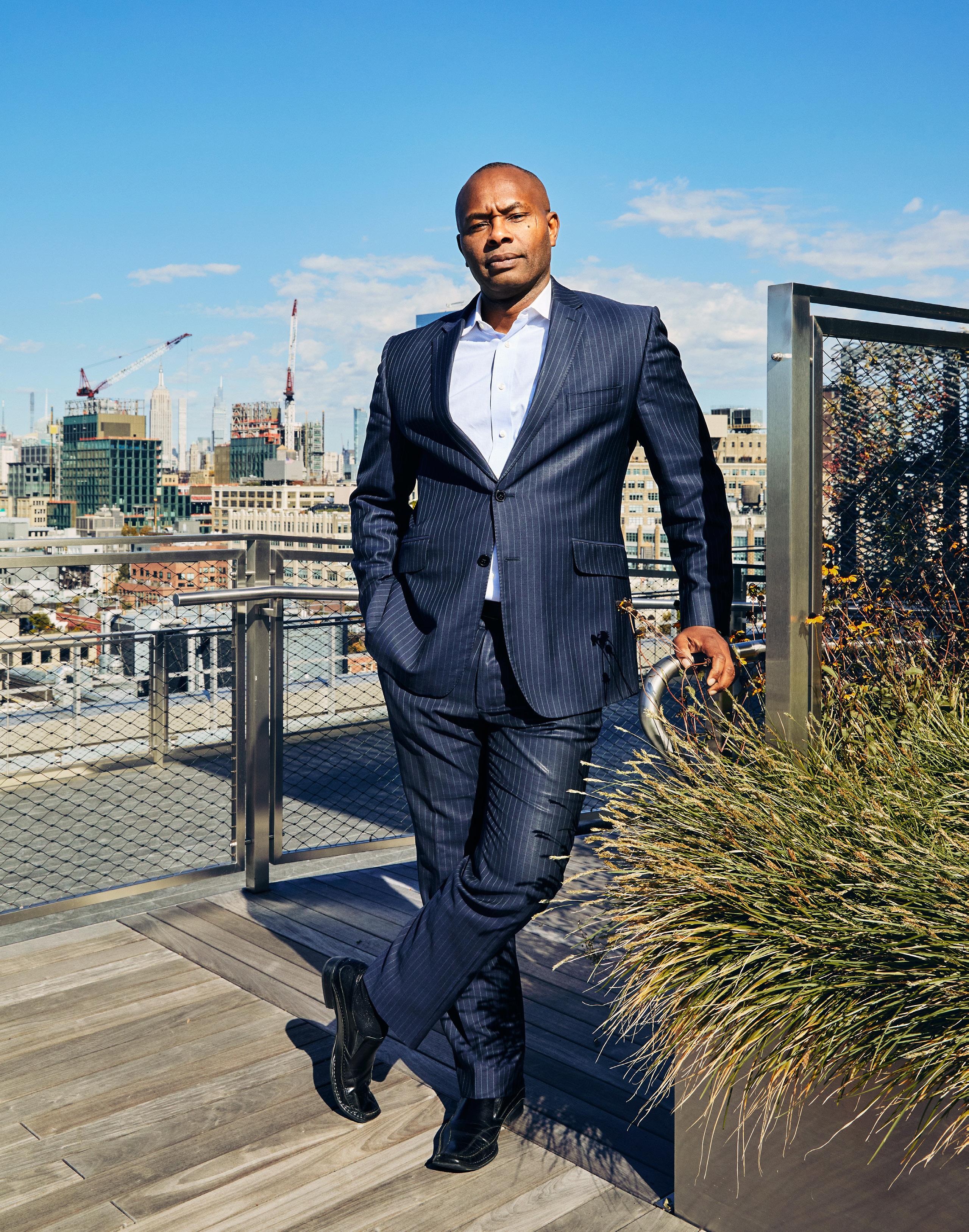
Finance Issue


Mary Dickerson, Radian Group P38 Johnbull Okpara, Citigroup P41 Endré Jarraux Walls, Customers Bank P47 Stephen Kincaid, Walker & Dunlop P51 Finance Issue
achieve financial innovation and ensure cybersecurity, four executives
that
people profilemagazine.com 3 PROFILE Q2/23
To
agree
it starts with your
In Every Issue
Editor’s Letter P7
Index P115
P100
Transforming the Table
TPG Partners Anilu Vazquez-Ubarri, Maya Chorengel, Julie Hong Clayton, and Katherine Wood on culture as a differentiator
P9
Bring it Home
Jim Cochrane brings his childhood dreams of working with the Texas Rangers to life, generating the revenue to build the best roster in the American League
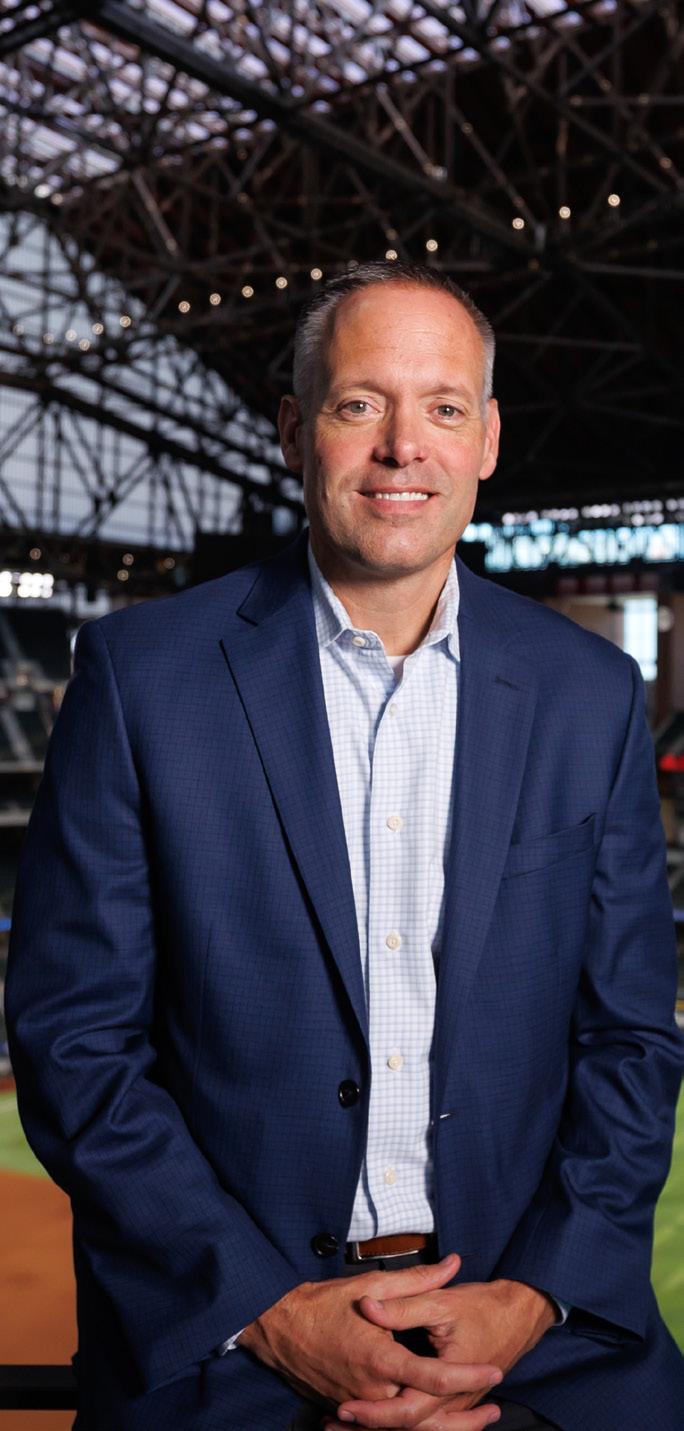
P22
Empower Up
Endré Jarraux Walls arms his people with the tools they need to protect against cyberattacks at Customers Bank
P47
Good Game
Jamie Loch draws on lessons learned in baseball to promote an empathetic culture at Digi International
P59
Data in Action
Designer Brands Inc.’s Maneesha Bhalla believes that the future of data technology hinges not on obtaining the data but knowing what to do with it
P77
Find Your Voice
Controller Bailey Price goes all in to empower her team and break down barriers for women at Jellysmack
P86
Set the Standard
NBME’S SVP, General Counsel, and Chief DEI Officer Linda Gadsby didn’t have an example to follow as she grew up—so she set out to become one


P100
P108 PROFILE PROFILE 4 Q2/23
On and Offscreen
Sameer Purao isn’t just a tech professional; he’s also a business partner. At Celanese, he’s using both those skill sets to drive change.
Winni Wintermeyer (TPG), Ben Ludeman (Cochrane), Edward Hogarty (Gadsby), Courtesy of Celanese (Purao)
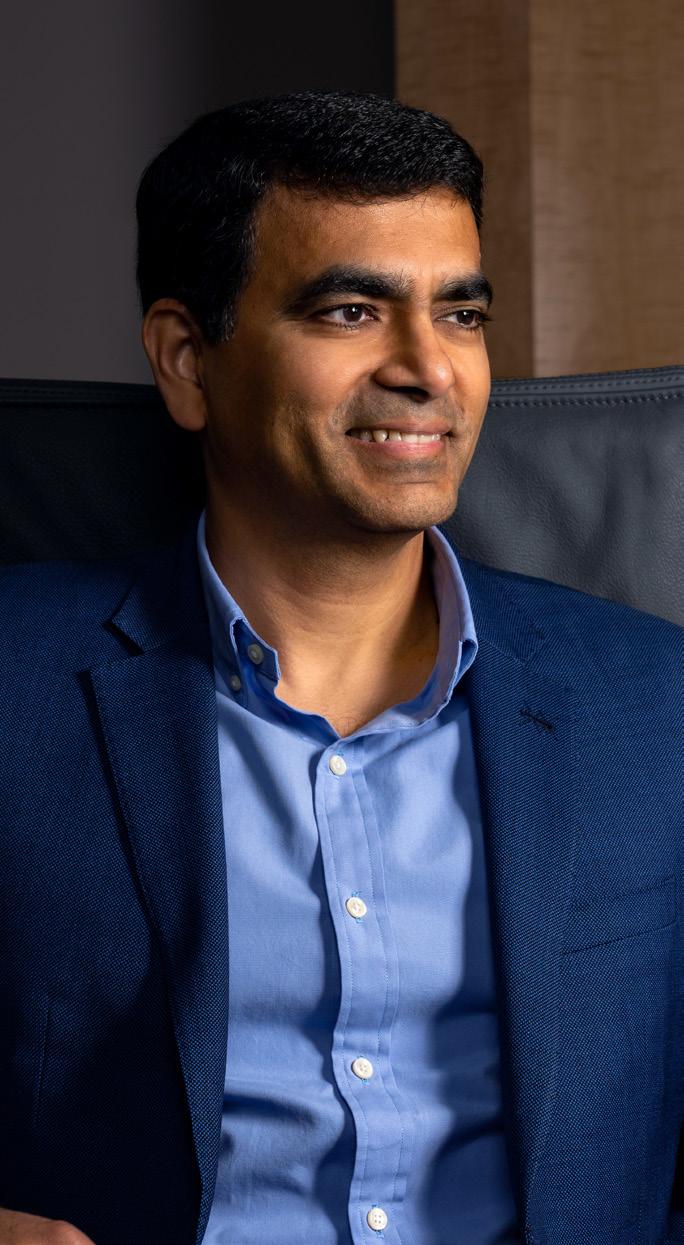
Q2/23
P9
P108 P22
On the Cover
Three decades into his career, Citigroup’s Johnbull Okpara is focused on mentorship and making a difference in the lives of others
P41
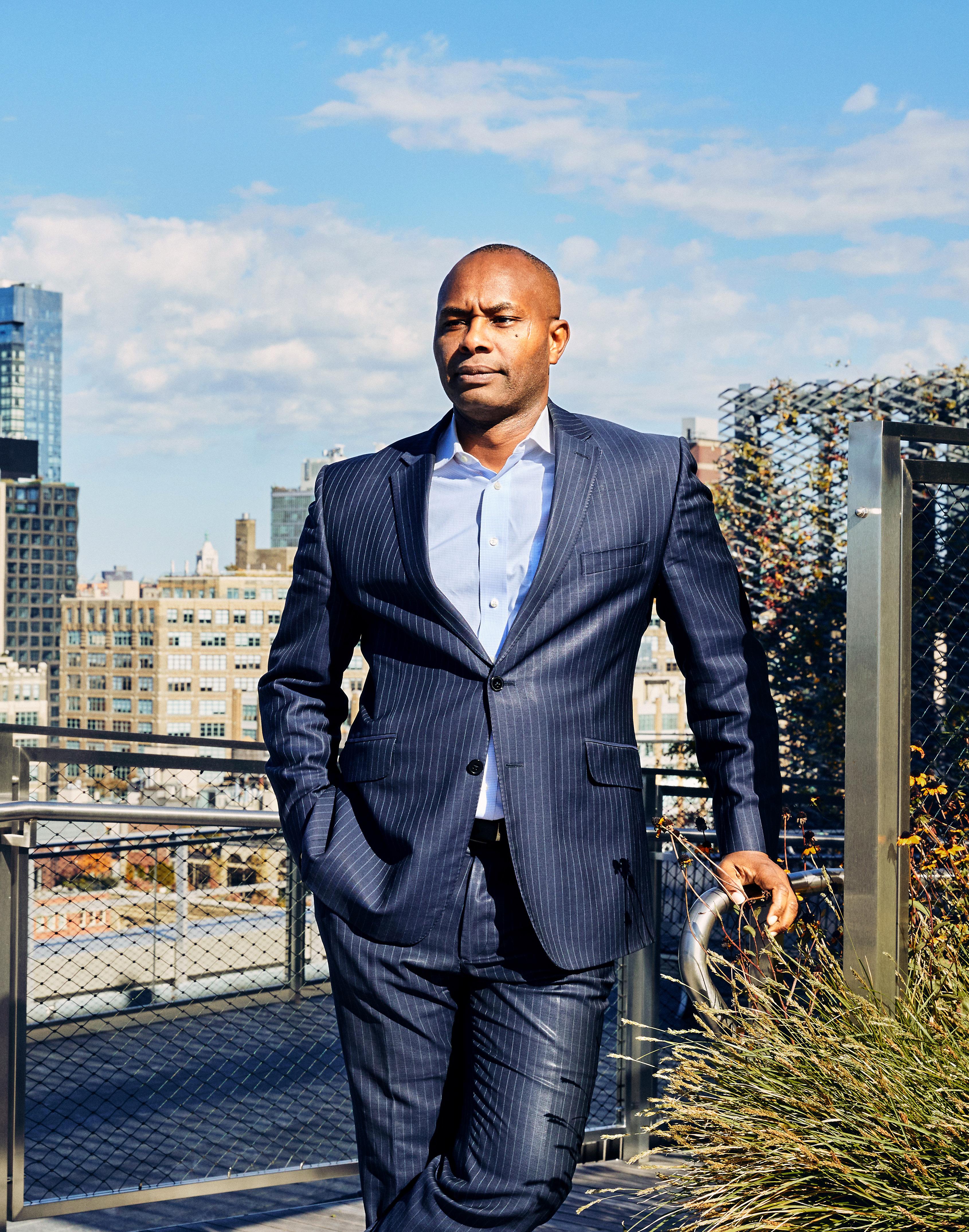
PROFILE profilemagazine.com 5 PROFILE Q2/23
Peter Garritano
CREATIVE
Editorial Director
Frannie Sprouls
Managing Editor and Creative Operations Coordinator
Melaina K. de la Cruz
Editors
Jaylyn Bergner
Sara Deeter
Michele Cantos Garcia
Brittany Farb Gruber
Julia Thiel
Staff Writers
Zach Baliva
Billy Yost
Contributing Writers
Zachary Brown
Marcos Chisholm
Frank DiMaria
Will Grant
Joseph Kay
Russ Klettke
Natalie Kochanov
Donald Liebenson
Rebecca Rakowitz
Andrew Tamarkin
Designer, Profile
Anastasia Andronachi
Senior Designer
Vince Cerasani
Designers
Rebecca Kang
Arturo Magallanes
Senior Photo Editor & Staff Photographer
Sheila Barabad Sarmiento
Photo Editor & Staff Photographers
Cass Davis
Steven LeFlore
Contributing Photo Editor
Sarah Joyce
Special Projects Editor
Sara Deeter
CORPORATE
CEO & Publisher
Pedro A. Guerrero
President, Group Publisher
Kyle Evangelista Chief of Staff
Jaclyn Gaughan
SALES
Director, Sales
Stuart Ziarnik
Director, Sales Onboarding
Justin Davidson
Manager, Onboarding Sales & Development
Hannah Tanchon
Sales Researchers
Titus Dawson
Kemp Pile
Lead Recruiter, Guerrero Search
James Ainscough
Senior Director, Corporate Partnerships & DEI Solutions
Krista Horbenko
Digital Product Manager
Aleksander Tomalski
Director, Talent Acquisition & Engagement
Haylee Himel
Talent Acquisition Managers
Josie Amidei
Jordyn Gauger
Content & Advertising Managers
John Brundage
Sydney Churchill Brandon Havrilka
Sarah Kupfer
Megan Murphy
Maggie O’Brien
Maya Porterfield
Gina Stephenson
Bella Wabick
Profile® is a registered trademark of Guerrero, LLC.

© 2023 Guerrero, LLC guerrero.co 1500 W. Carroll Ave. Suite 200 Chicago, IL 60607
Subscriptions + Reprints
AUDIENCE & ENGAGEMENT
VP, Hispanic Division
Head of Audience & Engagement
Vianni Lubus
Director, Events
Jill Ortiz
Events & Marketing Manager
Ashley Parish
Communications & Engagement Manager
Cristina Merrill
Social Media Manager
Suleidys Tellez
OPERATIONS
VP, Finance
David Martinez
Director, Circulation
Stacy Liedl
Staff Accountant
Natallia Kamenev
Senior Director, Client Operations
Cheyenne Eiswald
Account Manager
Abigail Stern
Senior Manager, Client Services
Rebekah Pappas
Manager, Client Services
Brooke Rigert
Office & Operations Coordinator
Sydney Churchill
Facebook: @profilemagazineofficial
LinkedIn: @Profile-Mag
Twitter: @Profile_ExecMag
Instagram: @profilemagazineofficial
For a free subscription, please visit profilemagazine.com/subscribe. Printed in China. Reprinting of articles is prohibited without permission of Guerrero, LLC. For reprint information, contact Stacy Liedl at stacy@guerreromedia.com.
PROFILE PROFILE 6 Q2/23
From the Editor

Hello, Profile community! It’s nice to meet you.
When tasked with producing a finance section for my very first issue, I felt the same as I did in my high school math class: confused by the expressions and nervous at the thought of having to explain what anything meant. Numbers and I have never gotten along very well; I live with dyscalculia—a learning disability that impairs my comprehension of math and numerical concepts—and finance is perhaps the most intimidating part of my adulthood.
Last fall, while I brainstormed what kinds of content I could give to my designer (knowing that at least she could make anything I came up with look aesthetically incredible), I had the opportunity to interview Betsy Reed, the cofounder and chief revenue officer of CloudWerx. I pondered again: what could I possibly ask a financial expert without looking like I had no idea what I was talking about?
So I researched. I read articles about cloud software, technology, and data. And during the interview, Betsy mentioned imposter syndrome and how the reality of it is that everyone should feel a bit like an imposter now and then, “because if we’re not, then it means that we’re never trying out something new.” She continued by saying that others might compare themselves to me as someone “who’s got it all figured out.” I was surprised— while confident in my work, I hadn’t seen myself as someone that others would want to emulate career-wise. I felt so encouraged and relaxed for the remainder of the interview. (It was filmed; looking back, my joy is palpable.)
I reapproached this issue with Betsy’s words in mind. This is my first edition of Profile, but I’ve been editing (and leading) magazines for years. Though I’m not fluent in finance, I enjoy learning—much like Johnbull Okpara, our cover star and the chief accounting officer and controller of Citigroup (p.41). While he wasn’t a natural accountant when he began his career, he learned on the job, earned certifications, and followed his intellectual curiosity all the way up to the C-suite.
There’s no bad place to start; you just have to start somewhere. So, to learn fintech, I studied the history of technology’s impact on finance (p.116), summarized what I learned, and sent it to be fact-checked. I read and edited the stories of the executives in the feature section and found relief that, according to these experts, the industry is more about people than numbers when it comes to success.
My high school trigonometry teacher, after looking over my test scores during the final semester of senior year, asked me about my plans after graduation. I told him art school (where I studied writing and editing) and he patted my arm and said, “Phew. Good.” It felt validating for someone to admit that while numbers would never be my strong suit, I did belong somewhere. So here I am at Profile. Thank you for having me.
Melaina K. de la Cruz Managing Editor

Sheila Barabad
PROFILE profilemagazine.com 7 PROFILE Q2/23
Sarmiento
Drive Your Organization and Career Forward
Twice a month, Profile delivers exclusive insights from business leaders straight to your inbox.
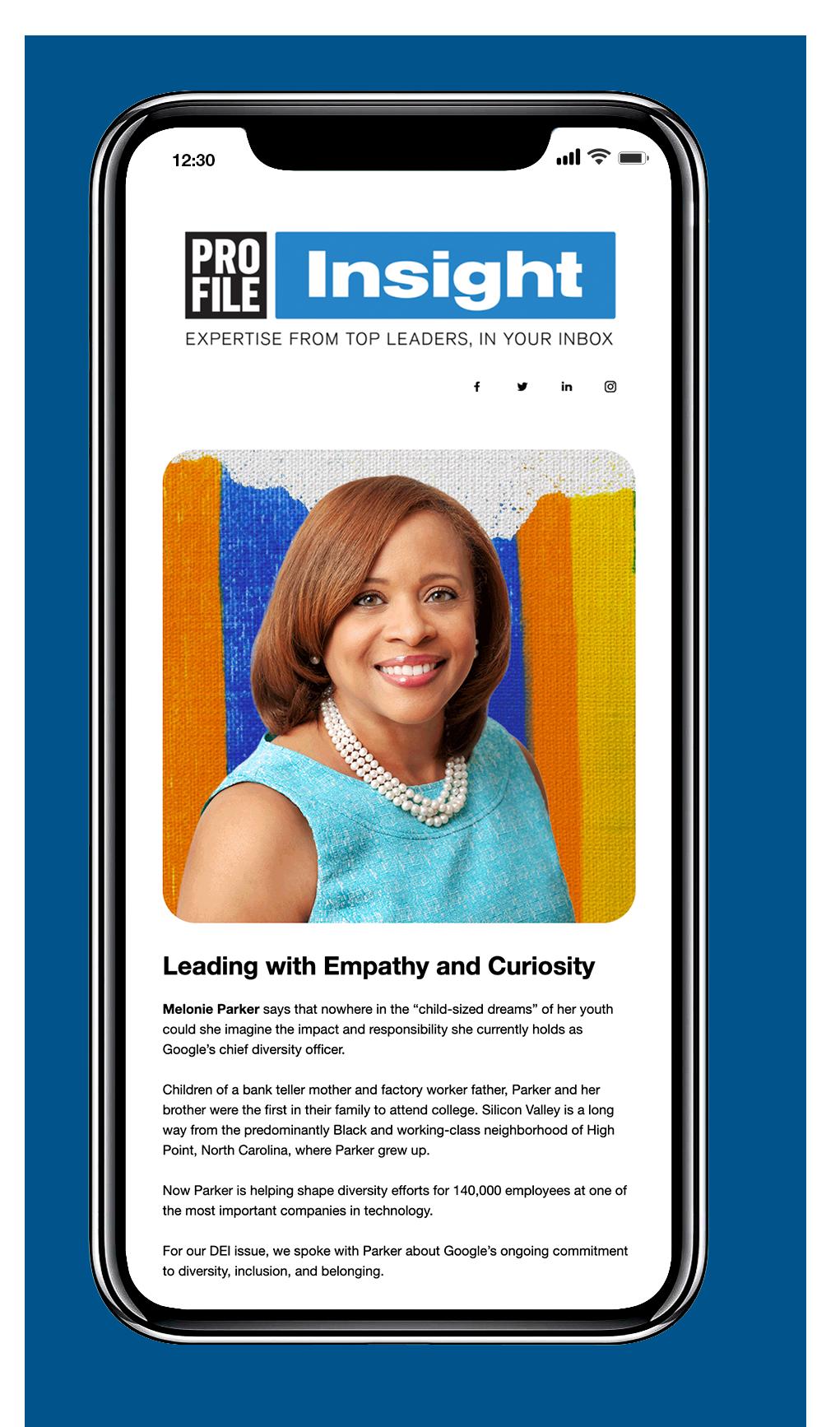
Sign up for the Insight newsletter at bit.ly/PROInsightSubscribe

 By Billy Yost
Photos by Winni Wintermeyer
By Billy Yost
Photos by Winni Wintermeyer
THE INNOVATIVE INVESTORS
Every leader at TPG will tell you the same thing: there is something different about this place. The San Francisco-based investment firm has always done things a little differently, whether it’s investing in large companies early in their life cycles, identifying smaller opportunities with huge promise, or investing in emerging areas in tech and media.



The thirty-year-old investment firm remains rooted in its West Coast mindset by bringing value to its extensive portfolio, without the Wall Street heavy hand and bravado.
That same value goes for those inside the firm. TPG Partners Anilu Vazquez-Ubarri, Maya Chorengel, Julie Hong Clayton, and Katherine Wood all have deep experience in their areas of expertise. But they’ve found something much greater at TPG.
While their journeys are similar in some ways and different in most, their thoughts about TPG make it clear that the culture is its biggest differentiator.
There is a spirit of entrepreneurialism, innovation, and collaboration that seems rare in the investment space. Egos are checked and the lives of employees outside of their jobs are taken into consideration, all while investing in companies that are disrupting some of the most important industries around the world.
As good as things have been, these four women have had to exist in a space dominated by mostly white men for most of their careers.
Each has confronted the challenges that comes with sometimes being the only woman at the table. At TPG, they are at the table. In their own ways, each of these leaders are finding ways to create more opportunities for those from underrepresented backgrounds. And forward-thinking TPG has their back, proving time and again that it is willing to do the right thing and not just the easy thing.
FOCUS profilemagazine.com 11 PROFILE Q2/23
Honesty, Empathy, and Bravery
When TPG went public in 2022, Anilu VazquezUbarri was asked to join its board of directors. It was the perfect moment for the investment firm, which prides itself in taking a stand on important and timely issues, to lead the way yet again when it comes to representation in the space.
“Our culture here is so important, and this was the opportunity for us to eat our own cooking when it comes to being vocal about diversity, especially at the senior levels at our firm,” explains Vazquez-Ubarri, partner and chief human resources officer (CHRO) at TPG.
The board itself, she notes, is not only diverse in terms of ethnicity and gender but also experience. “[TPG Founder] Jim Coulter and [TPG CEO] Jon Winkelried were purposeful about these selections and did exactly what they needed to do to show they walk the walk,” she says.


Vazquez-Ubarri joined TPG in 2018 to lead all things human resources after an extensive career at Goldman Sachs. Her
tough love approach might be distinctive in the HR space, but her record and reputation don’t lie.
“People always know that I will tell the truth,” she says. “That has served me in my professional as well as my personal life. Transparency is so important because it lets those around you know that you are going to say what needs to be said. It doesn’t mean you’re always right, but I don’t think anyone leaves a conversation with me confused about what I believe.”
Vazquez-Ubarri believes her emphasis on candor is critical for a person of color because if she doesn’t speak up, who will? It’s an additional burden that people from underserved backgrounds are forced to take on in corporate America—at least until diversity, equity, and inclusion are more broadly established.
As CHRO, Vazquez-Ubarri says she and her organization are stewards of the culture at TPG. “That’s a big job that requires you to be brave, because every day something is going to come up that you hadn’t planned on confronting,” she says. “It could be a valuable teaching moment and an organic opportunity to have an important conversation.”
Fortunately, the Vazquez-Ubarri has been emboldened by a culture of empathy and humanity at TPG. “There is a personal touch that is really unique to this firm,” she says. “That’s true with how we engage with our investors, with our portfolio companies, with our shareholders, and with any stakeholders that we come across. And it’s very much true how we engage with our employees. It’s a very one-to-one culture.”
What may be most telling about Vazquez-Ubarri’s culture stewardship at TPG is what she considers to be one of her biggest successes in the past four years. It’s not the board seat. It’s seeing just how hard her team fought to make life for employees easier during the pandemic. “There was so much tragedy and trauma around the world,” she reflects. “It meant so much to hear from our people how TPG was their place of comfort, and how they felt really supported, during such a difficult time for them and their families.”

FOCUS PROFILE 12 Q2/23
As partner and CHRO, Anilu Vazquez-Ubarri brings a voice of transparency that advances TPG’s culture at all levels
Scan the QR code to be taken to the web story.

Partner and CHRO TPG
“Transparency is so important because it lets those around you know that you are going to say what needs to be said.”
FOCUS profilemagazine.com 13 PROFILE Q2/23
Anilu Vazquez-Ubarri
Pushing Boundaries
Julie Hong Clayton is a selfdescribed deal fanatic. She has close to twenty years in the equity capital markets arena with one absolute constant.
“I love crafting creative solutions for our portfolio companies and adapting real time to environments where you can’t control all the inputs,” explains Clayton, partner at TPG, where she leads the firm’s equity capital markets. “It’s such a dynamic atmosphere and confronting the unexpected is something I really thrive on.”
Clayton took on her equity capital markets leadership role at TPG at a time when only a handful of private equity firms had the position, and she elevated the function to become a differentiator for the firm. As the first woman in this role across the private equity landscape, she is recognized for her work promoting its impact and is seen as a role model, which she accredits to TPG’s open culture.
Clayton has called TPG home since 2013, after making sure to do her diligence on the culture and firm mindset before joining. She was drawn to the fact that
individual employees are empowered to push boundaries while still prioritizing the overarching goal, outlook, and vision of collaboration and creativity.
“The ethos of this firm is built around rewarding innovation and celebrating the uniqueness of the individual while still embracing a team mindset,” Clayton says. “I think that is probably the clearest way to describe our culture.”
At TPG, Clayton’s journey has included being one of the key business leaders working on the firm’s IPO in 2022. She was proud to be on the stage at NASDAQ to ring the opening bell and celebrate the momentous occasion.
While the TPG IPO was a capstone achievement in her career, Clayton adds that some of her most meaningful memories at TPG are of challenging moments.
“The situations I think about most fondly are actually the times when our senior-most leaders and professionals have hunkered down, side by side with me to navigate unexpected deal dynamics,” she explains. “It is so important to me to be part of a team who has my back, where I’m heard and trusted.”
Along with the firm’s own IPO, Clayton is acutely focused on optimizing IPOs and equity capital markets transactions for TPG’s portfolio companies.
“I anticipate and distill the needs and contributions of the whole ecosystem of people required in the complex process of bringing a company public,” Clayton explains. “And when you’re able to lead with empathy, build credibility, and earn trust, it can really drive the outcome forward in incredible ways.”


Despite her prolific transaction experience, Clayton has never been one to fight for the spotlight. She says she’d much rather give credit than take it, and she had the benefit of working for leaders who set that example just as magnanimously throughout her career. And while she demands a lot from herself and from her team, she understands the value of appreciating the expertise and feats of those around her.

FOCUS PROFILE 14 Q2/23 Scan the QR code to be taken to the web story.
Julie Hong Clayton thrives on crafting new solutions for evolving markets at TPG
TPG

Partner, Equity Capital Markets
“The ethos of this firm is built around rewarding innovation and celebrating the uniqueness of the individual.”
FOCUS profilemagazine.com 15 PROFILE Q2/23
Julie Hong Clayton
Another Angle of Healthcare
was an incredible crash course, and I think truly emblematic of how we work here.”
She continues, “Our job is to unpack complex industry evolutions and to try and look around corners, but we do it together. From day one, I saw that this isn’t a top-down kind of place.”

One of Wood’s favorite ways to invest in the healthcare space is through carve-outs, where new businesses are created out of larger organizations. Wood points to a transaction from 2018 where she and the TPG team were able to successfully carve out Allogene from Pfizer.
“Allogene is a company that is developing a very exciting new class of cancer therapies, but inside of Pfizer, they were competing with thousands of other projects,” Wood explains. “We were able to spin this business out, recruit a management team, and establish a new company with people, resources, and capital dedicated to this sole focus.”
The senior healthcare investing team at TPG has been together for more than a decade. It has experienced professional highs, personal tragedies, and everything in between during those ten years. Katherine Wood says that trust underpins the partnership culture at the organization.
“I have found that culture and investment style are closely tied, and culture can influence your investment style over time,” Wood explains. “Our culture enables an investment strategy that is very focused on partnership and growth.”
Wood’s healthcare experience runs incredibly deep. Her parents and family members were physicians. She was premed in college, did HIV outreach in South Africa, ran a free clinic, and gained experience in public health, academic medicine, and frontline care. But, Wood wanted to work in healthcare from a different perspective.
She joined TPG at the bottom of the 2009 market with the Affordable Care Act just on the horizon.
“Even though I was a more junior member of the team, because I had some healthcare experience [current TPG President and Comanaging Partner] Todd Sisitsky pulled me into a conference room, and for the next month we studied and planned around what might happen in the healthcare space with the transition to the ACA,” Wood remembers. “It

Today, with TPG’s investment, the company has invested over $700 million in research and development and brought four products into clinical trials. Pfizer, Wood notes, is one of the largest investors in Allogene. “They’re as proud as we are of what the company has become.”
This is what Wood loves most: unlocking possibilities that weren’t necessarily feasible before TPG came on the scene.
“Think of the impact these therapies could have on the lives of cancer patients,” Wood says. “Building that trust with large corporations like Pfizer is an integral way of doing business here. We are always looking to find solutions that will benefit our partners and the companies we invest in.”
How TPG’s Katherine Wood leads her team to unpack complex industry evolutions and carve out new possibilities in healthcare
FOCUS PROFILE 16 Q2/23
Scan the QR code to be taken to the web story.
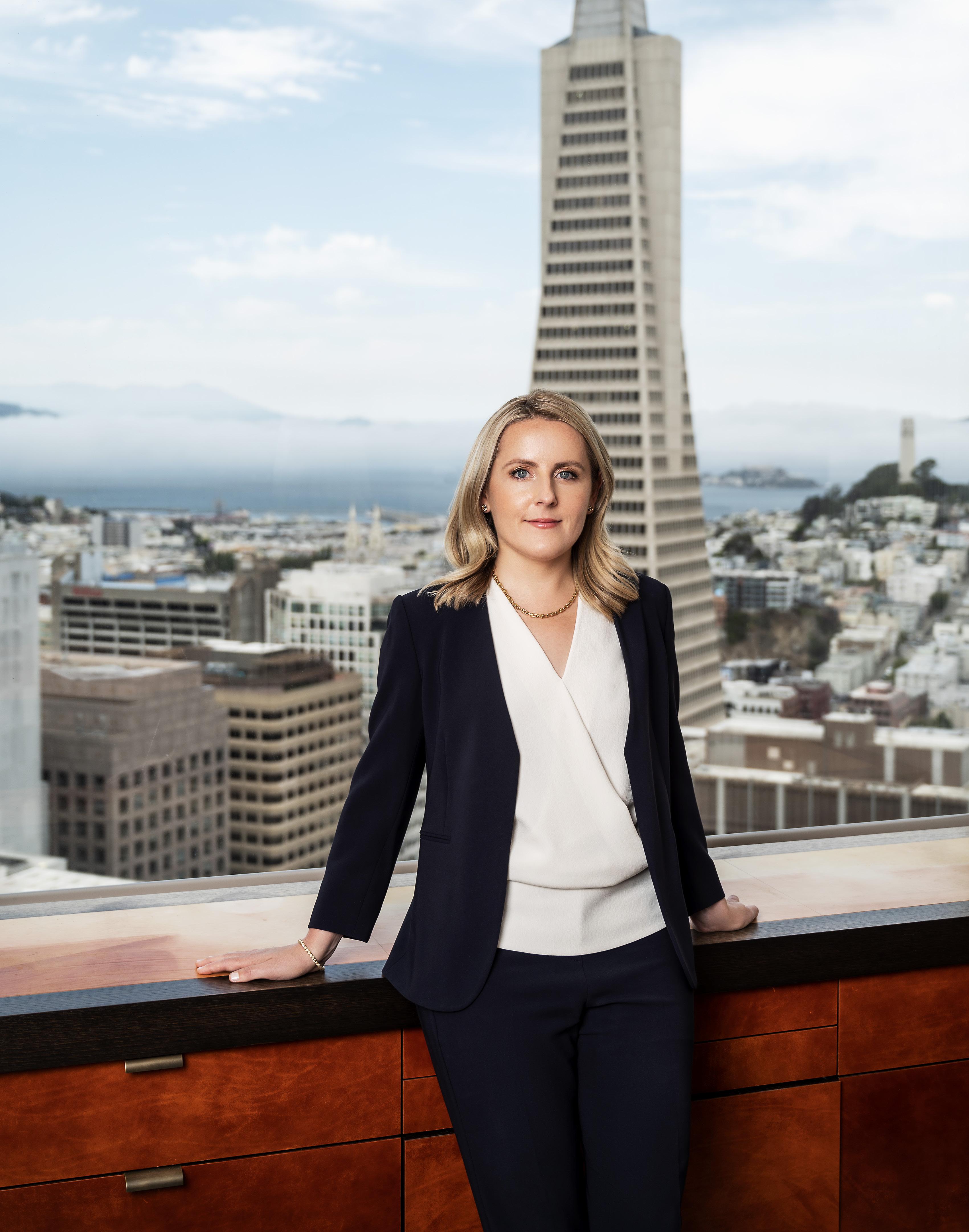
TPG
Partner
“Our culture enables an investment strategy that is very focused on partnership and growth.”
FOCUS 17 PROFILE Q2/23 profilemagazine.com
Katherine Wood
Rise Above
When TPG first started working on what is now known as the Rise Fund, the idea was to invest in strong businesses that were also driving measurable environmental and social impact. Back in 2015, the largest fund of that kind was investing between $350 million to $400 million. The Rise Fund would first seek to raise $1 billion. Then, it doubled the amount.

“The idea was to prove to the markets that this is important work that can and should be done,” explains Maya Chorengel, comanaging partner of the Rise Fund. “We now have $15 billion in assets under management, and TPG has forever changed the impact investing industry as the largest, global, private equity impact fund with the deepest financial and impact track record.”
And, while she won’t take credit, Chorengel has been there since nearly the beginning.
The comanaging partner has spent three decades in the investing world including two of those decades in the impact space. She left a vice president role at Warburg Pincus in 2002 to start a series of small impact funds on her own. But, the chance to alter fundamentally the journey of impact investing lured her to TPG in 2017.
In addition to her leadership role at the Rise Fund, when TPG went public, Chorengel was
asked to join the firm’s board of directors. It wasn’t a role she was seeking out, but as a woman of color, Chorengel quickly realized just what her assuming the board role meant for other women in the space.

“The number of notes that I received from younger women at the firm telling me how much it meant to them to see me up there, to know that someone who looked like them could have a seat at the table, was really powerful,” Chorengel recalls. “This wasn’t a seat that I asked for, but once granted the opportunity, I take the responsibility of representing more than just myself very, very seriously.”
Chorengel’s influence on the Rise Fund and its effect on impact investing is important. However, she notes that every highlight comes with its own challenges, which she shares with other women in hopes of making their journeys easier.
“Whenever I talk with women, I try to share my own struggles in finding the right balance in my life,” she explains. “It has always been important to me to spend time with my family and my two sons, and I wanted to make sure I was taking care of myself too. I think the difficulty in finding that balance is something working parents I speak to understand very well.”
An additional challenge for Chorengel includes sometimes being the only woman or Asian in the room. Things have gotten better, but she hopes to see even more change. In fact, she is an active member of several employee resource groups at TPG and is providing guidance for the next generation of leaders hoping to create more change in an industry that will only benefit from it.
And, if there’s one thing Chorengel has proven, it’s that she can create incredible change.

As comanaging partner of the Rise Fund, Maya Chorengel creates incredible change in the world of impact investing at TPG
FOCUS PROFILE 18 Q2/23
Scan the QR code to be taken to the web story.


“The idea was to prove to the markets that this is important work that can and should be done.”
Maya Chorengel
FOCUS profilemagazine.com 19 PROFILE Q2/23
Comanaging Partner, The Rise Fund TPG
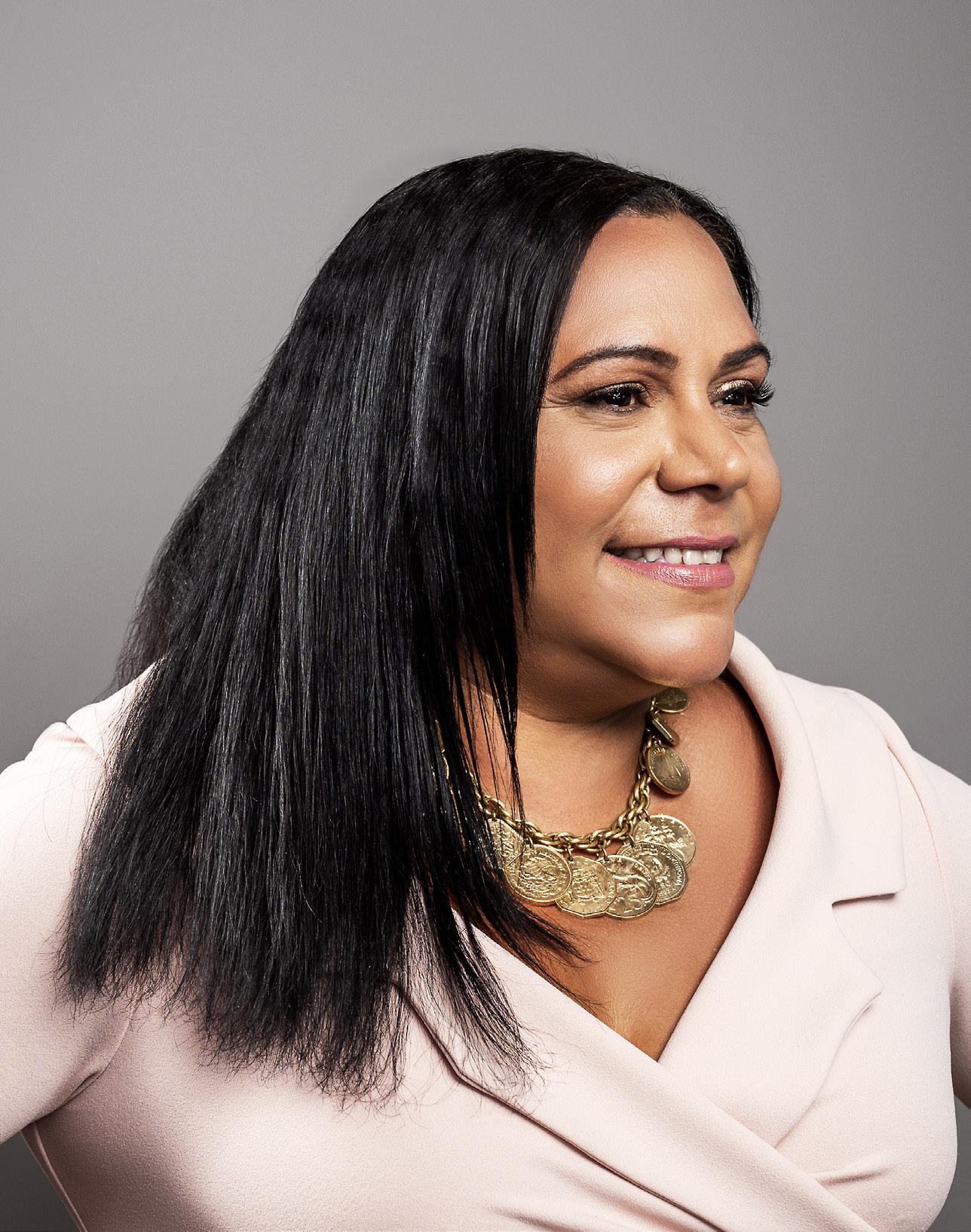


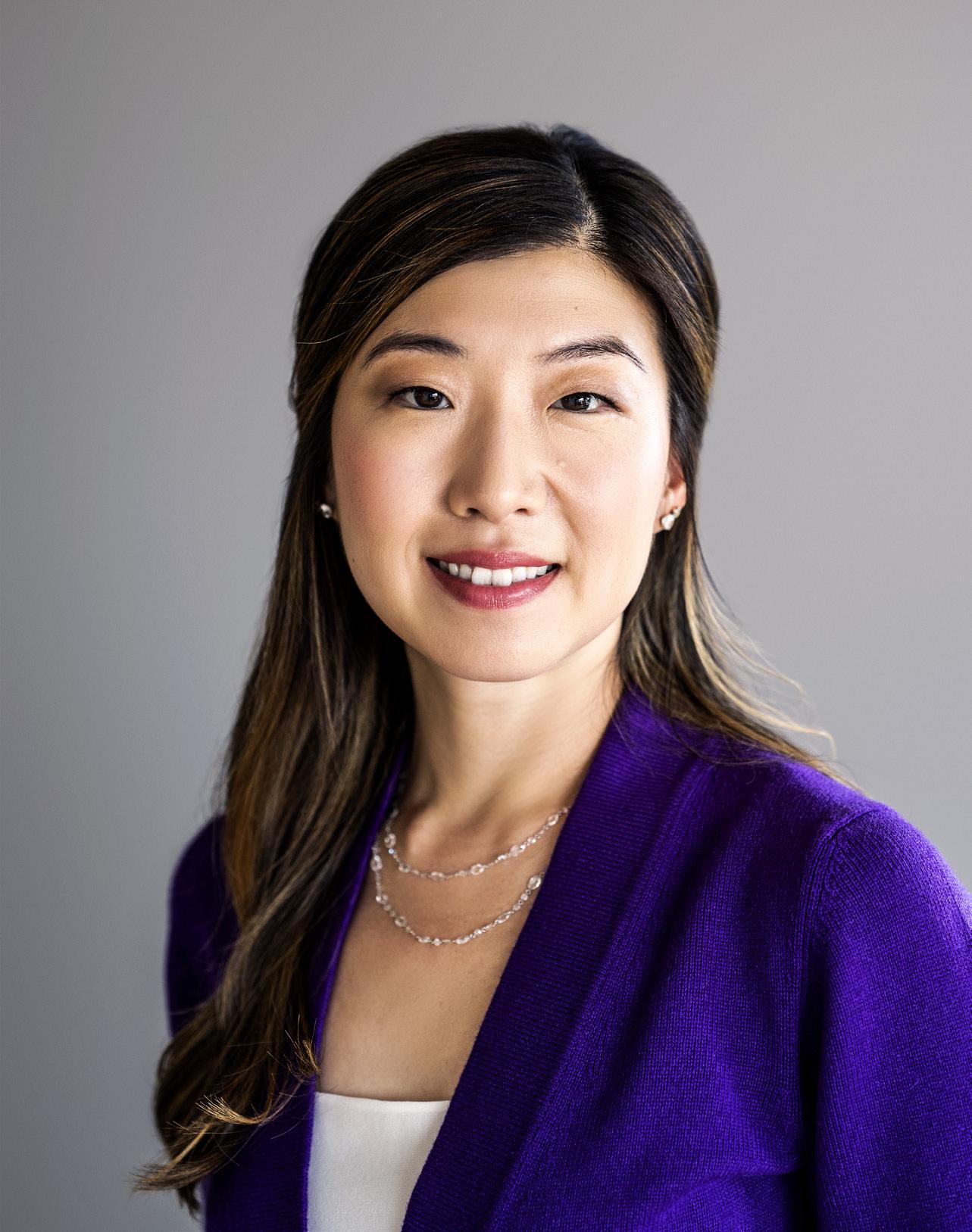
FOCUS Q2/23 PROFILE 20 Scan the QR code for digital bonus content.
TALENT
What is a company without those who lead it? Executives provide their blueprint for cultivating a successful career.
P22
P27
P29
P31
State University P34
Jim Cochrane, Texas Rangers
Lensford McKenzie, Argus Media
Mary McManigle, CorePower Yoga
Dalan Winbush, Quickbase
Carolyn Hafner, Wayne
Turning Dreams into Reality
By ZACH BALIVA
Like many kids, Jim Cochrane dreamed about working for his hometown sports team. He grew up in the DallasFort Worth area rooting for the Texas Rangers and remembers heading to the stadium to watch greats like Nolan Ryan, Rafael Palmeiro, and Juan Gonzalez. When Cochrane was close to graduating from the University of Oklahoma in 1996, he knew it was time to try to land his dream job with the franchise—he would just need a stroke of luck.
It was May, and Cochrane, who had switched his major to journalism, was preparing to finish an extra semester of college to accommodate the change when his mother asked for a favor. She needed a ride to the ballpark in Arlington. Why? She wanted to audition to sing the national anthem.
The audition went well, and she was selected to sing before a home game. Cochrane joined his mother on the field to
prepare, and when a Rangers employee asked what he would do after college, Cochrane had a bold response. “I want your job,” he told her. The employee said he would have to start as an intern and asked for his résumé.
That sparked another series of fortunate events. A manager interviewed Cochrane and told him to check back in ten days. When he did, he learned the team had been too busy to interview anyone else—but they needed someone to show up. Cochrane came back to the stadium on January 28, 1997, and has been working for his favorite team ever since.
Life with the Texas Rangers has been exactly what Cochrane had hoped for. “If you can have a career working in sports, are you really working every day?” he asks. In 1997, the team that came to Texas from Washington, DC, in 1972 was coming off its first postseason appearance in franchise history. Its ballpark was only three years old, fans were excited, and expectations were high. The excitement fueled the team’s
As a child, Jim Cochrane fantasized about working for the Texas Rangers. For the past twenty-five years, he’s been doing just that.
“If you can have a career working in sports, are you really working every day?”
TALENT PROFILE 22 Q2/23
JIM COCHRANE
Scan the QR code to be taken to the web story.

TALENT profilemagazine.com 23 PROFILE Q2/23
Ben Ludeman
Jim Cochrane SVP of Partnerships
Texas Rangers

“We’re not in sales; we’re in the relationship business.”
TALENT Q2/23 PROFILE 24
JIM COCHRANE

TALENT 25 PROFILE Q2/23 profilemagazine.com
Ben Ludeman
Globe Life Helps Make Tomorrow Better
employees, and Cochrane got valuable entry-level experience as he stepped into a partnerships department and learned to work with sponsors.
Although the Rangers struggled in 1997, Cochrane’s job performance earned him a full-time offer selling partnerships. The team improved and made the postseason again in 1998 and 1999, and Cochrane settled into a small department selling new features like rotational advertising signage behind home plate.
A lot has changed since then. The team, league, and industry have all evolved. As senior vice president of partnerships, Cochrane manages a large team, deals with clients that have huge budgets, and supports many events outside of baseball.
In 2016, when the Rangers announced plans to build a new stadium, Cochrane knew he would have a major project on his hands: selling the naming rights to the team’s new home. Instead of finding a new partner, he and his colleagues worked with Globe Life to extend their partnership from the old venue to the new one. The insurance company will retain naming rights to the Rangers ballpark, currently known as Globe Life Field, through 2048.
“Our sponsors are seeing the value we bring and how the Texas Rangers and Major League Baseball (MLB) can help their brand and increase their profile not just in a city but in a region and around the country,” Cochrane says.
It’s just one of many big projects the partnership staff handles. The $1.25 billion Globe Life Field hosts rodeo championships, college football and baseball games, concerts, and other live events. The team’s owners also manage their former stadium which now serves as an outdoor entertainment venue. Cochrane supports those events and other adjacent projects.
Cochrane knows his twenty-nine counterparts at other MLB teams are doing
similar work, but believes the personal touch sets his group apart. “We’re not in sales; we’re in the relationship business,” he says. “We want our partners to feel like the money they spend with the Texas Rangers is the best money they spend because we know them and take care of them.”

Nothing demonstrated that philosophy in action more than the team’s response to the COVID-19 pandemic, which delayed Globe Life Field’s grand opening and the start of the 2020 baseball season. The venue’s first planned event, a Chris Stapleton concert, was canceled just forty-eight hours before showtime.
Cochrane had negotiated every sponsor contract and was looking forward to celebrating a ribbon cutting. Instead, he was busy renegotiating contracts in a period of uncertainty. Globe Life Field was about to host thirty home games without fans when partners expected eighty-one sellouts. Cochrane asked those on his team to work closely with clients and find good compromises to keep them happy and engaged for future seasons.
Today, Cochrane is renewing partnerships and working behind the scenes to sell a new product: a four-by-four-inch jersey patch approved by MLB for the 2023 season. It’s a new opportunity without a set value. The San Diego Padres have a fouryear $9 million deal with Motorola. Rumors are that the Boston Red Sox are closing in on a ten-year $17 million agreement with MassMutual.
The revenue Cochrane can generate will go to owners who use the funds to improve the on-field roster. The Rangers last went to the playoffs in 2016 and although they made it to the World Series in both 2010 and 2011, they have never won it all. Cochrane knows his team will one day emerge as league champions—and he wants to be there to see them hoist the Commissioner’s Trophy when they do.
Globe Life strives to Make Tomorrow Better for our customers, agents, employees, and communities. We make an impact where we live, work, and serve. For more than a century, we have helped secure the financial futures of working families across the country.
26 Q2/23 PROFILE TALENT
GlobeLifeInsurance.com
“Go for It”
Lensford McKenzie talks tight turnarounds, leveraging networks, and automated innovation at Argus Media
By BILLY YOST
Two-and-a-half days: that’s exactly the amount of time Lensford McKenzie had to redesign an entire budget for a private equity presentation. He wasn’t even a full-time employee—he was a consultant when the president of a chemical manufacturer walked into his office, closed the door, and requested the impossible.

“I do remember thinking, ‘What if I just left and didn’t come back?’” McKenzie says, laughing. “It couldn’t be worse than having to do this.”
Instead, McKenzie, a consultant at that point in time, called his wife and told her that he wouldn’t be coming home any time soon.
McKenzie, the son of two Jamaican immigrants who came to the US in the 1970s, grew up understanding that nothing would be handed to him so he did what he did best. He reached deep, utilizing every skill and experience he’d garnered from his public accounting expertise, and set out to plot the financial future for an organization he was only beginning to understand.
There was little-to-no documentation to speak of, and McKenzie would have to not only work to understand the client’s current economic state but also put together an easily digestible presentation about the future of the organization. Despite the tall order, the president ultimately approved.
“He told me it was one of the best presentations he’d ever seen in just communicating
“Go after what you believe you can do. Even if you don’t check every box on the list. The worst thing they’re going to tell you is no. So go for it.”
LENSFORD MCKENZIE
TALENT profilemagazine.com 27 PROFILE Q2/23 VERSUSstudio/Shutterstock.com Scan
the QR code to be taken to the web story.
HELPING FINANCE & ACCOUNTING ORGANIZATIONS WORK SMARTER, NOT HARDER.
our situation and what we could expect going forward,” the controller remembers. “Going through that experience, I just realized that there’s not much that I can’t do, and I needed to believe in myself.”
BEGINNING THE JOURNEY
McKenzie brought that confidence and passion to the price reporting agency, Argus Media, in 2019, but it almost didn’t happen. He’d verbally accepted a role with another organization, but when a random recruiter reached out to ask him to interview with a company that he couldn’t reveal to McKenzie until later, the executive grew curious.
“It just seems like it was meant to be,” McKenzie explains. “I’ve worked in a lot of oil field service companies and energy related fields, and I think almost every single one of those had been using Argus’ services. I’ve been circling Argus for the majority of my career, and then I got the chance to work for them and it’s been great.”
McKenzie recently began the critical work around addressing high level of turnover at the company’s accounts payable department. He aspires to aid the small team’s efficiency and productivity without adding to the headcount, and he’s confident that finding an effective automated accounts payable solution will do the trick.
He began what he predicted would be a long journey late in 2021 and is looking at onboarding a major enterprise solution
whose implementation time will be extensive. “It’s going to be an adventure, and I’m here for it,” McKenzie says with excitement.
More broadly, the professional attributes his success in leadership positions by being open, consistent, and encouraging his team without micromanaging. While he keeps an active eye on ways that employees may learn or grow through training or development opportunities, the controller says he’s never going to be leaning over anyone’s shoulder.
DON’T BE AFRAID TO GROW
McKenzie’s focus on the growth of others sometimes has its downsides. He recently lost his payroll specialist, and it’s partially the controller’s fault.
“I always encouraged her to continue growing and looked for ways that I could help her evolution,” McKenzie says. “She felt like she had hit a ceiling and needed to move to continue to develop. I’m so happy for her, but it was also hard to lose her. But I hope the rest of my team understands that I want what’s best for them, and I want them to continue to grow in whatever direction that may be.”
The controller’s own evolution wasn’t always easy. As an African American, the executive admits he’s felt uncomfortable in a variety of situations in the corporate and financial world that is often very white. But McKenzie’s approach might shine some light for others to emulate. He says people of color shouldn’t be afraid to network with people that couldn’t be more different from themselves.
“If you’re really trying to grow your career, you need to reach out to everyone,” McKenzie offers. “Those networks will absolutely have an impact on your career, no question. The more you’re willing to open yourself up—and I mean introducing yourself to people you wouldn’t normally talk to in a social setting— the more opportunities you’re going to find.”
The controller adds that people of color shouldn’t wait to be tapped for opportunity. History proves the wait is often long and unfulfilling. Instead, reach out, make connections, and encourage change to happen for yourself. “Go after what you believe you can do,” McKenzie advises. “Even if you don’t check every box on the list. The worst thing they’re going to tell you is no. So go for it.”
“I hope the rest of my team understands that I want what’s best for them, and I want them to continue to grow in whatever direction that may be.”
LENSFORD MCKENZIE
TRINTECH IS THE LEADING GLOBAL PROVIDER OF CLOUDBASED SOFTWARE SOLUTIONS THAT HELP MANAGE ALL ASPECTS OF THE FINANCIAL CLOSE PROCESS FOR IMPROVED EFFICIENCY, RELIABILITY, AND STRATEGIC INSIGHTS High-Volume Transactions Balance Sheet Reconciliations Intercompany Journal Entries Close Tasks Compliance Reporting To learn more about Trintech, visit www.trintech.com 28 Q2/23 PROFILE TALENT
Find Your Flow
By ANDREW TAMARKIN
Mary McManigle is a connected leader. As vice president of accounting at CorePower Yoga, she practices the connected mentality of her yoga flow both on the mat and in the office. Coming out of the pandemic, CorePower is currently focused on growth-oriented initiatives. McManigle is equipped with extensive financial experience and a passion for yoga—a perfect fit to execute these goals.
“Operations decides what to do, and [my team] figures out how it fits into our financial statements, how we’re going to account for it, and how we’re going to interact with outside vendors for it all to come together,” she says.
Committed to the company’s positive impact on physical and mental wellness, McManigle’s work is made all the more meaningful.
McManigle was born in a small town in North Dakota, where only thirty-seven people were in her graduating class. Beginning when she was young, her parents insisted: “You’re going to college.” She received a degree in chemical engineering, a second one in accounting, and left her town for good.
Her first opportunity was in public accounting for Arthur Andersen, which

As CorePower Yoga continues to build its future, VP of Accounting Mary McManigle finds ways to stay present amid its growth
TALENT profilemagazine.com 29 PROFILE Q2/23
Mary McManigle VP of Accounting CorePower Yoga
Scan the QR code to be taken to the web story.
Julie Harris
brought her to Colorado. “I always knew I wanted to live here because I wanted to ski,” she says.
McManigle rose through her financial career working for real estate investment trusts, including an array of companies that owned multifamily housing, industrial buildings, and hotels.
“During that time, I’d take [my young kids] to the skate park. I’d bring my chair and my book,” she says. “I was starting to get bored, so I decided to buy a skateboard.” Her oldest son taught her how to do a drop-in, among other tricks. And she had fun until an accident left her with a bulging disk and sciatica.
“I could barely walk,” she remembers. Struggling to recover, she drove by a CorePower studio one day with a “One Week Free” sign out front. “Well, it can’t hurt,” she thought.
Within three months, not only was McManigle completely healed, but she’d found a practice that helped her balance a stressful job, a traveling husband, and two kids at home. Addicted to yoga from that point on, she became a certified yoga instructor and taught four classes a week on top of her full-time job.
In October 2020, McManigle’s recruiter called her about the open accounting position at CorePower Yoga. “From the moment I walked into a CorePower studio, I was such a believer in what we do, in why we’re here, [so] it was no question that it was going to be a yes,” McManigle says. “I’ve never really felt like I was part of something larger than myself, and I really feel that way here.”
CorePower has 190 corporate-owned studios and an additional 42 franchised studios. McManigle and her team are responsible for financial statements, bank reporting, annual audits, and data assembly for the several revenue streams.
Since Trevor Tice founded CorePower in 2002, the company has grown exponentially and has been bought and sold by a handful of private equity firms, with TSG Consumer being its primary investor. The onset of COVID-19 in 2020 slowed the rate of growth; since studios have reopened, membership hasn’t fully returned to where the company stood pre-pandemic. Current initiatives are thus growth centered.
“Before the pandemic, we had fifteen new studios in the pipeline. Over the last year, we’ve slowly gotten them all open [and the] objective is to continue to expand,” McManigle reports. “We just bought a new accounting system called NetSuite, [which will] allow project tracking [and thereby offer] management better data. Over the next six months, that’s our primary focus: getting that implemented.”
In confronting the shortage of returning yoga instructors, CorePower increased teacher training opportunities and opened scholarships for aspiring yoga teachers in the BIPOC communities. In making access to classes more versatile, membership now includes access to online and live platforms. In expanding its reach, a newly hired real estate team researches in-field opportunities and projects new markets to tap into.
Meanwhile, the corporate team practices the concepts that students learn in class: to let go, to be present, to be grateful. “We have a studio on-site,” McManigle says. “From time to time, the entire accounting team will take a class together, and it’s so lovely.”
Like the Sanskrit tattoo on her wrist that translates to “connection,” McManigle makes deep, personal connections with the people who report to her. She rolls up her sleeves and works beside team members when they need guidance. She schedules weekly one-on-ones over coffee outside the office. She believes it’s OK for people to fail; that’s when she uses her coaching skills to get them back on track.
“You have to build connection first [so] you can feel good about being tough when you need to be tough,” McManigle says.
As CorePower grows, McManigle consistently looks for ways to automate processes so as to make time for more impactful work. Simultaneously—grounded by yoga’s philosophies—she stays present, focused, and offers grace.
“I’ve been accused of being a Pollyanna because I’m always looking at the bright side,” McManigle says with a laugh. “I was a small-town girl. I would have never envisioned the life I have today, and I’m so grateful for all the people [who] believed in me and gave me opportunities along the way. The flip side: I took every opportunity I could; I always said yes.”
McManigle believes she found yoga when she was supposed to. As CorePower grows, the goal is that others will as well.
“From the moment I walked into a CorePower studio, I was such a believer in what we do, in why we’re here . . . I’ve never really felt like I was part of something larger than myself, and I really feel that way here.”
TALENT PROFILE 30 Q2/23
MARY MCMANIGLE
Letting Down the Ladder

Biased administrators told Dalan Winbush he should “settle” for a blue-collar job, but the selfproclaimed geek is now helping the world’s top tech companies drive results
By ZACH BALIVA
TALENT profilemagazine.com 31 PROFILE Q2/23 Fuga Studio/Shutterstock.com Scan the QR code to be taken to the web story.
Dalan Winbush is 6’4” and weighs 260 pounds. He lives in the Denver metropolitan area. When he meets the Broncos that live down the street from him, they assume he, like them, is a football player. But Winbush isn’t a former National Football League star—he’s a self-proclaimed geek and (former) leader at some of the biggest companies in the world.
That geek status is a big deal to Winbush, because the computer information systems expert, veteran IT head, and respected chief information officer wants others to know that people of color and other minorities can succeed and lead in all fields, including those in science, technology, engineering, and mathematics. “There was nobody that looked like me doing this when I started, and I want to be part of what changes that going forward,” he says.
Winbush calls advocating for change “letting the ladder down.” He hopes his career path, inspiring example, wise mentorship, and deliberate actions will “pull up” those from underrepresented communities and show them a possible path.
It all started when Winbush was just eighteen years old. The Colorado native landed an internship with IBM and never looked back. Always interested in engineering, Winbush was one of those kids taking apart toys and gadgets. In fact, he remembers carrying around a suitcase packed with the motors and circuits he had liberated from his family’s devices.
Although they may have preferred to have working alarm clocks and remote controls, Winbush’s parents noticed his interest and aptitude. They sacrificed to move him to a private middle school, where he would have a greater opportunity to explore his skills. Teachers in Winbush’s public school often encouraged him to pick a trade. “They looked at me and told me people like me would never make it in math or science,” he says.
But with the right opportunity, environment, and resources, Winbush thrived—a fact that he credits to his parents for recognizing
both his talent and desire. Later, he joined groups like a local chapter of Junior Engineering Technical Society, a national nonprofit that helps students discover careers in engineering and technology.
An IBM internship helped Winbush get a foot in the door, and he parlayed that into a job at a large cable provider known as TCI. There, he was part of a data warehouse team. At just nineteen years old, he worked on the precursor to broadband internet for a leading company.
Over his long career, Winbush served at companies like NICE Systems, Western Union, Ping, and Comcast. He was working as an individual contributor at NICE when a senior director mentored him through thoughts, debates, and customer feedback.
“All I cared about then was my work and my results, but she taught me to understand the value of the customer mindset. If you factor in the customer mindset to your engineering process, you can really achieve dramatic results, and that changed everything for me,” Winbush explains.
The experience took Winbush into leadership, which he saw as another engineering challenge; he was no longer an engineer of things, but of people, systems, and outcomes.
Although there were many successes along the way, there also was one notable setback that helped Winbush learn an important lesson. He recalls taking on a major leadership role a little too early. The business was moving fast, and Winbush found his brand being tarnished as he struggled to keep up. He asked to return to his former role, moved his things out of his management office, and sat with his old colleagues to further develop his skills.
Later, he moved back into the management role and progressed into senior management and director level positions. “Jumping straight ahead would have led to failure, and I was doing a disservice to the business. I learned to slow down and prepare to be in it for the long term,” he says candidly.
A series of good leaders and mentors helped Winbush build his skill set and develop his own philosophy of what it means
“If you factor in the customer mindset to your engineering process, you can really achieve dramatic results, and that changed everything for me.”
TALENT PROFILE 32 Q2/23
DALAN WINBUSH
to lead in IT. “Tech in business is more than transactional,” he says. “Leaders can leverage technology to transform how a business operates and how it serves its customers.”
That’s what Winbush has spent his entire career doing. During a stint as vice president for IT in Comcast’s West division, he applied a system mindset to help drive collaboration, increase efficiency, and maximize results in a complex ecosystem. He also developed strong relationships with other leaders, including the CFO.
As the leaders with a full view into the business, they had to act as “truth tellers” to help guide strategy. Winbush calls the powerful combination of the tech lead and CFO an emerging trend as businesses learn to see IT as more than a cost center. Tech should not only help a business run, but grow and transform.
Winbush continuously pushes his teams to do more than the traditional IT helpdesk duties. “Availability and uptime are table stakes. We can implement programs and strategies that actually serve an organization and transform culture,” he says.
If every employee is initiating three or four service requests per month, they are having a bad experience. Should a company be OK with things breaking or going wrong that often? Winbush isn’t. His methods help systems self-serve, anticipate, and heal proactively and prevent problems from happening in the environment; so those service requests drop below an average of one and a half per user per month.
Then, employees and leaders aren’t spending their time waiting for repairs or using slow equipment—they can do their jobs and have business conversations with their colleagues in IT.


“Dalan is the consummate IT executive,” acknowledges Rob A. Simeti, global account manager of Comcast NBCU at Dell Technologies. “He’s a strategic thinker, and as such treats his vendors as true collaborative partners. Together, Comcast and Dell have partnered on various IT projects, delivering a high-level of operational efficiencies to the Comcast business. [Dalan is] a natural leader and a pleasure to work with.”
Brad Wood, SVP of global customer experience at Riverbed Technology, is quick to agree. “Dalan and Comcast have focused on truly understanding the user journey to better support and deliver IT services. Riverbed supports Comcast with Alluvio Aternity from our unified observability portfolio, which provides actionable insights that allow them to be more proactive to ensure a great digital experience for employees and customers.”
In September 2022, Winbush made the hard decision to exit Comcast to seize an opportunity at Quickbase. He now serves as chief information officer for the low-code workflow automation platform. He’s helping an innovative and fast-growing company understand how customers are using its technology and implement new processes as it scales.
At this stage in his career, Winbush is still focused on letting that ladder down. He mentors his younger colleagues and participates in formal and informal programs, alike. He also volunteers with local nonprofits like Von’s Vision, a group founded by former Bronco Von Miller that gives local kids access to free eye exams and glasses. Those efforts will help correct their vision; Winbush’s efforts in the professional space will help them see that they can accomplish their dreams.
“There was nobody that looked like me doing this when I started, and I want to be part of what changes that going forward.”
DALAN WINBUSH
Specializing in the design, engineering, construction and maintenance of modern communication networks and infrastructure for public and private sectors.
profilemagazine.com TALENT 33 PROFILE Q2/23
Communications Group
Rewriting the Narrative
By WILL GRANT
Wayne State University, (WSU) a public research university located in the heart of Detroit, is defying the odds. The narrative of Detroit over the last forty years is one of decline: white residents have fled the city for the “safety” of the suburbs, resulting in row upon row of vacant homes in neglected neighborhoods in the city proper. Today, Detroit stands as a stark illustration of just how much damage the deindustrialization and decimation of a manufacturing base can affect the American landscape.
Despite that backdrop, WSU’s six-year graduation rate has climbed to 60 percent, up 8 percent from 2021 and more than double its rate of 26 percent from a little over a decade ago.
Even better news, gains among firstgeneration, low-income, and Hispanic students are all up significantly, and the Black graduation rate increased by 14 percent in 2022.
“I am proud of our overall improvement and that we continue to make significant
strides to close the student success equity gap among students of color,” M. Roy Wilson, WSU president, said in a statement. “This work takes a lot of effort and focus, but we’ve shown that it can be done.”
These steep improvements can be linked to a number of initiatives, particularly in what Senior Director of Academic Student Affairs Darryl Gardner called a cultural change undertaken by the president himself.
“This shift has transformed the student experience at Wayne State and led to the university becoming one of the most rapidly improving large public universities in the nation,” Gardner said in a 2022 statement. “I think it really speaks to the collective hard work of the entire campus.”
Some of that credit can also be attributed to the hard work of Associate Vice President and Chief Human Resources Officer Carolyn Hafner. She has been at WSU since 1999 and has accrued a slew of credentials along the way. Hafner boasts a Certification in Risk Management Assurance (CRMA), is a member of the Association of Certified Fraud Examiners (ACFE), and is Certified Internal Auditor (CIA), among other accreditations.
Wayne State University is helping Detroit reverse its story of decline by steadily increasing its graduation rates, especially among minority students
TALENT PROFILE 34 Q2/23
Hafner has held several positions during her tenure at WSU, including assistant director of accounting and chief audit executive, and has adjunct professor responsibilities for an auditing course.
Prior to coming to WSU, Hafner built out experience in banking, automotive, and accounting. In her current role, she has helped shift the organization away from using other universities as a benchmark to instead look at how forward-looking businesses are innovating in the higher education space.
During the pandemic’s lockdown, Hafner served on WSU’s COVID-19 task force, helped implement flexible scheduling, and negotiated significant change in a heavily unionized environment where employee safety and health is under a microscope.
Today, Hafner leads the human resources function, including payroll, compensation, labor relations, employee development, client services, and HR analytics and reporting, among other responsibilities. She also advises WSU leadership on an array of employment matters and business processes.
Hafner knows that culture and graduation rates go hand in hand, and that while those stats are on the rise, there is still a long way to go. She hopes to do her part by continuing to develop best practices and by continuing to emphasize that the most valuable asset any organization has, especially a university, is its people.
Your future demands no limits.
Cornerstone
Succeeding on your terms takes more than ambition, talent, and hard work. It takes a partner that leverages the power of the world’s largest risk management, strategy, and benefits firm — and is a part of your world, too. A partner like Marsh McLennan Agency. At Marsh McLennan Agency, we’re built to help you meet the future without limits.
See how we can help you thrive at MarshMMA.com
 is a provider of talent management solutions designed to unite technology, data, content, and organizations. Create a work environment that inspires growth and success for all. Join the thousands of organizations and millions of people worldwide who use Cornerstone to power their growth and meet the future, ready.
is a provider of talent management solutions designed to unite technology, data, content, and organizations. Create a work environment that inspires growth and success for all. Join the thousands of organizations and millions of people worldwide who use Cornerstone to power their growth and meet the future, ready.
profilemagazine.com TALENT 35 PROFILE Q2/23
We commend Carolyn Hafner for her contributions to the success of Wayne State University in pursuing its mission. As a longstanding partner of the institution, Marsh McLennan Agency is proud to help Carolyn and her team achieve their goals.
A Human Investment
Four executives with unique perspectives on the fintech sector share a common goal: to empower their people

FINANCE PROFILE 36 Q2/23

Mary Dickerson, Radian Group P38 Johnbull Okpara, Citigroup P41 Endré Jarraux Walls, Customers Bank P47 Stephen Kincaid, Walker & Dunlop P51 FINANCE profilemagazine.com 37 PROFILE Q2/23
The Heart of the Matter

Radian’s Chief People Officer Mary Dickerson is on a quest to elevate the fintech by elevating its people
By Zach Baliva
Scan the QR code to be taken to the web story. FINANCE PROFILE 38 Q2/23
Radian is an innovative company doing innovative things in the mortgage, risk, and real estate industries.
By leveraging the power of data and technology, the company and its affiliates give homebuyers a way to purchase homes sooner with less than 20 percent down payment, while building a smarter future for mortgage and real estate services from search to close through its pioneering homegenius platform. Radian also helps lenders and investors manage mortgage credit risk through its mortgage insurance and related offerings.
Creating a responsive and disruptive fintech company that sees the potential of

technology takes a dedicated team made up of the best minds in the industry. As chief people officer, Mary Dickerson is tasked with building that team.
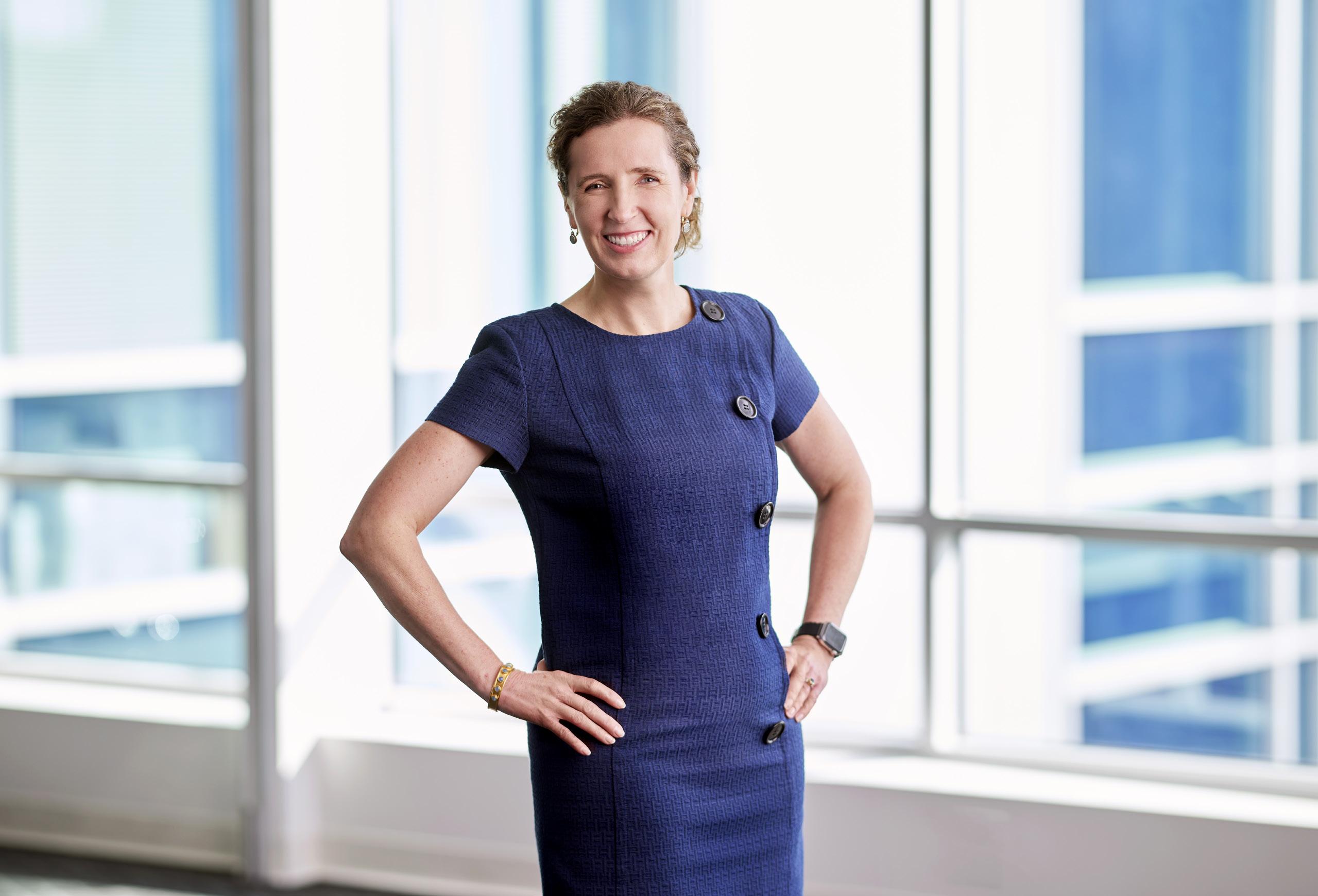
Over her long career, Dickerson has developed a passion for all things people. She’s created training programs, managed benefits packages, implemented wellness initiatives, and optimized talent acquisition processes. She joined Radian in 2021 to help the company enhance its strong culture by building a diversity, equity, and inclusion (DEI) road map and strengthening learning and development programs to drive employee engagement and retention.
The chance to work with like-minded leaders and make a difference together is
“Strong values and engaged leaders are imperative. The environment has to be a supportive one for people strategies to work.”
Mary Dickerson
FINANCE profilemagazine.com 39 PROFILE Q2/23
Mary Dickerson Chief People Officer Radian Group
Dave Moser
what attracted Dickerson to Radian. “When you do the kind of work that I do, you want to represent and advance a great company,” she says. “Strong values and engaged leaders are imperative. The environment has to be a supportive one for people strategies to work.”
At Radian, Dickerson found CEO Rick Thornberry and the executive team ready to champion programs, offer input, and encourage efforts to elevate HR initiatives to drive success at Radian.
Dickerson spent her first days, weeks, and months on the job learning Radian’s vibe and structure to inform her approach. She knows no two organizations are alike, and the best HR programs are custom fit to their company.
It’s something she’s seen time and time again throughout her career. The Ireland native studied economics in Cork and came to the United States for an MBA at St. Joseph’s University. A job at Wawa bankrolled her MBA, and when the convenience store’s leaders needed someone to run a training center, Dickerson stepped up.
Suddenly, the twenty-one-year-old student was teaching employees how to make sandwiches and interact with customers. “I saw that the training I provided helped people build confidence, and I loved the moments in which I could see them find new skills and achieve their potential,” she explains. A career in HR was born.
Over the next decade, Dickerson progressed through various insurance and financial services companies before taking on a pivotal leadership role at the Hartford, where she ran a division as its chief human resources officer for seven years. In leading all HR pieces, she learned to work consistently with one voice and style to keep all people strategies aligned with the insurance company’s brand to create a cohesive employee experience.
Pennsylvania-based Radian started in 1977 and trades as a public company on

the New York Stock Exchange as RDN. Its data-driven mortgage and real estate solutions power smart lending decisions, while its mortgage insurance affiliate, Radian Guaranty Inc., offers products which are specifically designed to help consumers with less than a traditional 20 percent down payment unlock the dream of homeownership and build financial security.
In 2021, Radian introduced a subsidiary known as homegenius, an ecosystem that uses data science, machine learning, and artificial intelligence to improve the residential real estate process for sellers, buyers, lenders, agents, and brokers.
Radian is known as an intelligent, savvy, trendsetting company. As its chief people officer, Dickerson is aligning her programs to fit that corporate persona. Under her leadership, the People team worked with LinkedIn to push out curated microlearning modules and embedded learning throughout every part of the employee experience.
Since early 2022, Radian’s nearly 2,000 employees have demonstrated their voracious appetite for the content by watching 180,000 videos and completing 10,000 courses.
Of course, benefits, compensation, and perks are important, too. For instance, Radian is making the homebuying process more affordable for its employees through its Homebuyers Perks program by offering benefits and assistance. The company also finds fun and innovative ways for employees to support community causes and programs they care about.
“Community programs are an important component because they help us make meaningful connections,” Dickerson says.
DEI anchors all these strategies as the company invests deeper into diverse recruiting. Her team doubled the number of employee resources groups, implemented a weeklong “Days of Understanding” initiative, highlighted DEI in revamped leadership programs, and hired a DEI director. They also set
targets around minority hiring and included related benchmarks in every employee’s list of annual goals.
Radian has already reached many of the goals and targets the team set. The company met its 2024 minority hiring goals in 2022, one of which was to increase the number of female candidates from 35 percent to 50 percent. It’s now pushing 52 percent.
Another goal was to have a voluntary turnover goal of less than 15 percent and currently it sits at 8.8 percent. As part of her job, Dickerson must present these stats to Radian’s board of directors. She’s excited, and perhaps a little nervous. “I guess they’re going to tell me it’s time to change the targets,” she jokes.
But it’s undeniable that her methods are working. In addressing Radian’s 2021 performance, CEO Thornberry shared that the company had income of $600 million as its mortgage insurance unit, Radian Guaranty, wrote the second-highest level of new mortgage insurance in company history.
Those facts, he said, reflect strong growth in housing and real estate markets around the nation, ongoing demand for what Radian does, and the commitment of one talented team.
“Community programs are an important component because they help us make meaningful connections.”
FINANCE PROFILE 40 Q2/23
Mary Dickerson
The Change Agent

Thirty years into his career, Citigroup’s Johnbull Okpara is focused on mentorship and making a difference in the lives of others
By Donald Liebenson
Photos by Peter Garritano
Scan the QR code to be taken to the web story. FINANCE profilemagazine.com 41 PROFILE Q2/23
Johnbull Okpara, chief accounting officer and controller at Citigroup, recalls a defining moment from earlier in his thirty-year-career. He was working at American Express and doing pretty well—or so he thought.
The CEO had organized a lunch meeting for high-potential employees, and he asked Okpara what feedback he was getting from his own team. “I told him that I had not received any constructive feedback, and that everybody said I was doing a great job,” Okpara recalls. “On top of that, I had recently been promoted. He said, ‘Listen, if people are telling you that you are perfect, then they are lying to you, because if you were, you should be the CEO. Even beyond the CEO, perhaps retired already.’”
Feedback, Okpara says, is a gift. “I encourage young folks to seek feedback, take it on board, and leverage and work on it. I call it ‘feed-forward,’ which translates to, ‘What am I going to do next time?’ To me, that is much more important than ‘What did I do wrong the last time?’”
Born and raised in Nigeria, Okpara is the middle child of nine. This, he says with a laugh, might account for his competitiveness. He credits his parents for his work ethic and intellectual curiosity. His father was a professional photographer. His mother, a lifelong chef, ran the most popular restaurant in town. “She was up at 5:00 a.m. and went to bed past midnight,” he says.
Okpara devoted himself to his studies. “Studying was my escape from working in the restaurant,” he jokes.
Initially he earned a degree in applied chemistry. “As a photographer, my dad had a stint with Shell Oil early in his career,” he says. “The degree was supposed to position me very well to work in the oil industry as an engineer.”
Enter Arthur Andersen. Fairly new to Nigeria, the global accounting and consulting firm focused its recruiting on candidates who came from a variety of disciplines, but had one thing in common: They were the best and the brightest. “They had a broad array of career paths in consulting, accounting, tax, and advisory, and offered the best training and development,” Okpara says.

“I’m voracious when it comes to learning. An organization is like a house, and the more rooms in that house you’re familiar with, the better prepared you are to one day be the keeper of that house.”
Johnbull Okpara
FINANCE PROFILE 42 Q2/23


FINANCE profilemagazine.com 43 PROFILE Q2/23
Johnbull Okpara Chief Accounting Officer and Controller Citigroup


“I encourage young folks to seek feedback, take it on board, and leverage and work on it. I call it ‘feed-forward,’ which translates to, ‘What am I going to do next time?”
FINANCE PROFILE 44 Q2/23
Johnbull Okpara

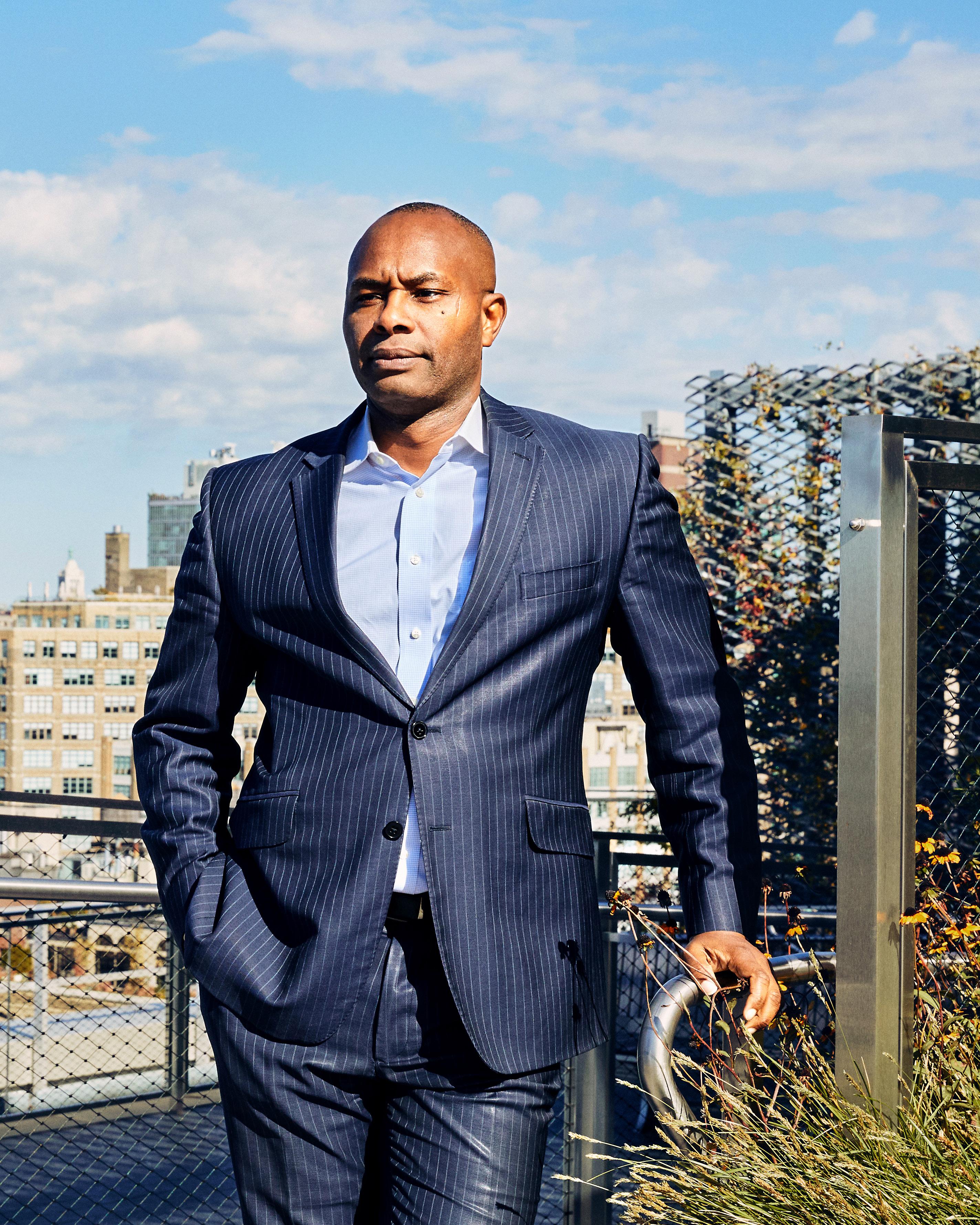
FINANCE profilemagazine.com 45 PROFILE Q2/23
house, and the more rooms in that house you’re familiar with, the better prepared you are to one day be the keeper of that house. My intellectual curiosity has led me to do different things.”
Bold thinking creates lasting change
The company also had a very competitive recruiting process, Okpara adds, which appealed to that side of his personality.
Joining Arthur Andersen was foundational for Okpara’s career. “I was not a natural accountant,” he recalls. “I remember arguing with one of my instructors at our induction training about debits and credits. I could not see why debits were a good thing for ledger balance sheet and asset perspective when it is a bad thing for my bank account. Suffice to say, it is now very clear.”
His experience at Arthur Andersen in Lagos, Nigeria, and subsequently in New York, he says, was instrumental in building his foundation in accounting, financial statement analysis, business writing, client communication, and other areas.
While working at the company, he obtained his Certified Public Accountant (CPA) qualification in Pennsylvania and earned his MBA at New York University’s Stern School of Business, majoring in finance and management.
Okpara joined Citigroup in November 2020. His previous role was head of financial planning and analysis for Morgan Stanley as well as CFO for the infrastructure groups. Other career milestones include stints with Ernst & Young’s Business Risk Services practice and American Express, where he spent a combined six years in New York and about four years in London in various financial management and controller roles.
He then returned to the United States, where he oversaw M&A related activities at American Express and then served as a deputy controller at Capital One.
“I’m voracious when it comes to learning,” Okpara says. “An organization is like a
As chief accounting officer and controller, Okpara is the guardian of Citi’s galaxy, overseeing financial and regulatory reporting, valuation of financial instruments, accounting policy, and transformation of finance operations. He also leads the CFOs of most of Citi’s international markets, insurance risk management, business unit controllers, and internal controls management including Sarbanes-Oxley Compliance, credit controls, and corporate accounting.
But he considers mentorship to be among his most important roles. He leads a team of more than three thousand individuals and oversees approximately five thousand people in total. “I take the most pride in hearing that I have made a difference in someone’s career or in their personal situation,” he says.

As far as work/life balance, Okpara views it like an investment portfolio: he seeks balance on average and in chunks over time, not necessarily daily or weekly. That’s how he is able to juggle his very busy work life and, along with his wife, Jacklyn, focus on their four children (who are all active student athletes).
Inside and outside Citigroup, Okpara strives to be a “change agent.” A few years ago, he served on the board of Alvin Ailey American Dance Theater, one of the world’s premier modern dance theaters. He is on the board of the Nigerian Higher Education Foundation as well as a Nigerian American foundation in his own name that focuses on healthcare screening. He has also been a member of the Executive Leadership Council, an organization committed to increasing the number of global Black executives, since 2014.
Okpara is a subscriber to the two R ’s: relationships and results. “I like to get to know the people who work with me,” he says. “One of the first things I did when I got here was to undertake an organization redesign. I did a survey of who’s who and what they did. It’s important to put people where their strengths are maximized. I am anchored in making everything and everyone I work on and with better—including myself!”
Kristen Blush
“I take the most pride in hearing that I have made a difference in someone’s career or in their personal situation.”
© 2022 PricewaterhouseCoopers LLP. All rights reserved. Congratulations to Johnbull Okpara for his leadership and achievements. www.pwc.com
Johnbull Okpara
46 Q2/23 PROFILE FINANCE
It’s Not About Technology. It’s About People.
Endré Jarraux Walls integrates governance and cybersecurity directly into business culture, providing individuals with the tools they need to protect against cyberattacks
 By Frank DiMaria
By Frank DiMaria
A popular meme that circulates in IT security circles illustrates the vulnerability of a network by depicting a medieval knight clad in armor with an arrow protruding from his visor’s eyehole, the one place that can’t be protected, or the knight couldn’t function.
“That arrow represents your users making a mistake. The biggest security events that have occurred over the last ten years, 98 percent had a user genesis, where a human being was being a human being and made a mistake,” says Endré Jarraux Walls, executive vice president and chief operations and technology officer at Customers Bank, a community-based, full-service bank operating in Pennsylvania, New York, Rhode Island, New Hampshire, Massachusetts, and New Jersey.
Five years ago, cybercriminals attacked companies and their networks. Today, they attack individual employees, using a range
Scan the QR code to be taken to the web story. FINANCE profilemagazine.com 47 PROFILE Q2/23
of social engineering tactics to induce users into divulging sensitive information, be it personal or business. Walls—referring to the IT professional himself, not the cybersecurity barrier—mitigates such attacks and protects banks, customers, and their assets by managing risk and overseeing governance and compliance and developing security operations.

Banking customers have an expectation that their institutions are consistent and reliable stewards of their personal information, an expectation that Walls considers very reasonable. This requires banks to “walk the walk.”
Walls integrates governance and cybersecurity directly into business culture, focusing on individuals rather than implementation and details. At its core, managing cybersecurity requires educating people and arming them with adequate tools to protect against cyberattacks, he says.
“It can’t be about the technology; it has to be about the people. Security now has to
be about personal self-awareness and the ability of people to control their own data, technology, and interaction with people from the outside world that might have nefarious intents,” Walls asserts.
Walls came to Customers in 2018 from Ricoh where he served as a managing partner for global advisory services. Before transitioning into his latest position in October 2022, he was Customers’ chief information security officer and an EVP. As CISO, Walls and his security team created a portfolio of consumable security products that allow customers to bank seamlessly without security risks.
“They reduce the amount of friction in the authentication process and make it easier for people to log in without having to remember twenty passwords using biometrics,” Walls says.
Currently, seven SVPs report to Walls, who relies on the 80/20 percent ratio as part of his leadership style: listening 80 percent of the time and teaching and sharing insight only
“Hackers are their own industry. They do this for a living. The wise security practitioner must keep this in mind.”
FINANCE PROFILE 48 Q2/23
Endré Jarraux Walls

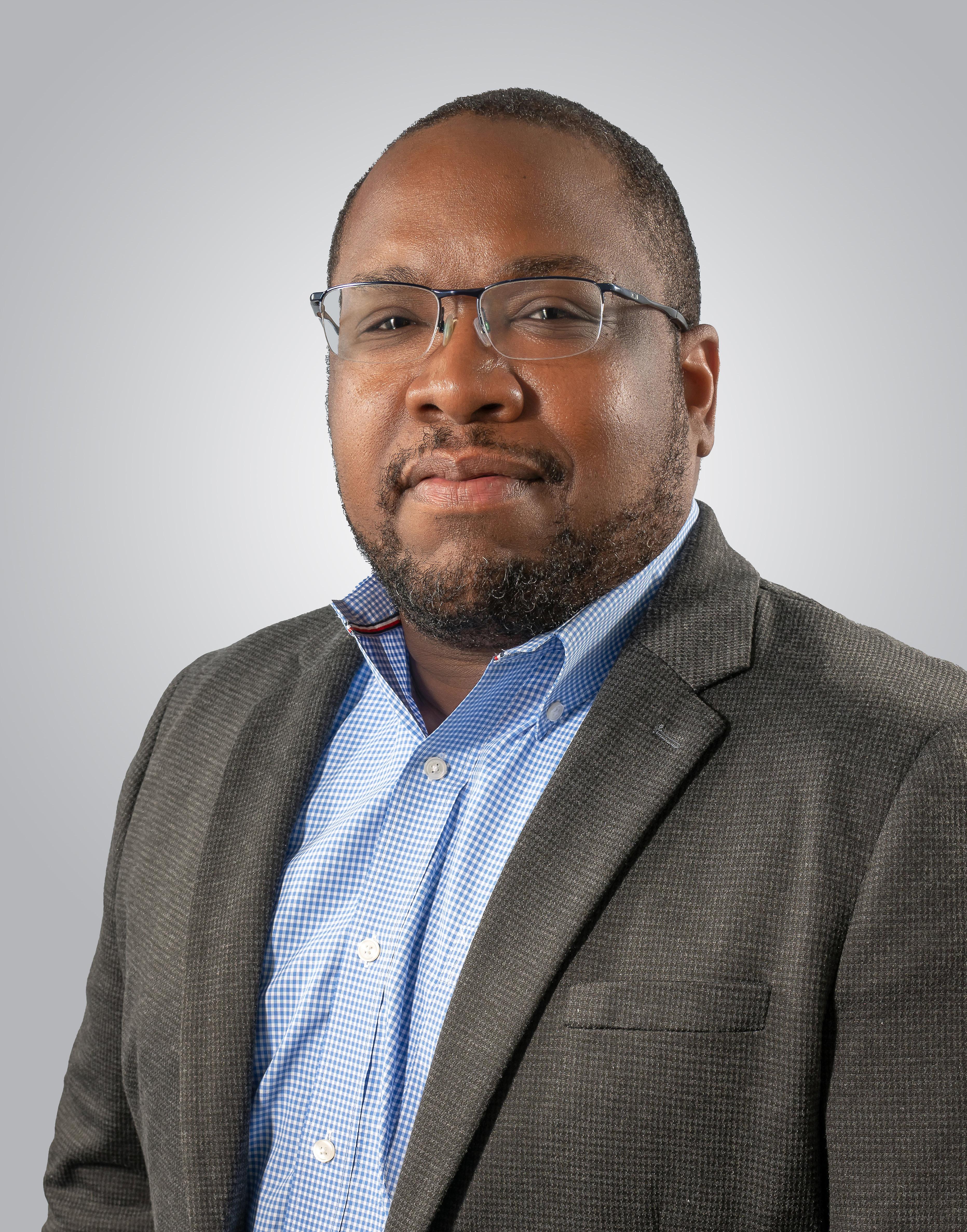 Tony Mercado
Endré Jarraux Walls
Tony Mercado
Endré Jarraux Walls
FINANCE profilemagazine.com 49 PROFILE Q2/23
EVP and Chief Operations & Technology Officer Customers Bank
IT INTEGRATOR RESELLER INNOVATORS
We focus on bringing the best technology & solutions to our clients






20 percent of the time. As a leader he feels his role is to ensure that his direct reports have the necessary tools and support to achieve their strategy, making him accountable to them. It’s incumbent upon him to share Customers’ overall business strategy with his direct reports so they understand how their plans fit in.
At PhillyCom, Inc., we strive to be the market leader in delivering SaaS, Artificial Intelligence, Infrastructure and Security Solutions by providing our clients with informed alternative choice products, trusted advisory account management, and world class engineering services.
SECURITY | INFRASTRUCTURE
SERVICES
130 West Main Street, Ste 144-302 Collegeville, PA 19426
(610) 212-4174
www.phillycom.net
“The 80/20 percent rule is important because your job, especially at C-level, is not to micromanage, not to tell people how to do their job, even if you are a subject-matter expert in something as a C-level executive,” Walls says. “You shouldn’t be dictating. We shouldn’t be in the weeds. You should have people in your organization that you trust enough to lead and be accountable for a strategy. Your job is to hold them accountable.”
Typically, the relationship between banks and banking regulators is viewed as adversarial. Not so at Customers. Good banks, Walls says, consider banking regulators their partners. “We don’t look at them as eyes over our shoulders [but instead as] people who help us ensure that the controls and things we are doing and putting in place are not just sufficient but exceed the standards we have in our industry,” he explains.
Walls has formed relationships with regulators, solidifying Customers’ reputation as an institution committed to protect its customers’ and employees’ data. Customers was one of the first banks in the nation to offer its commercial institutions an instant
payment rail, allowing them to transfer large sums of money.
To implement this technology, Walls worked closely with regulators to gather feedback during the process without compromising on security. “This is a solid example of how we’ve leveraged our regulatory relationship to create and innovate in an industry that does not create and innovate very often,” he says.

Walls has a cybersecurity mission, but knows that others have a counter mission. “Hackers are their own industry. They do this for a living. The wise security practitioner must keep this in mind,” Walls says. The difference is the cybercriminal only needs to be correct one time to cause a breach. The security team must never be wrong.
The key to cybersecurity in the future is implementing strong internal hygiene, while preparing people to tackle those challenges that create a lack of security. Walls advises institutions must blend good technical discipline, solid data hygiene, and strong training programs to mitigate human influence that can cause security breaches.




“It can’t be about the technology; it has to be about the people. Security now has to be about personal self-awareness and the ability of people to control their own data, technology, and interaction with people from the outside world that might have nefarious intents.”
Endré Jarraux Walls
50 Q2/23 PROFILE FINANCE
PhillyCom Inc. is a leading consulting and technology integration company serving Pennsylvania, Delaware, and New Jersey. We focus on bringing “Best of Breed” technology and solutions to clients by combining our broad spectrum of technical knowledge and a deep comprehension of your business values in order to drive the right solution.
PhillyCom, Inc. Technology. Integration. Excellence. Est. 2011
MANAGED
Trust and the Treasury

Stephen Kincaid attributes his effective leadership at Walker & Dunlop to an allinclusive résumé and the mutual faith he builds with stakeholders
By Billy Yost

Scan the QR code to be taken to the web story. FINANCE profilemagazine.com 51 PROFILE Q2/23
Stephen Kincaid came to Walker & Dunlop nearly sixteen years and six promotions ago. He’s done it all, rising from a cash accountant position to his current role as vice president and assistant treasurer.
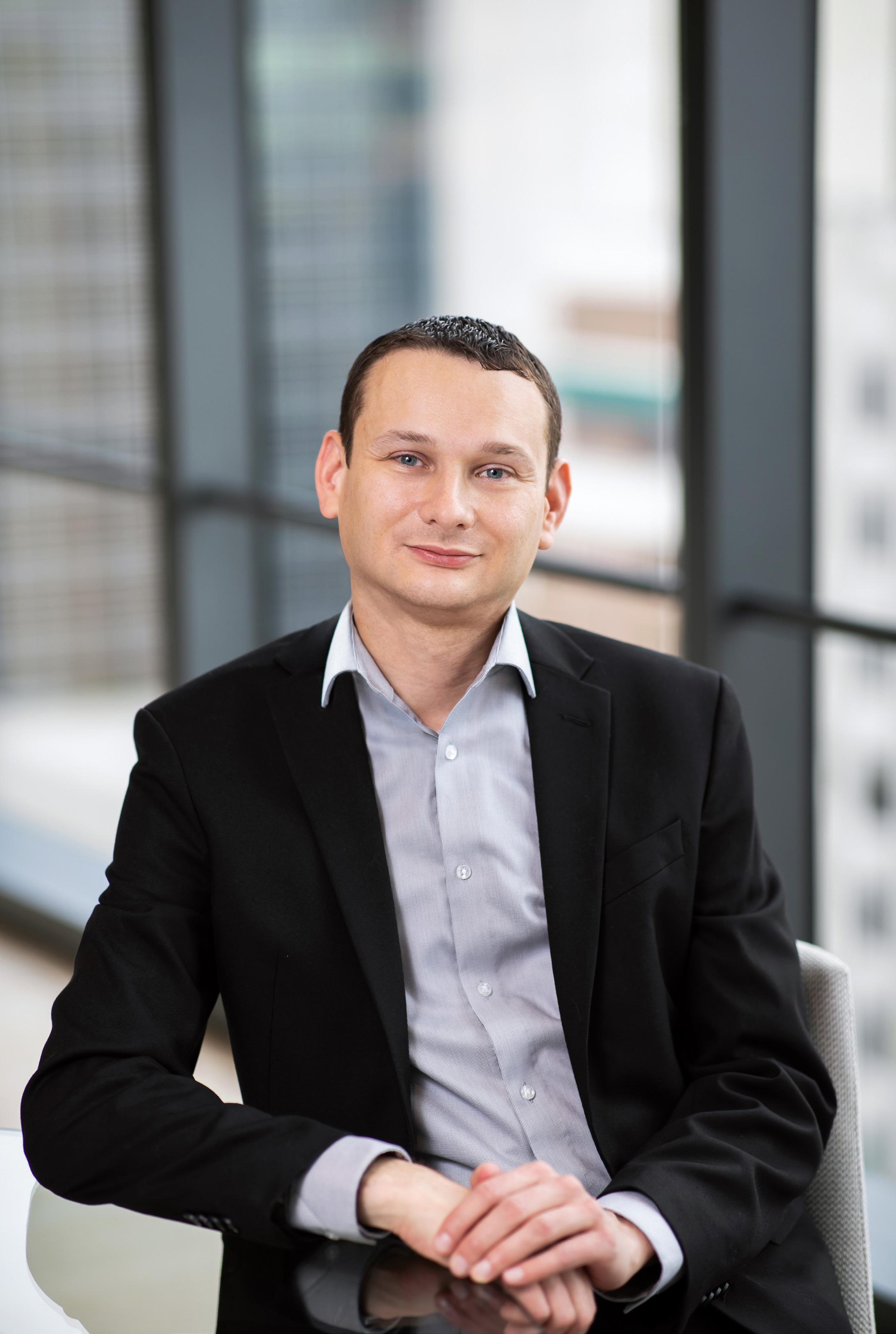
“I feel like I’ve had the chance to work on just about everything including treasury, which has always been my bread and butter,” Kincaid says. “Doing all of these roles has

FINANCE PROFILE 52 Q2/23
Stephen Kincaid VP and Assistant Treasurer Walker & Dunlop Courtesy of Walker & Dunlop
really given me a better appreciation for what my team does. I don’t think it’s fair to ask people to do something that you yourself don’t understand how to do.”
It makes sense, then, that Kincaid values trust above all when it comes to his own leadership. He knows the challenges of virtually every role related to his own function, and the VP says the best leaders he himself has had are the ones he implicitly trusted the most.
He hopes he’s earned that same trust among his team. Given the continuing expansion of Walker & Dunlop through multiple acquisitions, he’ll continue working to earn that trust among newcomers and recent additions to the financial services company.
EYES ON THE DASHBOARD
As Walker & Dunlop continues to grow, so too has the need to centralize the treasury function.
“A centralized treasury is critical to ensure visibility across all of our banks, our accounts, and most importantly, our cash flows,” Kincaid explains. “With each acquisition, we get a new team and a group that comes along with their own methodology and strategy. My role here is to gather all that
information and develop one strategy management system that enables us to see all of our transactions and cash flows, and to provide insight and strategy for Walker & Dunlop and our cash.”
Kincaid says leadership at the organization has been focused on technological advancement and digital transformation, committing resources to build out a truly forward-thinking finance and treasury function. It’s part of the reason he’s stayed so long. It can be easy for a company as large as Walker & Dunlop to forget that financial functions are the backbone to any successful company, but that’s never been the case during Kincaid’s tenure.
The VP’s mark on the treasury function will be long-lasting. He’s spent the past four years building out enterprise software Kyriba’s ecosystem and ensuring it can perform to its highest standards. Kincaid says he utilizes a number of traditional dashboards to monitor global cash balances in each of the company’s banks, but that wasn’t enough for the treasury veteran.
“I’ve gone a step further because we are a company that has a significant number of transactions that we are processing every

day,” the VP explains. “A lot of those transactions are coming across from our loan servicing team, so I’ve created custom dashboards to help me gain better insight into those transactions.”
Kincaid is immediately notified when a returned payment is received. He also created a dashboard to notify him of any problematic accounts, so that as the bank reports its balances and transactions throughout the day, his dashboard is updated in real time. These are all tools that help the finance team act more proactively, letting it know if it needs to get in contact with a bank before any potential issues arise.
TRUST AND ADVOCACY
Another reason that Kincaid has remained with Walker & Dunlop is the company’s continuing build-out of its commitment to diversity and inclusion. Kincaid was one of the first employees to join the company’s new LGBTQ+ employee resource group, a group that has grown to between fifty and sixty members and allies.
“I’m proud of how the company is embracing DEI. Our leadership constantly wants to learn more about how we can enhance our efforts,” Kincaid explains. “I’ve heard some amazing conversations and questions that highlight our commitment here.” Walker & Dunlop has invested $1 million in partnerships and organizations that champion DEI efforts, as well as participating in the Corporate Diversity and Gender-Equality Indexes.
That increasing advocacy has been important for Kincaid as both an individual and as a leader of teams. The VP says that it’s imperative to understand his team not just as a collection of professionals, but as people whose lives exist outside of their organization.
“A centralized treasury is critical to ensure visibility across all of our banks, our accounts, and most importantly, our cash flows.”
FINANCE profilemagazine.com 53 PROFILE Q2/23
Stephen Kincaid
“I think it’s important for leaders to step back and remember that these are people,” Kincaid says. “Then you can lead with empathy and compassion. When you do that, trust falls right into place. These are critical skills of an effective leader and one I take to heart.”
The executive also says that he charts his own success by that of his team. Having worked in so many of the roles that his team now occupies, he’s able to see their challenges and their victories. He gauges his own effectiveness by his team’s willingness to come to him with the challenges they’re facing.


“I think we have a great relationship,” Kincaid says. “When you take the time to build those relationships, everyone is able to do their best work. That makes me a better leader and, I hope, makes people on my team feel heard and understood.”
The challenge to build those relationships will only continue to grow as Kincaid continues to rise in the organization and Walker & Dunlop continues its expansion. At present, the company has nearly 1,500 employees across every major US market, but given the company’s acquisitional activities, that will likely continue to rise.
Whether he’s there for another fifteen years or leaves tomorrow, Kincaid has left an indelible mark at Walker & Dunlop.
“I think it’s important for leaders to step back and remember that [employees] are people. Then you can lead with empathy and compassion.”
Stephen Kincaid
Optimize Liquidity Reduce Risk Unlock Growth 2,000+ Clients $15 Trillion Payments Annually 1,000+ Banks Connected 1 Million+ Bank Accounts 2022 PEAK PERFORMER STEPHEN KINCAID Walker & Dunlop PEAK PERFORMER CONGRATS TO PNC’s powerful treasury management platform combines innovative end-toend technologies and guiding expertise. We’ll work with you to help you optimize working capital, achieve faster, more secure transactions, and take advantage of data-driven insights. Unlock new potential for your company and your customers’ experience. PNC and PNC Bank are registered marks of The PNC Financial Services Group, Inc. (“PNC”). Bank deposit, treasury management and lending products and services are provided by PNC Bank, National Association, a wholly owned subsidiary of PNC and Member FDIC ©2022 The PNC Financial Services Group, Inc. All rights reserved. CIB TM PDF 0922-092-2121501 Learn more at pnc.com/treasury
your business and your customers’ experience. –FINANCE 54 Q2/23 PROFILE
Drive
STRATEGY
experts share their actionable insights for guiding company growth and success David Klein, Spirit Airlines P56 Jamie Loch, Digi International P59 Brian Scheall, IMG Academy P61 Lauren Mastro, AVI-SPL P64 John Sapp, Texas Mutual Insurance P67
Subject-matter
Building a Foundation
Spirit Airlines Senior Director of Talent David Klein opens his playbook to reveal what goes into attracting, developing, and retaining the best workforce in the industry
By ZACH BALIVA Photos by MELODY TIMOTHEE
Working in HR, David Klein has gone from worldwide TV retail to the nation’s largest cruise line to a major airline. Through it all, the leader has made himself into the kind of vital strategic partner business leaders look to for dynamic results. Klein’s playbook is simple: he takes calculated risks, creates structure, reinvents processes, embraces challenge, and looks to make a broad impact by building diverse teams. By following these steps, he’s integrating HR, building culture, and elevating the team member experience at Spirit Airlines.
TAKING CALCULATED RISKS
After graduating with a degree in psychology with a minor in business, Klein wanted to combine his interest in people with a passion for entrepreneurial thinking but wasn’t sure exactly how. He discovered the world of industrial and organizational psychology and enrolled in West Chester University of Pennsylvania’s Master of Arts program. It was the right move.
“I started to see how processes could alter and improve behavior and attitudes in
the workplace, and I’ve carried those lessons throughout my entire career,” he says.
In the second year of Klein’s master’s program, he was asked to support the study of a national bread company suffering from major absence issues. They interviewed leaders and employees to develop a plan to identify root causes and address the issue. The project presented the chance for Klein to see the results of his efforts on a business and people, and further demonstrated that he was on the right career path.
CREATING STRUCTURE
Like many HR leaders, Klein has learned what makes him tick. His top five strengths on the CliftonStrengths 34 are communication, discipline, arranger, includer, and maximizer. He likes creating and implementing a solid foundation teams can build upon. “Structure is very important,” he says. “But I don’t like being confined to structure—I like creating holistic pathways to structure.”
Klein spent nearly ten years at QVC, where he led one of the most successful change initiatives in company history and ultimately served as director of human resources. He then went to Carnival Cruise Line. As director
of talent and learning, he developed and introduced processes to develop and retain more than forty thousand shoreside and shipboard employees These efforts covered initiatives for team members from sixty-six nationalities on twenty-six ships.
REINVENTING PROCESSES
Working across diverse industries like media, travel, and hospitality gave Klein the opportunity to import best practices and bring a fresh perspective to each new challenge. He first joined Spirit Airlines in 2019, where he now oversees the Spirit Talent Center. In this role, he is on a mission to reinvent how the company attracts, engages, and develops employees.
At the time, Spirit was at the top of a growth cycle as the company had been adding dozens of planes, multiple destinations, and hundreds of employees each year. In 2020, the airline placed a massive order for 150 Airbus aircraft.
As he came to an innovative company in a notoriously traditional industry, Klein looked share his vast experience and expertise. “Large organizations can be siloed, but I wanted us working cross-functionally on a
STRATEGY PROFILE 56 Q2/23
Scan the QR code to be taken to the web story.
David Klein Senior Director of Talent Spirit Airlines

“People haven’t yet discovered Spirit as a great employer unless they happen to know someone who works here. But we are proud that the industry is beginning to see what we’ve known all along: that Spirit truly is a special place.”
DAVID KLEIN
profilemagazine.com STRATEGY 57 PROFILE Q2/23
daily and even hourly basis,” he explains. “I’ve always worked in guest-facing industries, and it is this cross-functional integration that helps us create an experience that enables our team members to create an amazing guest experience.”
With that in mind, Klein set out to revamp talent acquisition, talent management, talent development, and team member experience as an integrated talent cycle. In doing so, he emphasized two key areas— diversity and inclusion, and corporate social responsibility.
While he was busy reinventing processes, Klein also worked to build relationships and the HR brand across Spirit. He’s an approachable leader and self-described trash TV junkie whose open-door policy invites

and encourages feedback. “I hope people always feel comfortable coming to talk to me,” he says. “While the focus is driving exceptional business results, mixing in conversations about TV or personal passions leads to lasting and authentic relationships which fuel open dialogue, sharing of ideas, and innovation.”
EMBRACING CHALLENGES
Just as Klein and Spirit were gaining momentum, the COVID-19 pandemic forced the company and its entire industry to a halt. HR used the foundation of trust that Klein and others had built to have difficult conversations and launched a pulse survey to track needs related to well-being, performance, inclusion, benefits, and compensation.
Spirit used the survey results and met the moment by creating and improving initiatives like its leadership program and the Better Spirits Fund, which offers financial assistance and travel benefits for those facing financial or family hardships.
MAKING AN IMPACT
The hard work is paying off. In early 2022, LinkedIn recognized Spirit Airlines as one of the top employers in travel and hospitality. For Klein, it was validation of his approach. “People haven’t yet discovered Spirit as a great employer unless they happen to know someone who works here,” he says. “But we are proud that the industry is figuring out what we’ve known all along: that Spirit truly is a special place.”
“Structure is very important. But I don’t like being confined to structure—I like creating holistic pathways to structure.”
DAVID KLEIN
STRATEGY PROFILE 58 Q2/23
Driving Confidence
By JOSEPH KAY
Jamie Loch learned his first lessons in business on the baseball field. As a child, he was a talented and devoted player, and was drawn to the unique team dynamic of the game. His coaches made it clear that the meaning of baseball went beyond records and runs: one coach, he recalls, spent an entire practice session each season teaching his players how to properly shake hands.
“Those are life skills,” he says. “I am partial to believing that baseball can best mimic the world. Coaches have so many opportunities to influence how people can see the world, and I had great coaches who were extremely influential in challenging me into the man I wanted to become.”
Today, the game still provides a rich framework for his leadership practice. Loch currently serves as senior vice president, treasurer, and CFO at Digi International. He oversees customer operations, human resources, investor relations, and sales.

Headquartered in Hopkins, Minnesota, Digi International provides Internet-ofThings (IoT) devices and management solutions like cellular signal routers, singleboard computers, and the professional services that integrate them. The company was founded in 1985 to produce connectivity devices for PCs; after going public in 1989, it increased its product offerings and began a series of acquisitions. Today, it continues to lead industrial IoT developments in a variety of settings, including public transit, energy, and retail.
After studying economics (and playing varsity baseball) at Carleton College, Loch joined Ernst & Young as an auditor. He also took CPA classes, eventually moving into financial planning and analysis at Ovation Communications. Later, he joined a biotech start-up called Biothera Pharmaceuticals. By 2008, he was looking to manage larger and more complex processes. He wound up at Honeywell, where he got started in operational management: growing sales
“We’re looking at how we can maximize our time better and leverage technology platforms to take that repeatable work off an individual’s desk, allowing them to be more dynamic, more thoughtful, and more mindful.”
JAMIE LOCH
Scan the QR code to be taken to the web story. Tartila/Shutterstock.com STRATEGY 59 PROFILE Q2/23 profilemagazine.com
At Digi International, Jamie Loch draws on lessons learned in baseball to advance a culture of caring; he also leverages technology to streamline workflow
off an individual’s desk, allowing them to be more dynamic, more thoughtful, and more mindful,” Loch explains. That effort feeds back into a dynamic, highly engaged workplace, where people like doing what they’re doing and are happy to do it for their colleagues. “You want to engage people at a different level,” he says. “You want your employees to feel valued for what they bring to the table, more than punching numbers into a spreadsheet.”
In his role overseeing human resources, Loch also supports his employees’ social and off-time pursuits. Work/life balance is a key part of that caring culture at Digi, although Loch prefers the term “work/ life integration” to describe a sense of wholeness and fulfillment that supports people in the workplace as well as outside of it. Those engagements also help employees develop their personal brands, which Loch encourages throughout the company.
A shared passion for success.
You deserve a partner who shares your vision. One with deep industry expertise and a consistent commitment to your business.

BMO’s Commercial Banking team will be with you every step of the way. Whatever your business goals, we’ll work with you to help you succeed.
bmoharris.com/commercial

territories, restructuring business units, and testing textbook finance against the realities of a massive international corporation. “That’s where I really cut my teeth on being that real operational partner in a finance role,” he reflects.
This experience also positioned him well to contribute at Digi. Loch was excited not only about the company’s product (he loves his own smart home) but also about the fact that he’d found a people-centered workspace where he could grow and lift up others.
“It’s a very collaborative and personal space,” Loch explains. “Caring is one of our core cultural imperatives. I think that gives a great example of that culture; there’s a lot of passion, and a real commitment to driving results.
“When you bring all that together, you’re not in the meat grinder—you’re not a number, you’re cared about as an individual,” he adds. “At the same time, there are big expectations.”
One of his primary directives has been to streamline and automate the routine tasks within his organizational units. With demand for Digi’s products and services increasing in a tight labor market, this approach can increase both efficiency and engagement.
“We’re looking at how we can maximize our time better and leverage technology platforms to take that repeatable work
Loch himself centers coaching in his personal brand; he’s served as a youth sports coach for over fifteen years, and often considers the same tenets on the field and in the office. That means carefully considering how to support his team’s evolution—centering team success rather than individual performance.
“When you make an error in baseball, the game stops, and as it’s resetting, you can feel that everybody knows. There’s no getting around it,” he explains. “How you respond to that failure is really critical—how you’re able to reengage and drive confidence in your teammates that you’ll make the next play.”
When a team can reengage and drive mutual confidence, success follows, and the impact of errors fades away. It’s a key message in Loch’s coaching strategy, and he remains grateful for what his team has built. “I’m honored when people make the decision to join Digi,” Loch says. “It impacts so much of what they do that it really is humbling when people make the decision to join. I never want to take that for granted.”
“Caring is one of our core cultural imperatives. I think that gives a great example of that culture; there’s a lot of passion, and a real commitment to driving results.”
JAMIE LOCH
Banking products are subject to approval and are provided by BMO Harris Bank N.A. Member FDIC
60 Q2/23 PROFILE STRATEGY
BMO congratulates Jamie Loch and his notable accomplishments. As one of the oldest and largest banks in the US, we are proud to be a financial partner to Digi International.
Refuse to Lose
Brian Scheall combines his financial expertise with a competitive spirit and passion for athletic pursuits to succeed at IMG Academy
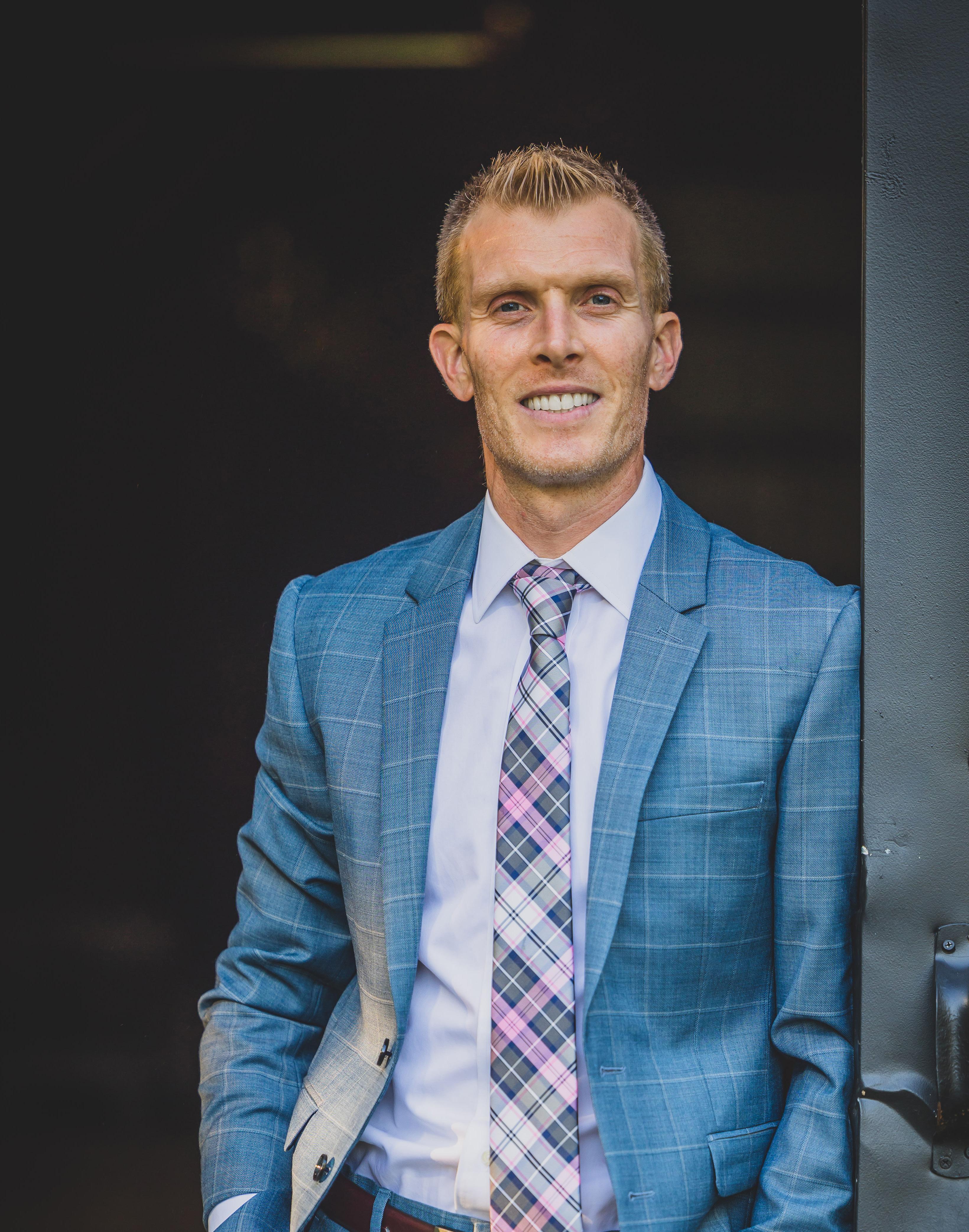 By MARCOS CHISHOLM
Brian Scheall CFO IMG Academy
By MARCOS CHISHOLM
Brian Scheall CFO IMG Academy
profilemagazine.com 61 PROFILE Q2/23 STRATEGY Brian Hart
Brian Scheall was born to compete. He grew up in a blue-collar family where his father hustled his way through graveyard shifts, while his mother left her job at a car dealership and took a leap of faith to start her own small business. Sacrifices were made. Dues were paid. Such was life in small-town Ohio.

Sitting back and wasting precious time was never an option for Scheall. Instead of playing video games all day during his childhood summers, he biked to the park with a friend and played basketball and soccer from sunrise to sunset. Sports not only fueled his fire—they did more for him than he ever imagined.
“I wasn’t into academics like others were, but I was given the freedom to pick up on life and learn and observe through experience,” Scheall says.
For Scheall, sports were his ticket to a better life. He earned a scholarship to play soccer at the University of Akron under head coach Ken Lolla, but soon discovered that hard work was not enough to guarantee his success as a varsity letterman. After a series of up-and-down performances, he lost confidence and questioned his future in the game.
Then he took a hard look in the mirror and had the breakthrough of a lifetime. “I struggled mightily early in my career and [in] things where I wasn’t mentally strong,” Scheall says. “But through the struggles, I found ways to redirect myself where I felt like I could control my own destiny.”
Since arriving at this moment of truth, Scheall has developed a mental tenacity that’s shaped his career on and off the field. “I would say that my development in the mental game was probably by far my greatest accomplishment when it came to having success on the pitch in soccer and also in the game of life,” he says.
In his final two seasons at the University of Akron he asserted himself as a consistent playmaker, and after graduation he stuck around campus to pursue his MBA and intern in the athletic department. He started to get a grasp of what colleges and teams do to market and promote themselves. And
STRATEGY Q2/23 PROFILE 62
Brian Hart
when the sports training and prep school IMG Academy offered him an opportunity to sell soccer sponsorships, he accepted and moved to Florida.
IMG Academy proved to be the perfect place for Scheall: his athletic background and competitive spirit have contributed to his success on the job. He broke company sales records in his first two years and caught the attention of CEO Sam Zussman, who promoted him to manager of executive projects.
In his ten years at IMG Academy, Scheall served as financial analyst and assistant finance director before he was named vice president of finance and accounting. Now, as the company’s CFO, he oversees a multimillion-dollar operating budget that includes $100 million for campus expansion projects alone.
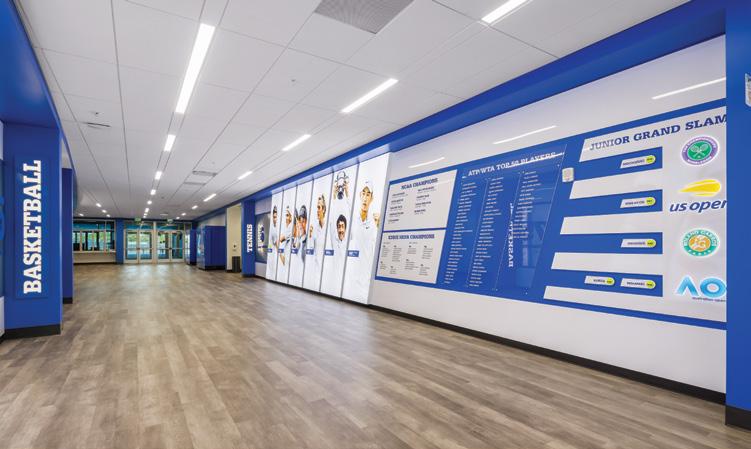



One of the biggest challenges Scheall must face in this role is navigating the financial complexities associated with IMG’s acquisition of Next College Student Athlete in 2021. As IMG Academy reimagines the athletic recruiting network’s business model, Scheall is taking steps to ensure that both brands remain on a path to profitability.



He’ll be the first to tell you there’s more to his job than crunching numbers. Even if he never fancied himself as a coach, he knows his leadership will make or break the success of his team and the merger.
“I think what you got to do is provide ownership and accountability, and you got to give them a voice. And it’s teamwork … you’re only as good as your weakest link,” Scheall says. “I have to trust that the department needs our leadership team and managers around this business on the subject matter experts in their specific area, and I need to trust that what they need is something that we need to invest in.”
No matter how busy Scheall gets, he remembers to carve out time for himself—and for him, that means doing marathons and triathlons. As usual, he’s a born competitor. After six months of training, he ran the NYC Marathon in two hours and forty-two minutes; he also finished fourth in the Rohto Ironman 70.3 Boulder triathlon.
There is one thing that Scheall is less confident he can overcome. With recent landmark changes in college athletics—such as the rise of name, image, and likeness deals—he fears for the future of his industry. That’s not to say, however, that he doesn’t have a plan.
“Any CFO [working in sports], you’re going to have to be able to adapt,” he says. “You have to be strategic. You’re going to have to understand what the opportunities are. You have to pick them out ahead of time and be proactive. Your yields are going to get passed up too fast.”
“I struggled mightily early in my career . . . But through the struggles, I found ways to redirect myself where I felt like I could control my own destiny.”
Building Today for a Better Tomorrow! East Campus Athletic Facility 5391 Lakewood Ranch Blvd. North, Suite 200, Sarasota, FL 34240 941.954.1599 WWW.TANDEMCONSTRUCTION.COM profilemagazine.com STRATEGY 63 PROFILE Q2/23
BRIAN SCHEALL
The FutureForward Counsel
By REBECCA RAKOWITZ
Scan the QR code to be taken to the web story. STRATEGY PROFILE 64 Q2/23
As AVI-SPL brings technology and construction into the future, VP of Legal Lauren Mastro focuses on empowering and evolving her team alongside it
The Museum of the Future in Dubai is an architectural feat and technological triumph where visitors explore interactive, futuristic exhibits showcasing the possibilities of the forthcoming decades. Dozens of international employees from AVI-SPL, the world’s largest provider of collaboration technology solutions, came together to make these multisensory experiences possible. Lauren Mastro, vice president of legal, is one of them.
“Seeing the end project was pretty incredible,” Mastro says. “It’s amazing what our employees are able to do.”
Mastro enjoys both these big-ticket deals and experiences and the typical rhythms of her day-to-day—reviewing and updating contracts, discussing risks and solutions with executives, managing outside litigation, updating policies and procedures, and protecting AVI-SPL’s intellectual property—which keep the video technology company on track and looking forward.
AVI-SPL sits at the crossroads of a somewhat undefined industry. It is not quite construction, not entirely audiovisual. Thus, putting Mastro’s JD into practice was not just a plug-and-play situation. She ultimately needed to create a new schema
Lauren Mastro VP of Legal AVI-SPL
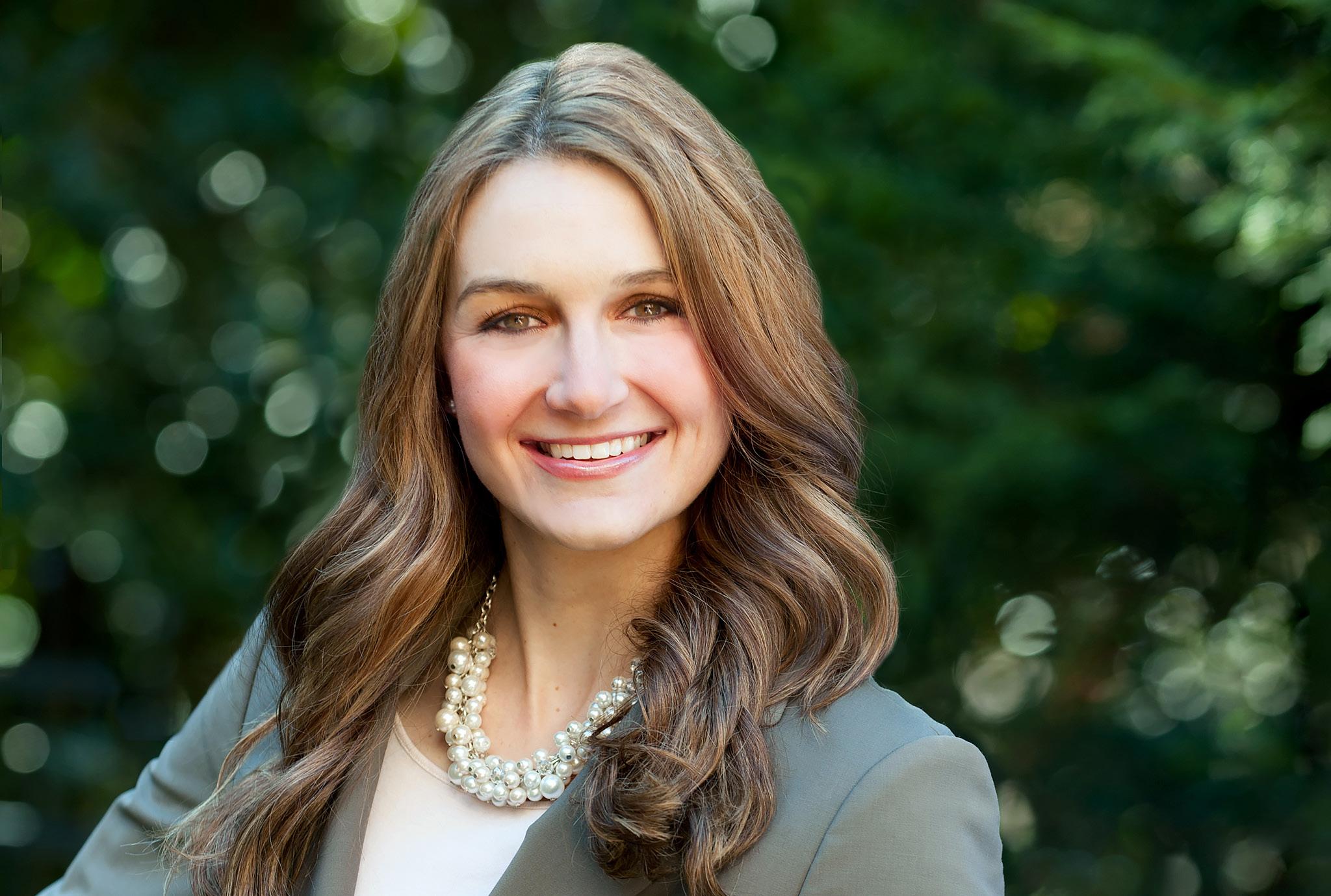
“I like the fact that what I do is not strictly legal. There is a lot of business acumen that you have to develop.”
STRATEGY profilemagazine.com 65 PROFILE Q2/23
LAUREN MASTRO
Marchet Butler
for navigating the legal world in such a unique area.
“There’s really no formal training that you can do other than just diving in and learning hands-on.”
Her bosses and colleagues were integral in making that dive successful, she says, and in helping her build a critical base of knowledge. They were a support system that she encourages all young professionals to search for and establish.
“I think the mentorship piece of it is really key in such a niche industry that changes a lot,” she says. “I know if I didn’t have the foundation I was given many years ago, it would be a lot more difficult now.”
Standing in a sort of middle ground is something Mastro enjoys, not only in regard to the industry and company but also in regard to her job.
“I like the fact that what I do is not strictly legal,” she says. “There is a lot of business acumen that you have to develop in order to protect IP and partnerships while also making sure the customer feels satisfied with the results.”
Perfecting that balance has no doubt played a role in the rapid expansion of AVISPL financially and geographically. Mastro estimates that when she started at the company more than a decade ago, AVI-SPL was making around $500 million a year, and she says they are now on pace for around $1.3 billion. Dubai is just one of many new international offices, including those in Canada, Hong Kong, Singapore, Switzerland, and Ireland.

Of course, with more offices come more employees, whom Mastro brings into the fold. She leads her growing team by stepping back so they have the opportunity to
step up. Clear communication and maintaining high expectations are tenets of her leadership philosophy.
“I know they’re on my team for a reason. I know they have the skill set to do very well in their job,” she notes. But while she makes it clear that she is there to support her team, she also stresses that neither hand-holding nor yelling is beneficial for anyone.
“It’s not going to be good for me, and it’s not good for you if I have to micromanage and be over your shoulder the whole time,” Mastro tells them.
It’s not necessarily intuitive for the VP to lead in this way. The self-described type A attorney says she learned to loosen the reins by leaning on her experience as a tennis player and captain growing up and in college.
“I took a lot of what I learned on the tennis court and have utilized it in my professional career,” she says. “I’ve learned to recognize the strengths some people have and put them forward, as well as the weaknesses that others have and help them improve.”
So when one person is a wiz at SharePoint and another has a keen handle on tax law, she lets their skills shine. And when someone needs a hand, she is quick to lend one.
It also doesn’t hurt to have the kind of colleagues Mastro has. At time of speaking, Mastro was a week away from her wedding and feeling nervous. These weren’t prenuptial nerves, she says, but rather an uncertainty about what it would look like to be away from AVI-SPL for the longest time in her tenure. But what eases that tension, she explains, and what will make it easier to unplug, is being surrounded by people she can trust. “I’m fortunate enough that I have those people,” she says.
“I’ve learned to recognize the strengths some people have and put them forward, as well as the weaknesses that others have and help them improve.”
ATTORNEYS AT LAW cohenseglias.com DC DE KY NJ NY PA Proud to partner with AVI-SPL 66 Q2/23 PROFILE STRATEGY
LAUREN MASTRO
Information Security Doesn’t Happen in Isolation
Beyond protecting Texas Mutual Insurance Company and its customers from cyberthreats, John Sapp educated members of the local community about information security
By NATALIE KOCHANOV
John Sapp’s innate curiosity set him on the path to a career in technology.
“Growing up, I always liked to know how things worked,” Sapp explains. “That translated into my mother sending me to a vocational high school, where I learned to write software. I started out working as a programmer, computer operator, and network technician, and I continued to learn and teach myself things along the way.”
Eventually, Sapp discovered his now specialty: information security. Today, as vice president of information security and chief information security officer at Texas Mutual Insurance Company, he applies his expertise to identify and protect against potential
Scan the QR code to be taken to the web story. STRATEGY 67 PROFILE Q2/23 profilemagazine.com
John Sapp VP of Information Security and CISO Texas Mutual Insurance Company
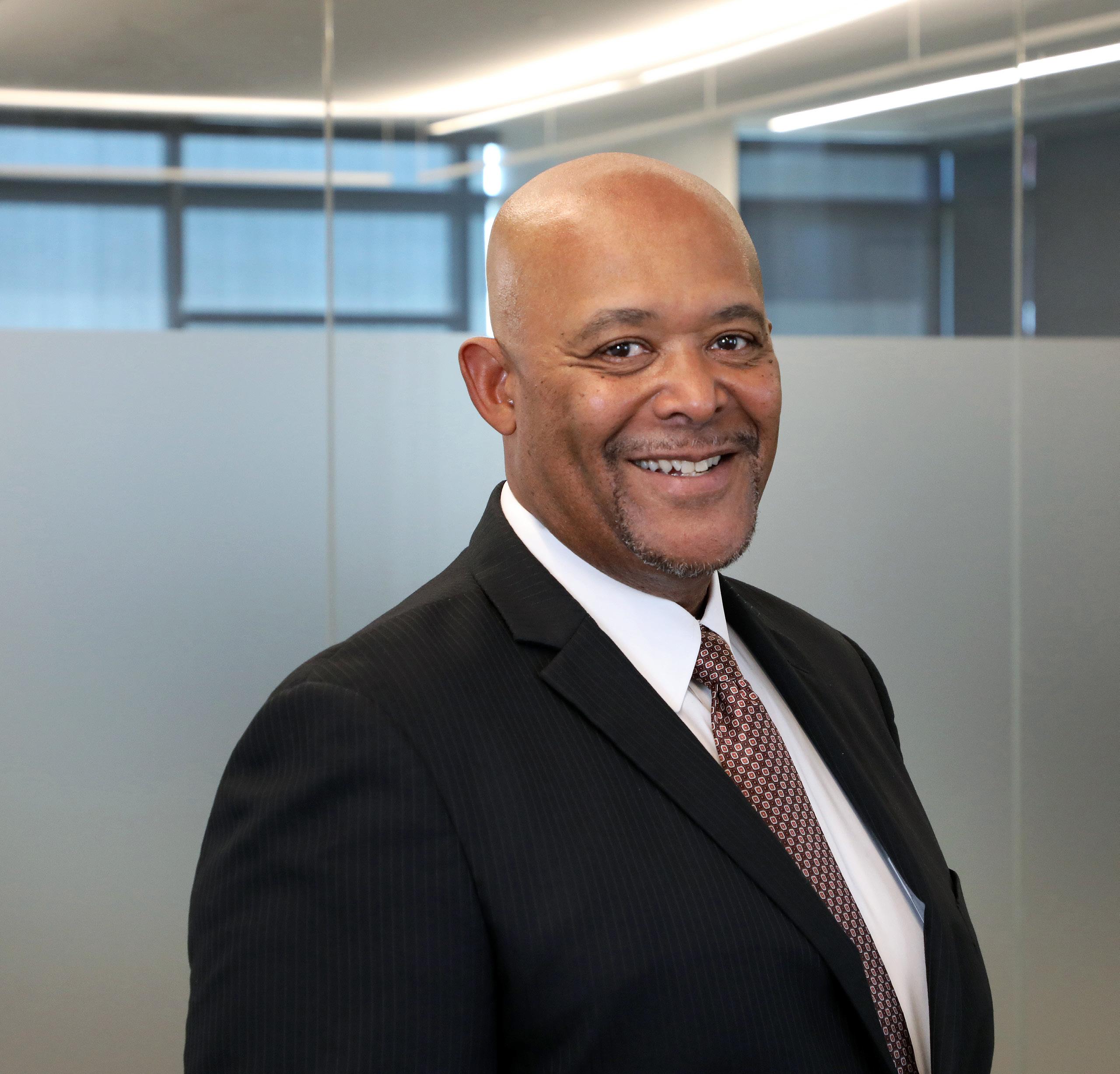
STRATEGY PROFILE 68 Q2/23
Jimmy Daus
cyberthreats to the workers’ compensation insurance provider. Furthermore, he seeks to empower his team within the organization— as well as the next generation of information security professionals out in the community.
“John is one of the great cybersecurity leaders in our industry. He places a heavy emphasis on building a culture based on trust and transparency, and that applies to his internal teams and extends out to his partner community,” says Natalie Foss, strategic account manager of CyberOne. “We are honored that John continues to partner with CyberOne on his security initiatives.”
Before coming on board at Texas Mutual, Sapp held roles in consulting, financial services, and biotech. He began to explore information security while at a Fortune 10 pharmaceutical company, as the internet was skyrocketing in popularity. “I started to learn and understand how to apply security principles to software and other things that I had worked on in the past,” he says. “My previous experience really helped me better understand information security.”
Sapp went on to join Texas Mutual as senior manager for security engineering amid the COVID-19 pandemic. Since stepping into his current role in September of 2021, he has developed a daily routine that involves staying abreast of an ever-evolving threat
landscape. “To understand what the current security risk is to the company, we first have to understand what the current threats are and what the current industry trends are,” he confirms.

In addition to following the latest technology and security news, Sapp maintains regular touchpoints with his team and with leaders throughout the organization to track progress toward achieving both companywide and more granular strategic goals.
“We have an enterprise objective of improving our security posture that speaks to the level of top-down support we get around information security,” he says. “It is one of those topics that our CEO and our board are very interested in because they want to make sure that we are doing the right things for the right reasons.”
One challenge in protecting the company and its customers has been the shift to a remote and subsequently hybrid workforce during COVID-19. “We had a number one initiative of providing secure access to the corporate network and internal software applications, so that our employees and contingent workers could get access to be able to do their job securely from whatever location they were working from,” Sapp says.
To that end, his team established a secure access service edge through the combined
“Cybersecurity—how it works and how you can utilize it to protect yourself—is a necessary life skill, and I want to do everything that I can to give back to the younger generation, who don’t really know what they’re going to be growing up into.”
STRATEGY profilemagazine.com 69 PROFILE Q2/23
JOHN SAPP
Securing Your Software Together
software is built secure from the start.
Securing software is no small task. That’s why Veracode was created. We help you easily integrate application security into your software development lifecycle, working with developers in the environments where they work with plenty of integrations and expert help readily available. With development secure from the start, you connect your security and development teams, ensuring compliance to policy.
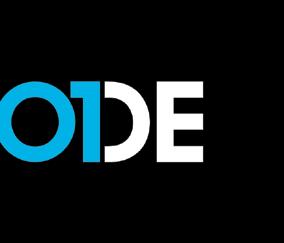
Our platform empowers you to have a holistic view of your security posture, benchmark your progress against peers in the industry, and meet your governance, compliance, and risk management needs
implementation of a secure web gateway, cloud access security broker, and cloud data loss prevention capability.
Sapp and his team have also focused on addressing the threat of malware, including ransomware. “We moved to a nextgeneration endpoint protection solution, to be able to protect against both known and unknown malware, and we enhanced it so that we would have twenty-four by seven by three-sixty-five monitoring, detection, and response capability,” he says. “Regardless of whether we have somebody on call, we have a managed service that provides us with that monitoring.”
Sapp highlights the importance of understanding Texas Mutual’s external attack surface as well. That means searching for vulnerabilities in the interest of resolving them before a cyberattack can occur. On the software front, Sapp turns to Veracode, an application security provider he has trusted since 2007.
“They’ve been a partner of mine at four different organizations because they are, point-blank, the leader in the space when
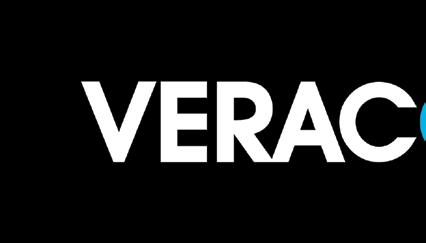
it comes to static and dynamic analysis,” he says. “They give us the capability to scan the software applications that we develop in-house and identify any weaknesses or security flaws that could by exploited by an attacker.”
As a leader, Sapp strives to empower his internal team by communicating his investment in their professional development and unique viewpoints. “Empowerment is probably the single most important component to me from a leadership standpoint because when a team feels like they have the ability to own something, you end up with a much better result from the services and products that you’re delivering to an organization,” he says.
Sapp adopts a similar mindset in the context of supporting the future of information security. He has a strong commitment to education, whether it’s teaching auditors how to translate their skills to the realm of cybersecurity or increasing awareness of technology careers among local high school and college students. In either case, he starts with what someone already knows and builds on that knowledge when explaining information security concepts to them.
In Sapp’s eyes, there is another benefit to sharing his information security expertise beyond securing the field’s pipeline. “Cybersecurity—how it works and how you can utilize it to protect yourself—is a necessary life skill, and I want to do everything that I can to give back to the younger generation, who don’t really know what they’re going to be growing up into,” he says.
In addition to offering children and teenagers the tools to protect themselves against cyberthreats, Sapp shares the same types of information with seniors at assisted living facilities and with community members of all ages through church groups and other organizations.
By meeting people where they are, Sapp is making a tangible difference in how his community thinks about information security. “It shows that you care about them,” he says of his efforts to give back. “That’s part of Texas Mutual as a whole. We are all about community—going out into the community and finding different ways to help people.”
“When a team feels like they have the ability to own something, you end up with a much better result from the services and products that you’re delivering to an organization.”
JOHN SAPP
veracode.com 70 Q2/23 PROFILE STRATEGY
We’re creating a world where
COMPANY
A look behind the scenes of company-wide initiatives and goals, acquisitions, and brand development
Brian Scaccia, SunPower Corporation P72 Heather Harper, Olaplex P75 Maneesha Bhalla, Designer Brands Inc. P77 Thiago Silva, Fivetran P79
Helping SunPower Shine
SunPower, Brian Scaccia
renewable energy revolution
By RUSS KLETTKE
The passage of the Inflation Reduction Act (IRA) in August 2022, with its consumer tax credits and rebates for clean-energy-related purchases and projects, bodes exceptionally well for all things related to renewable energy. And it may well generate synergies; for example, owners of electric vehicles (EVs) are far more likely to have solar systems on the roofs of their homes and garage, such as in California, where between 30 and 40 percent of EV owners have rooftop solar.
This is not lost on SunPower, a leading residential solar and energy services provider in North America. The company has been in business since 1985, and with advancing technologies, investments, acquisitions, and favorable legislation in pro-renewable states, it reports annual revenues in excess of $1.3 billion.
With 528 megawatt of solar systems installed in 2021—removing 14 million
metric tons of carbon from atmosphere— the company is going further, building its own EV fleet to reduce the carbon impact of delivering its products to customers.
The anticipated growth in EVs with the passing of the IRA, in addition to other incentives for residential solar in the bill, strongly suggest continued and accelerated growth. SunPower is positioned to pass these benefits on to its customers.
As customers explore EVs, solar, and storage, attorney Brian Scaccia is tasked with protecting the company’s intellectual property. “Our team is fast-moving and creative,” he says. “They have to be in order to stay on the cutting edge. My challenge is to ensure their work is protected and valued. We harness the talent of our engineers and inventors to create new, innovative solutions for our customers that let them take control of their energy usage.”
Innovation is a core value at SunPower, and it doesn’t stop with its products. In addition to overseeing legal support for the
company’s supply chain, intellectual property, and operations, Scaccia supports the company’s ESG (environmental, social, and governance) and DEI (diversity, equity, and inclusion) initiatives—key tools in ensuring that the benefits of innovation reach all the communities that SunPower serves.
Scaccia says that these joint responsibilities dovetail nicely, as having a robust DEI program also helps achieve ESG objectives. For example, solar systems on homeowner roofs require a significant upfront investment, typically ranging from $20,000 to $50,000—which is out of reach for most lower-income households.
“The challenge is affordability, which is why our team is working to extend new low- and no-upfront cost financing for those who qualify,” he says. Enabling people in this sector to amortize the solar system purchase over time while they save money on electricity and qualify for tax credit incentives puts solar power within reach for them.
At
is working to ensure that historically marginalized communities share in the benefits of the
COMPANY PROFILE 72 Q2/23
Scan the QR code to be taken to the web story.

“We harness the talent of our engineers and inventors to create new, innovative solutions for our customers that let them take control of their energy usage.”
BRIAN SCACCIA
COMPANY profilemagazine.com 73 PROFILE Q2/23 Jessica Luke
Brian Scaccia Director and Legal Counsel of Supply Chain, IP & Operations SunPower
Duane Morris LLP, a law firm with more than 800 attorneys in offices across the U.S. and internationally, provides clients innovative solutions to today’s legal and business opportunities and challenges – including clients in the solar and renewable energy industries.
On behalf of the Duane Morris team, BRAD THOMPSON Partner, Austin, TX 512.277.2247
bthompson@duanemorris.com www.duanemorris.com

This is a key goal and strategy in the company’s “25x25” initiative: it strives to have 25 percent of its customers in historically marginalized communities by the year 2025. The program also sets measurable goals to increase SunPower’s workforce diversity by at least 25 percent and to send at least 25 percent of its solar installation business to women- and minority-owned businesses.
One tactic for achieving this is the 2022 introduction of SunPower Financial, a financial services institution providing SunPower more control and flexibility in providing solutions to its customers. Terms include no down payment, low monthly payments, higher credit limits, and other expanded eligibility options that support the company’s goals.
The 25x25 initiative also strives to achieve equity among women and people of color in its employment and distribution networks. That’s an admirable goal by itself, but diversity will likely also yield greater success in SunPower’s plan to reach underserved communities if the people doing the work reflect the values of the people they serve.
“We are working to deepen our partnerships with women- and minority-owned businesses that support our solar mission,” Scaccia says. “These are good-paying jobs with a good benefits package. And right now, there is a shortage of qualified labor.”
He explains that a large portion of the jobs are in the installation phase, which requires a skill set that can be gained in high schools, trade schools, and community colleges. SunPower supports that by helping some of those institutions with curriculum development and other job training assistance.
The tone for these kinds of initiatives is set at the top of the organization, of course. It’s important to note that SunPower leadership is already ahead of its 25 percent goal: 27 percent of its board of directors is made up of women, and 36 percent identify as diverse in terms of race, gender, or ethnicity.
One criticism of the industry is that, according to the National Renewable Energy Laboratory, 99 percent of photovoltaic cells used in solar systems are made outside the US, where abusive labor practices and poor environmental manufacturing practices have been seen in places like China.
To address the labor side of this issue, in 2021 the US Congress signed into law the Uyghur Forced Labor Prevention Act, which forbids the import of products, including solar panels, from regions in China suspected of using forced labor.
“SunPower demands transparency and accountability in our supply chain,” Scaccia says. The company conducts risk assessments of its supply chain and retains the right to audit suppliers for suspected violations of company standards. “We’re committed to ensuring our products are made ethically and sustainably, and we have pledged along with others in the industry to help ensure that the solar supply chain is free of forced labor.”
“The challenge is affordability, which is why our team is working to extend new low- and no-upfront cost financing for those who qualify.”
BRIAN SCACCIA
Duane Morris warmly congratulates BRIAN SCACCIA Director/Counsel, Supply Chain, IP and Operations, SunPower on his outstanding contributions and accomplishments.
Duane Morris LLP – A Delaware limited liability partnership
Congratulations to Brian Scaccia and SunPower for your well-deserved recognition as leaders in the solar power industry. Duane Morris LLP is proud of its longstanding relationship with SunPower and looks forward to continuing to provide valuable, efficient legal services through our four Texas offices, five California offices, and fourteen additional offices. Duanemorris.com. 74 Q2/23 PROFILE COMPANY
The Art of Bonding
Strong bonds are the secret behind the powerful Olaplex hair treatment. HR lead Heather Harper creates the human bonds that fuel the trendy and innovative company.
By ZACHARY BROWN
Few companies have seen such a meteoric rise as Olaplex. What started with a few products made one at a time in a California garage is now a number one brand tucked on the shelves at upscale salons and hair boutiques in more than one hundred countries around the world.

profilemagazine.com 75 Q2/23 PROFILE COMPANY SVPanteon/Shutterstock.com
Where Beauty Meets Business
We Recruit Executives within the Beauty and Wellness Industries












B&G Executive Group partners with their clients to understand the organization and their talent needs. They locate and place high-impact talent, that 20% of the available workforce that makes 80% of the impact on your business. They bring more than skill, they bring energy and passion, and their e ort doesn't end just because the day has.
The search consultants at B&G Executive Group have rich industry expertise specializing in the Cosmetics, Health & Beauty, Personal Care, and Over-the-Counter Industries.










The company’s impressive story begins with a process created by renowned chemist Craig Hawker. The influential Australian holds dozens of patents, has authored hundreds of papers, and has engineered everything from 3-D printing processes to the unique bond-building treatments that power Olaplex products. His most recent innovations evolved Olaplex into a true sensation and have taken it to an IPO with nearly $600 million in annual revenue.
Heather Harper is Olaplex’s vice president of human resources. She joined the fledgling company in 2019 as employee number 33 and has helped it grow its head count to about 160. The veteran leader quit her private practice in marriage and family therapy to work for leading companies like the Walt Disney Company and Discovery. Her unique background helps Harper plan with executives, understand the needs of managers, and coach her department as she helps Olaplex build future-forward teams.
“Heather continues to be instrumental in the growth and evolution at Olaplex. Her dedication and leadership have been an integral part in cultivating a strong and dynamic organizational culture,” says Barbara Guimaraes Driggers, managing director of B&G Executive Group, Inc. “I feel honored to partner with Heather and Olaplex in their recruiting needs.”
The brand’s success is attracting more than social media attention and celebrity clients—it has also made Olaplex a target for knockoffs and competitors. That’s why the company and its leaders are doubling down on culture and identity to attract and retain the best employees. The brand that is on a mission “to improve hair health” says that it is dedicated to science, innovation, community, and elevating wellness without taxing the environment.
During her tenure, Harper has introduced employee experience initiatives to boost engagement health scores by twentythree points. She’s done this in an era of rapid growth, during which head count spiked by more than 450 percent in just two years.
Those numbers include key hires to lead marketing, technology, strategy, legal, research and development, operations, finance, and sales. A new onboarding process ensures these departments and all other employees integrate into the company and have the tools, relationships, and resources they need to thrive.
Employee growth isn’t the only challenge Olaplex has faced in recent years. The company has become a social media juggernaut, and popularity often leads to scrutiny. Olaplex appears to have weathered a TikTok and meme storm related to an ingredient allegedly linked to infertility. While the claims came from high-dose animal test reports based on consumption and not topical usage, the company removed the ingredient to put its customers at ease.

Now, Olapex sees organic promotion from thousands of professionals and fans who snap product pictures, post about it, and engage with the brand on platforms like Instagram, where it has 2.3 million followers. The private Olaplex Facebook group boasts more than 250,000 approved members.


















These viral efforts are ensuring Olaplex builds on its considerable momentum. In 2021, it rolled out a product called No. 8 in what instantly became its biggest launch ever. CEO JuE Wong says the company plans to expand beyond its core products and bring other professional and retail SKUs without overextending itself. “We are very deliberate about what we launch. All our products complement each other, meaning that none of them can be substituted for another. There is no cannibalization,” Wong told Vogue Business in June 2022.
Today, Olaplex seems to be everywhere you look and has been talked about by celebrities like Kim Kardashian, Margot Robbie, and Jennifer Lopez. But Wong, Harper, and their colleagues have the company positioned for more. They’ve worked to build a strong workforce and to position Olaplex not as a haircare treatment but as a science and tech-driven beauty company—and that means they’re poised to cross over into other products this year and beyond.

bgexecutivegroup.com 76 Q2/23 PROFILE COMPANY
A Dynamic Approach to Data
Maneesha Bhalla believes that the future of data technology hinges not on obtaining the data but knowing what to do with it
By MARCOS CHISHOLM
While growing up in India, Maneesha Bhalla received simple advice from her parents that hit home.
“One of the things that they instilled in me and my sister was to make sure that we are independent thinkers, and to never be afraid to take the path less traveled,” Bhalla says.
After Bhalla graduated from Pune University with a degree in chemical engineering, she started working as a data analyst and consultant, climbing the career ladder with brands like UBS and Target. But a decade later, recalling her parents’ advice, she took a leap of faith by moving to the US, where she was hired by Office Depot as senior manager of customer analytics.
After serving in data leadership roles and building high-performing analytics teams at Office Depot and Royal Caribbean, she took on a hands-on role at Nearly Natural,
where she built its data lake and set up its BI platform.
“I am still a data nerd at heart and I love learning about the latest tools and tricks in the ever-changing landscape of data technology,” she says.
Bhalla is now the vice president of enterprise data analytics and AI for Designer Brands Inc. (DBI), a retail conglomerate that owns DSW and the Shoe Company. “My main goal is to make DBI a data-driven organization by shaping and executing the data strategy for the enterprise,” Bhalla says.
She established a “center of excellence” that is focused on building and executing on the road map for data analytics strategy for DBI and addresses a wide range of data initiatives. She leads teams dedicated to the company’s enterprise data engineering, business intelligence, enterprise AI, and cloud data engineering.
Bhalla acknowledges that behind the scenes, her role entails more than you’ll find in her job description. For one thing, she has to make sure that data analytics is at the front and center of decision-making and move the needle on analytics from being post-hoc to predictive and prescriptive.
“It’s not enough to know ‘Why did something happen?’” she says. “We need to have the right data and analytics available to answer, ‘What’s going to happen next and what levers can I pull to change that?’—and that information needs to be available at executives’ fingertips.”
“I am still a data nerd at heart and I love learning about the latest tools and tricks in the everchanging landscape of data technology.”
COMPANY profilemagazine.com 77 PROFILE Q2/23
MANEESHA BHALLA
Scan the QR code to be taken to the web story.
It’s the biggest challenge she faces, Bhalla says. “In any analytic element or data leadership role [the challenge] is never the technology. It’s never the tool. It’s never the data platform. It’s changing the mindset and habits of decision-makers to make datadriven decisions.”
Because DBI’s operational efficiency hinges on how Bhalla organizes its information, her impact is difficult to quantify. Her first order of business upon arriving at the firm was to centralize source master data and build a semantic data layer in cloud that connected data from customers, products, and its supply chain.

This is the first step toward the larger vision of real-time analytics. Her team took on the task of designing the cloud data lake of the future by architecting the workflows in cloud, leveraging the latest cloud native technologies, stitching the data at logical layer, and exposing this data for business consumption through MicroStrategy and Tableau.
“From there, it’s about modernization of our infrastructure, modernization of our data stack, to make sure that there’s focus on things like continuous data governance,” she says. Making sure that the company’s virtual intelligence continues to advance is essential, Bhalla explains. “We don’t just
Maneesha Bhalla VP of Enterprise Data Analytics & AI Designer Brands Inc.
look at hindsight, but provide foresight through AI and ML [machine learning].”
By developing a reliable and accessible data infrastructure, Bhalla also set her teams up to tackle projects across other DBI departments. For example, her AI machine learning team is building a product recommendation engine for an email marketing team. While it’s not finished, early testing shows significant lift in revenue and click-through rate (CTR).
“We were able to test two new models against the current incumbent model that was in production,” Bhalla says. “The models that my team built far outperformed the current models we are working towards implementing that in production.”
Meanwhile, Bhalla says, machine learning only scratches the surface of what data-driven trends will thrive in the future. “Augmented reality (AR) coupled with machine learning and AI is disrupting the retail landscape in a big way. Inspiring our customers to interact with our brands via an immersive and interactive experience through AR, while recommending styles we think they will buy, is going to transform the landscape of personalization for any retailer.”
The challenge now is not obtaining the data, but knowing what data is important. While you can get all the computational power and the right platforms and tools in place, Bhalla explains, the key challenge is understanding what data to look at to drive business decisions.
“Having robust and real-time data architecture to have a 360 view of the customer, enable efficient inventory decisions, and build the brands our customers love is going to set us apart in future,” she notes. In her role shaping DBI’s data strategy for the future, that’s what Bhalla will be focused on.
“In any analytic element or data leadership role [the challenge] is never the technology . . . . It’s changing the mindset and habits of decision-makers to make data-driven decisions.”
MANEESHA BHALLA
COMPANY 78 Q2/23 PROFILE
Sumeet Bhalla
How Thiago Silva enables Fivetran to land the best talent while staying true to its award-winning culture
By WILL GRANT

Fivetran Can Get Satisfaction
profilemagazine.com 79 PROFILE Q2/23 COMPANY SVPanteon/Shutterstock.com
Premier Talent Acquisition Partners
Our goal is to understand your organization's hiring & talent attraction needs. We strive to be a trusted business adviser to our clients and guide them through business challenges by deploying appropriate resources.
When Forbes devotes its daily cover to how your company came to be worth $5.6 billion, it’s a good day.
Data company Fivetran was named to Forbes ’ “The Cloud 100” list in 2022 after acquiring its way into the stratosphere. The initial idea—to help companies grab data from everything from credit card transitions to Twitter mentions—has paid off exponentially.
“The past year has been another incredible growth period for Fivetran, and we’re honored to be included in the Forbes Cloud 100 list for the third consecutive time,” George Fraser, CEO of Fivetran, said in a prepared statement. “With the acquisition of real-time database replication leader HVR as well as having delivered significant product advancements, we’ve taken major strides toward our mission to make access to data as simple and reliable as electricity. To be listed alongside some of the world’s most innovative companies is a testament to our progress and the entire team’s commitment to serving our customers.”
The expansive growth and valuation of Fivetran led the company to seek out the best and brightest. Enter Thiago Silva, a talent acquisition leader with over twenty years of experience building and leading world-class teams for tech and nontech companies alike. Silva came to Fivetran in 2021 tasked with revamping Fivetran’s recruiting strategy while also amplifying the company’s diversity, equity, and inclusion strategy by seeking out a new director for those efforts.
Silva’s creative, aggressive, and technically savvy approach is married to a consistent track record of implementing strategic hiring methods and bringing in top candidates. Prior to coming to Fivetran, the leader asked himself what he really wanted to help create at the company and how he
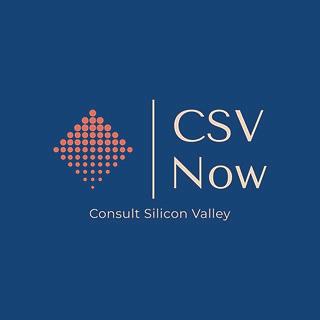
could best put people in the right positions to drive success.
Since coming to Fivetran, Silva has grown his team from eighteen to thirty-five people with three direct reports. The growth is an extension of Fivetran’s expanding footprint and need to keep its talent sourcing and pipeline creation on par with the caliber of talent they are seeking.
Silva’s résumé runs deep, from extensive consulting to in-house roles at HP, Tesla, Kellogg, US Cellular, and Nevro. Prior to Fivetran, Silva spent two years working as his own boss, partnering with early- and mid-stage high-growth companies to design talent strategies. But the allure of working with a company growing as quickly as Fivetran was too good to pass up.
The year 2022 brought more highlights for both Silva and Fivetran. The company was rated number seven on Fortune’s “100 Best Medium Workplaces” with a 98 percent employee satisfaction rating. The organization also ranked number six in “Best Workplaces for Millennials” and number two in “Best Workplaces in the Bay Area,” both rankings given by Fortune and Great Place to Work. One employee review in the Fortune Best Medium Workplaces listing paints a clear picture of just how the company has managed to earn its reputation as an employer of choice: “Our culture is unbeatable. We have numerous ERP groups for employees to participate in, and our company gets together each year for Camp Fivetran. This year, the company booked out an entire five-star resort in Cancun for employees from around the world to gather and meet—no work, just quality time with each other.”
Silva obviously had a very strong company culture to build on, but it just makes the challenge of continuing to grow the organization with that culture still embedded all the more high-stakes. He appears to be well on his way.
KEY CONSULTING SERVICES INCLUDE: Executive search Direct Hire Sta ng Temp to Hire or Contract to Hire Temporary Sta ng or Short Term Sta ng Workforce planning www.csvnow.com 80 Q2/23 PROFILE COMPANY
CULTURE
How leaders cultivate inclusive environments that allow both employees and companies to thrive Jennifer Rote, TGI Fridays
Bailey Price, Jellysmack
Shannon Rowley, MWH Constructors
Beth Giglio, The Gorilla Glue Company
P82
P86
P90
P94
Rethink the Restaurant

At
By ZACH BALIVA
TGI Fridays, Jennifer Rote pushes innovation, takes on HR duties, and builds a culture where leaders value what every employee brings to the table
web story. Doug Stroud CULTURE PROFILE 82 Q2/23
Scan the QR code to be taken to the
What started as a humble gathering spot where friends could enjoy great American food on New York City’s east side is now an international casual dining phenomenon. TGI Fridays has grown to a network of seven hundred restaurants in sixty countries, but each bar and grill retains the personal service and liberating spirit that’s been part of the company’s culture since 1965.
Senior Vice President and General Counsel Jennifer Rote has been with the organization for nearly two decades and is helping the iconic brand chart its path into the future.
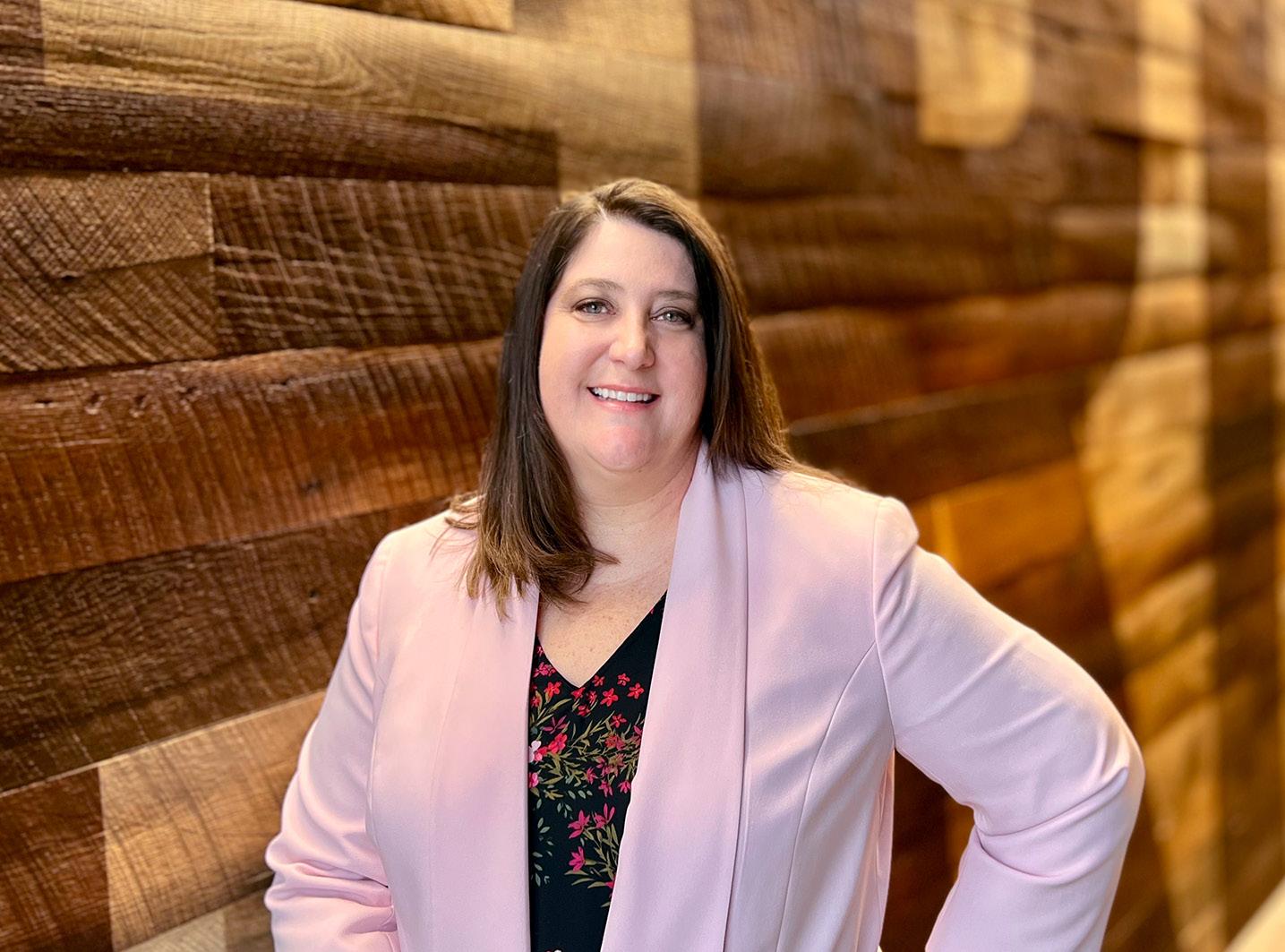
Rote, a Lone Star State native who studied criminal justice administration at the University of North Texas and attended law school at Texas Tech University School of Law, went straight in-house with another classic American company. She joined RadioShack
in 2000 and spent four years negotiating and writing store leases and amendments as a real estate attorney.
By 2004, RadioShack was on the decline, but Rote had found her passion in real estate law. Then, TGI Fridays was building dozens of stores per year and developing a new concept called Pick Up Stix. “I wanted to find a new challenge and go somewhere where I would have the opportunity to really build out the real estate function,” Rote explains. It was a perfect match.
It didn’t take long for Rote to learn two things. First, she loves the TGI Fridays brand. “I bleed red and white,” she says. “This company has a wonderful atmosphere where people can truly be who they are.”
Secondly, casual dining is always susceptible to the ebbs and flows of the economy. When discretionary spending sinks, many consumers either stop eating out or choose to replace occasional trips to
Jennifer Rote
mid-market restaurants with less frequent visits to premium hotspots.
This harsh reality gave Rote an opportunity to generalize her practice as TGI Fridays navigated the economic downturn of 2008. As decreasing budgets shrunk the legal department, she moved outside of a strict real estate role to take on responsibilities in litigation and international locations.
An encouraging boss and mentor helped guide Rote along the way, and the process strengthened her bond to the company. “I was already aligned to the values and the culture here, but I really started to see firsthand how we value individual voices and contributions,” she explains.
Nineteen years after she joined the organization, Rote is now responsible for all legal aspects, but she’s not just delegating. “I always imagined that a general counsel at a high level would hand out the work, but we’re a lean team that works together and that’s
SVP and General Counsel TGI Fridays
“This company has a wonderful atmosphere where people can truly be who they are.”
Katy Hale
JENNIFER ROTE
CULTURE profilemagazine.com 83 PROFILE Q2/23
Brown & Brown Insurance was founded in 1939 as a two-partner firm and has risen to become one of the largest insurance brokerages in the world. With a team that is as connected locally as it is nationally, Brown & Brown provides the personalized, dedicated service you want from a boutique agency while delivering the peace of mind that you expect from a top brokerage.
Creative consultants focused on:
• Employee Benefits
• Population Health
• Mental and Behavioral Health
• Property and Casualty
• Risk Management
• Total Rewards and Compensation
• Personal Insurance
part of why we’re successful. We really know what’s going on inside the business,” she says. TGI Fridays’ legal function that once had more than twenty professionals now includes just three lawyers and six paralegals.
Now Rote is in the next growth phase of her career. CEO Ray Blanchette is doubling down on culture and people strategy; he asked her to take on various HR responsibilities to ensure the company’s policies that govern its eight thousand corporate employees are sound. Blanchette, like Rote, knows the culture well. In fact, he started as a kitchen manager and spent a quarter-century working his way to the top spot at TGI Fridays (he appeared on the 2020 season premiere of the CBS series Undercover Boss).
Rote is also getting back to her roots in real estate. Corporate has had a long-standing agreement not to operate in New York City, where other owners run one TGI Fridays location. The company recently reacquired that location and the territory and can now serve the community that helped launch it over fifty years ago. Under Rote’s leadership, the organization has also been buying back many other franchises it sold over time.
Today, TGI Fridays’ legal team is helping the business navigate another economic downturn as it pushes innovation and reinvents the brand while staying true to its history. To do so, the team is helping support creative concepts like virtual-only brands delivered through Uber Eats and DoorDash. This and other features like an enhanced
www.bbrown.com
rewards program are helping the business weather the COVID-19 pandemic.
Additionally, the company has announced plans for a small-format restaurant called Fridays Corner Bar to get back to its bar roots, as well as monetize and accommodate the ever-growing demand for takeout and delivery. TGI Fridays also recently partnered with Reef Technology and committed to introduce up to three hundred new delivery restaurants in North America in the next five years.
These efforts are yielding results. In early 2022, TGI Fridays announced that the business had experienced forty-one straight weeks of same-store revenue growth compared to pre-pandemic numbers and double-digit growth over the last two quarters of 2021. By summer 2022, digital sales volumes were up nearly 300 percent versus data from 2019. Those numbers outpaced most, if not all, of the company’s peers in the fast casual space.
After nineteen years, Rote and TGI Fridays are still a perfect pairing. The beloved restaurant chain has maintained success by evolving and changing with the times—and Rote has evolved right along with it.
Michelman & Robinson LLP is a national law firm that boasts a remarkable record of litigation, transactional, and regulatory successes in the most consequential matters. Our attorneys are practice area pros who are sought after for their proven industry expertise, including outstanding work in the hospitality space. Please visit mrllp.com.
When it comes to your companies benefits plan never follow the status quo. Learn how Brown & Brown’s strategies have helped employers enhance their benefit o erings and drastically lower costs.
“I was already aligned to the values and the culture here, but I really started to see firsthand how we value individual voices and contributions.”
JENNIFER ROTE
84 Q2/23 PROFILE CULTURE
Firm Managing Partner


































































“It’s a privilege to work and collaborate with Jennifer Rote. She’s an extraordinary and thoughtful leader and lawyer, and I thank her for entrusting Michelman & Robinson to foster legal and business solutions on behalf of TGI Friday’s.” Dana Kravetz
Los Angeles | Orange County | San Francisco | Dallas | Houston | Chicago | New York 310.299.5500 mrllp.com Congratulations, Jennifer, from all of us at M&R on being recognized by Profile Magazine for the remarkable job you do on behalf of such an exceptional company.
Scan the QR code to be taken to the web story.
All the Way or Not at All
Controller Bailey Price finds her confidence and her calling in going big at Jellysmack
By BILLY YOST
If Bailey Price is going to do something, she’s going to do it all the way. She wasn’t born to be an accountant, but when she decided to pursue the far more practical field in college than her initial English major plans, she didn’t do it halfway.
“Accounting wasn’t my first idea, but I’m also a very competitive person,” explains Price, who is the controller at tech company Jellysmack. “I went all in. I got my CPA and immediately got a job with a Big Four firm.”
Price readily admits that the ins and out of a daily accounting career aren’t what interest her most about her role. But after
building out experience at PricewaterhouseCoopers early in her career, she began to understand exactly what would keep her in the space.
ENABLING GROWTH
After moving from Dallas to New York City, Price found herself immersed in the city’s
CULTURE PROFILE 86 Q2/23
Bailey Price Controller Jellysmack
start-up space doing external accounting work for early-stage companies. The excitement was palpable, but she wanted to experience it from inside the companies. “I’ve really found a niche in going into an early stage start-up, building teams, building processes, and helping companies scale,” Price explains. “The challenges have all been different, but they’ve been incredibly rewarding.”
Previously, Price had been an integral part of massive fundraising campaigns, but coming to Jellysmack offered her an entirely new challenge: what happens after the money has been raised?

The global creator company that was founded in 2016 helps creators monetize their brand, grow their digital footprint, and expand their audience. It’s now growing at an exceptional pace. When Price arrived in 2021, the company had secured Series C funding that capitulated the company to unicorn status, valuing the company at over $1 billion.
“We hired a ton of people in a very short period of time,” Price says. “It created a lot of process challenges that come with a thousand new employees. Nobody knows how to get a credit card or pay an invoice. So along with those big cultural challenges of growth, I was really focused on process and operations.”
Price says evolving protocols and processes must stay in line with the culture that made Jellysmack so successful in the first
“We see how individual lives are changed by our work.”
CULTURE profilemagazine.com 87 PROFILE Q2/23
BAILEY PRICE
Cody Kurtz


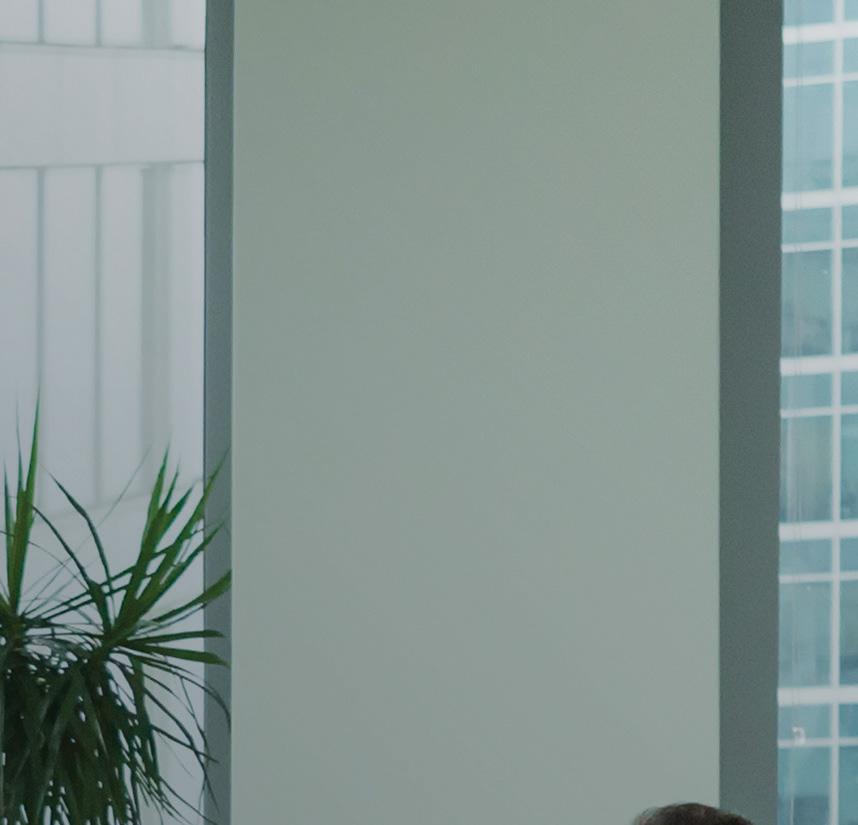










































place. But growth and evolution are still critical for the company to succeed. “That push and pull is so interesting, and to be honest, it’s a process we’re still in the midst of.”
OUTSIDE THE NUMBERS
When Price isn’t shaping Jellysmack’s financial future, she’s helping nurture those more junior in their careers. The controller says that the COVID environment fundamentally reshaped her perspective when it comes to confidence, leadership, and the future.
“In a previous role, I was going through a massive fundraise right when COVID hit, and it’s probably one of the hardest things I’ve done in my career,” Price remembers. “There were a lot of things on the accounting side I had to do entirely on my own, and I could feel a shift from the person who began her career at the onset of the financial crises. It took time to find that confidence.”
Price remembers being a young Southern woman in New York City, working in a male-dominated field and feeling an intense urge to somehow prove herself. That desire, Price now believes, was unrealistic and unhealthy in its need for validation, and she wants to help women in the field to find the confidence and self-acceptance to believe in their own journeys.
“The opportunities that have come in my career have happened because of people that empowered me,” Price explains. “That’s something that is dear to me, and I try to focus on when it comes to leading teams now. I think there’s a common mindset in the start-up space that you have to throw people in the deep end and see how they perform. I try to make sure my people have the knowledge and resources to be set up for success. I think that’s incredibly important.”
At Jellysmack, Price also tries to create an environment where people can be heard and valued. She knows that an environment
where team members don’t feel comfortable sharing their concerns or suggestions limits the potential of everyone involved. Having experienced that kind of environment firsthand early in her career, she’s intent on breaking that cycle.
“Bailey’s leadership and perseverance are second to none,” says William O’Hara, partner at CFGI. “Her ability to provide the tools for success is a prime example of why we are avid supporters of women in business. Bailey is a role model for women everywhere and a testament to what can happen when you believe in yourself and go all in.”
Outside of the office, Price is also creating fundamental change. The controller serves on the board of directors of Limitless Horizons Ixil, an organization that supports academic and personal development for the Indigenous Maya community of Chajul, Guatemala.
At time of speaking in July 2022, the organization had just opened the doors of its first physical school in the community, no doubt as exciting a moment for the nonprofit as for the people it serves.
“We see how individual lives are changed by our work,” Price says. “It’s creating opportunities for women who may have only thought their only options were to get married out of high school and have that be their lives. It makes you think about your own privilege, and it makes you very grateful to be able to provide things like libraries and educational opportunities for truly wonderful people.”
CFGI is the nation’s largest non-audit accounting advisory firm that is strategically positioned to support companies with all critical finance and accounting operations. Created to act as an extension of each client’s corporate finance team, CFGI’s crossfunctional experts deliver solutions and services to fit all routine and complex business operations.
“Accounting wasn’t my first idea, but I’m also a very competitive person. I went all in.”
BAILEY PRICE
CULTURE profilemagazine.com 89 PROFILE Q2/23
Getting Things Done Right
As chief human resources officer, Shannon Rowley supports a complete workforce at MWH Constructors
By JOSEPH KAY
A passion for people has always been at the center of Shannon Rowley’s career. Today she serves as chief human resources officer (CHRO) at MWH Constructors, but she originally trained to be an occupational therapist and worked briefly in the field before returning to school to study business administration.
She fell into human resources work when a family friend needed office help with a plumbing franchise. Initially overseeing payroll and invoicing, she eventually got connected to corporate staff and served as a regional human resources manager. She worked at American Residential Services for a total of six years, saying it felt natural in a way that previous jobs never had before.
“I find that when we talk things through, we often come to a better outcome.”
Scan the QR code to be taken to the web story. CULTURE PROFILE 90 Q2/23
SHANNON ROWLEY
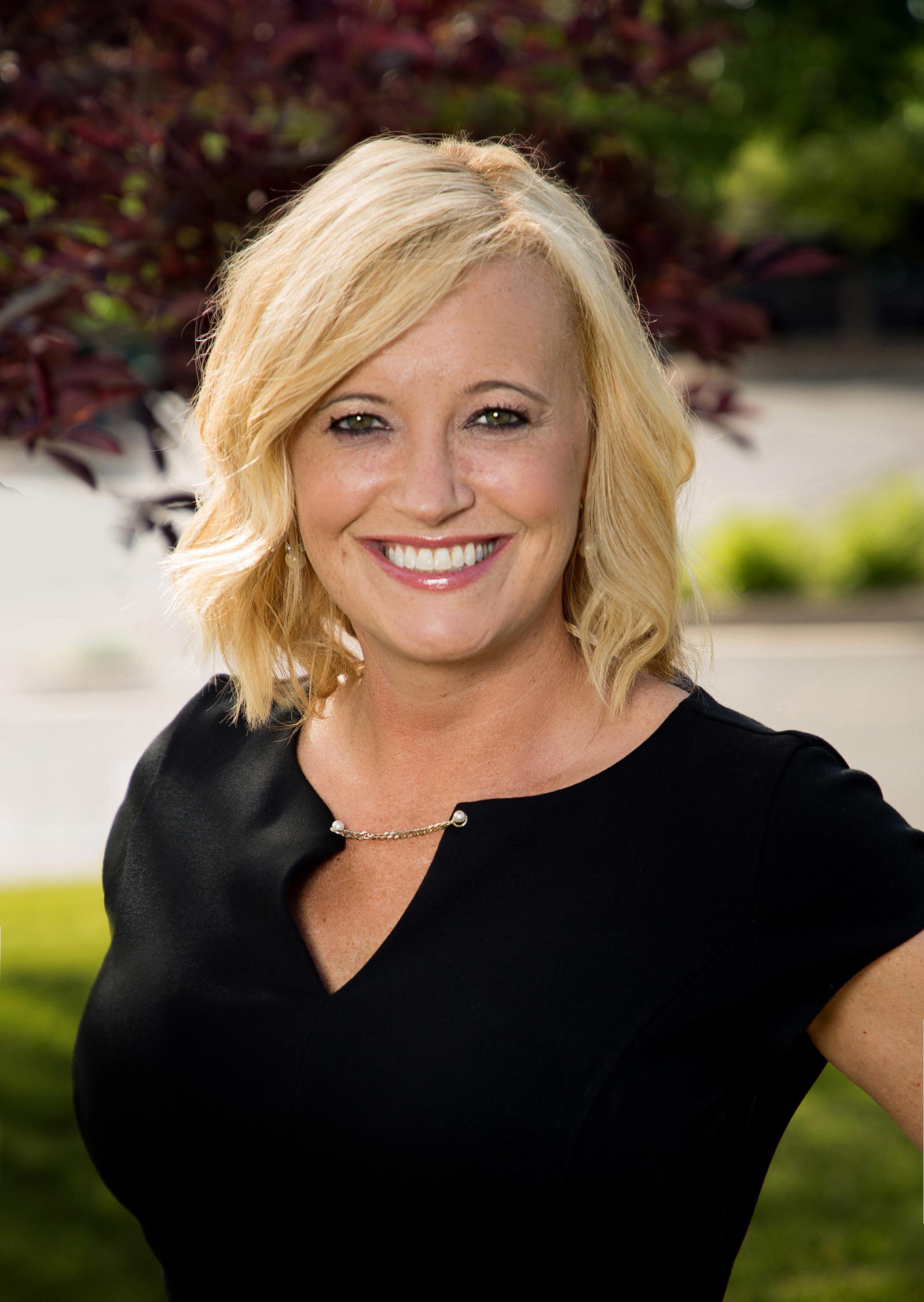 Shannon Rowley CHRO
Shannon Rowley CHRO
Tahvory Bunting CULTURE profilemagazine.com 91 PROFILE Q2/23
MWH Constructors
We are a leading global project delivery company with a focus on our world’s most precious resource:
WATER
“That work allowed me to stay connected with all levels of the organization,” she adds. “I got to know more about the employee base: what drives them, what keeps them engaged, and what information they need to do their jobs.”
In 2005, she got a call from a recruiter: MWH Global was looking for an HR generalist to contribute at headquarters in Broomfield, Colorado. Rowley was intrigued by the opportunity work at a corporate office in a new industry, especially after years as a lone HR professional in a field office.
But the first six months were rocky. Rowley worked alongside engineers for the first time, and she had to adjust to a very different workplace culture. “I quickly learned that nobody was going to take my word for it,” Rowley explains. “I had to prove myself and back myself up with data—if you didn’t have data, you had no business talking to engineers.”
Once she got vocal about her capacity to contribute further, she stepped into a management role where she could expand her skill set and become more connected to the business. Those six months extended into six more, and now Rowley is in her eighteenth year at the company having served in a variety of roles across MWH Global’s many businesses, including MWH Constructors.
MWH Constructors is an integrated project delivery firm primarily focused on wastewater treatment. Its roots reach back over two hundred years across the United States and United Kingdom. In 2016, engineering conglomerate Stantec acquired


92 Q2/23 PROFILE CULTURE
MWH Global to develop a global footprint; two years later, in 2018, MWH Constructors was sold to private equity firm, Oaktree Capital Management. MWH Constructors now operates independently, with several companies under its management.
The 2018 buyout presented several challenges for Rowley and the administrative team. After operating under a parent company for her entire tenure, Rowley had to implement in-house systems across the organization. Her team had six months to complete that work while preserving and improving employee engagement, which was troubled during the uncertain period of the sale and the buyout.
“When things were moving so fast, we felt like we needed to have all-hands calls weekly,” the CHRO recalls. This led into a workforce engagement survey that helped direct those changes. “We took all the feedback and we created focus groups. We created very specific action plans and now, nearly four years later, we keep engagement in those calls, so we never lose sight of it.”
Another continuous thread in MWH’s approach has been a commitment to community integration. Over the life cycle of a project, MWH ensures residents, businesses, and the community are at the forefront of the process. The company establishes outreach goals and develops additional methodology for delivery. MWH also provides workshops and presentations to provide transparency to the public.
Within the company, MWH implemented emissions reduction, water conservation,
and waste reduction programs to limit the environmental impact of projects and administration. It defines sustainability as “building clients’ projects with the most cost-effective materials and approaches that provide the best value over the facility’s lifetime.” That is, a sustainable approach is ethical as well as economical for all stakeholders.
Rowley has seen little turnover on her team and several of her colleagues have worked beside her for over ten years. Her leadership approach is collaborative and trusting, with an emphasis on talking through issues to arrive at effective solutions. As a CHRO, she trusts the expertise of her colleagues, and relies on open communication to develop everyone’s expertise.
“I find that when we talk things through, we often come to a better outcome,” she explains. “Often, someone will know the right answer but might not have the confidence or don’t want to make a mistake. If we discuss, they’ll talk themselves into a decision and they won’t need me to make it for them.”
The challenges of management can come as a shock to many, Rowley notes, and she was no different. Now, her eighteen years in managerial positions have supported ongoing growth as a leader and a professional. “I’ve learned to have more patience and to ask better questions,” she reflects. “Early on, everything always seemed like a fire. Things had to be perfect. I have a lot more tolerance for getting things done right, as opposed to getting them done quickly.”
“Early on, everything always seemed like a fire. Things had to be perfect. I have a lot more tolerance for getting things done right, as opposed to getting them done quickly.”
SHANNON ROWLEY
CULTURE profilemagazine.com 93 PROFILE Q2/23
Here for the People
Beth
By FRANK DIMARIA
Beth Giglio is a master of languages. Not the ones that might come to mind first, like Spanish or French—she’s fluent in the language of business across a wide range of industries. “I’ve worked in pretty much every major industry as well several functions,” she notes. From operations and research and development to sales and marketing, she has learned to speak the “native tongue.” This understanding enables her to translate business strategy into HR strategy in a different way from most HR professionals.
Giglio is the chief human resources officer for the Gorilla Glue Company. Although her undergraduate degree was in HR, she spent the first half of her thirty-year career in non-HR positions. After college she worked for Deloitte Consulting as a management consultant and while there, she says, “I learned that to execute any kind of change you have to bring people along and speak their language.”
Realizing that her goal was to solve people issues through a business lens, Giglio
Giglio got into HR to help people reach their full potential and she’s putting that into practice at the Gorilla Glue Company
the
code
be
to the web story.
Scan
QR
to
taken
CULTURE PROFILE 94 Q2/23

Mark Byron
Beth Giglio CHRO
95 PROFILE Q2/23 profilemagazine.com CULTURE
The Gorilla Glue Company
earned an MBA to learn the language of her business partners. “If I frame what needs to be done in HR from a P&L perspective—i.e., will it help increase revenue, reduce cycle time for new product launches, or improve margins—it helps me justify investments in a new system, training, or diversity and inclusion work,” she explains.
In her ten years with Deloitte, she learned that to implement successful transformations, change management is required. People must be ready, willing, and able to learn and sustain change. Learning the change dialect helps her in all her work as an HR leader today.
Giglio eventually moved to Johnson & Johnson (J&J), where she spent nearly six years in operations, R&D, and commercial roles before transitioning to HR. In her roles at J&J, she was able to influence business leaders by engaging them in the change process and by speaking their language. “It was easier to talk to engineers if I knew Six Sigma, and sales if I knew the sales process, so that’s what I did,” she says.
Once in HR, she used her process improvement and change management skills to drive change in HR systems, culture, performance management, and diversity and inclusion. “As an example, at J&J, we learned that if we wanted more diversity in engineering, we needed to redefine the experiences we were seeking,” she says. “If we required medical device experience we found white men,
whereas other regulated industries had a broader talent pool.”
The solution, Giglio explains, was reframing requirements to focus on regulated industry experience rather than medical device experience—and the company’s talent pool expanded dramatically. “You have to ask, ‘Am I willing to flex on industry or on experiences?’” To improve diversity, she also helped revamp job descriptions and screening questions to help reduce bias and attract a wider variety of people.
Giglio is also focused on promoting diversity and inclusion at Gorilla Glue. She recently had Gorilla Glue’s leadership go through a poverty simulation to help the team learn about the implications of living in poverty and how it might affect someone’s ability to live and work. The simulation demonstrated the difficulty that dedicated employees at or near the poverty line may have physically getting to work—something many take for granted.
“If you’re a second-chance employer, like Gorilla, that means [employees] can have commitments around parole or court dates or limited access to transportation. Those kinds of things keep you, potentially, from being at work at the same pattern as others,” Giglio says.
After the poverty simulation, “we started digging into policies, procedures, and expectations to really understand what it takes to get somebody to work. I’m super
“If you’re a second-chance employer, like Gorilla, that means [employees] can have commitments around parole or court dates or limited access to transportation. Those kinds of things keep you, potentially, from being at work at the same pattern as others.”
CULTURE PROFILE 96 Q2/23
BETH GIGLIO
The Original








Beth Giglio is the Glue Holding it All Together











Medical Mutual thanks Beth for her dedication to the health and wellness of The Gorilla Glue Company. We are so grateful for her partnership and we celebrate her accomplishments.


MedMutual.com Health | Dental | Vision | Life © 2022 Medical Mutual of Ohio
SPECIALTIES
Improve response to stress
Optimize intentional recovery
Expand energy capacity
Enhance sleep
Increase human connection & engagement
Elevate performance & productivity


Reduce fatigue, exhaustion, and burnout
Training Workshops
(Half Day, 1.0 Day, 2.5 Day)
Digital Training Resources

(translation available in 20+ languages)
Leader Resources
impacthumanperformance.com
excited about that,” she says. Giglio explains that it’s important to know whether the issue is really attendance, or if the company’s policies and procedures create barriers that contribute to turnover and shrink its talent pool.
Giglio is a big believer in using data to solve problems, and she utilizes it in her daily work. She connects performance data, potential data, and compensation data to ensure that leadership rewards top talent. Additionally, “I look at the results of engagement surveys in the context of where the business is going to determine what action plans need to be put in place to enable future business strategies, rather than just taking the survey results at face value,” Giglio says.
Recruiting and retaining employees through the COVID pandemic, for example, was a challenge. Salaried employees were reevaluating their work lives based on any number of personal preferences, while hourly employees were willing to jump ship for incremental raises. Giglio turned to data to help her with recruitment and retention.
Most companies employ total rewards statements, which rarely reflect an employee’s actual total rewards. Giglio uses an employee value proposition strategy that paints a comprehensive picture of employee compensation. “We monetized everything: the benefits, our quarterly awards, and several benefits employees don’t pay for,” she says.
Her strategy demonstrates that an employee’s hourly wage represents only part of their total compensation. When employees view their benefits as a monetary gain, they realize they earn more at Gorilla Glue.
Giglio’s colleagues outside the company have taken note of her accomplishments. “Beth has a wealth of experience leading top-notch teams across all areas of human resources, and that knowledge drives her to think in new and innovative ways for Gorilla Glue,” says Frank Bloomquist, regional vice president for Medical Mutual. “She brings energy and vision to everything she does. People around her can’t help but be inspired to think creatively and really strive to reach new heights.”
Giglio leads from a business- and datadriven lens, but never forgets why she is there. “I want to put the human back into human resources, so people feel comfortable coming to [us] and they know we’re going to help them,” she says.
Some need to hear the unvarnished truth, while others require a lighter touch. “The reason I’m in HR is to enable people to reach their full potential,” Giglio says. “That’s what I stand for. It’s kind of my brand.”
Impact Human Performance (IHP) congratulates Beth Giglio on this well-deserved recognition! Beth is a world class people leader. IHP partners with organizations to provide training solutions that elevate human performance by helping people recover from stress and manage their energy more effectively. For more information visit: impacthumanperformance.com.
HORAN Health: “Beth is a forward-thinking strategic leader and tremendous partner. She has a strong pulse on the needs of today’s diverse workforce while proactively planning for the future. She is a true strategist who pushes to move the needle forward to meet the needs of her business and her employees.”
—Valerie Bogdan-Powers, President
At Impact Human Performance, we help people perform at their best, more often. We provide training solutions that elevate human performance by helping people recover from stress and manage their energy more e ectively.
“It was easier to talk to engineers if I knew Six Sigma, and sales if I knew the sales process, so that’s what I did.”
98 Q2/23 PROFILE CULTURE
BETH GIGLIO
IMPACT
Leaders highlight successful outcomes of initiatives, whether within their companies or the communities they serve
Linda Gadsby, National Board of Medical Examiners (NBME) P100 Jesse Carrillo, The Howard Hughes Corporation P104 Sameer Purao, Celanese P108
A Lawyer Who Looks Like Me
By ZACH BALIVA
By some standards, Linda Gadsby was a longshot to become in-house general counsel at an organization like the National Board of Medical Examiners (NBME). She had to challenge stereotypes and defy expectations just to become an attorney.
“I was just a little immigrant Black girl who grew up in the Bronx,” she says. “I had never even met a lawyer, and certainly not one that looked like me.” Today, not only is Gadsby leading the legal services department at NBME, she also serves as chief diversity, equity, and inclusion (DEI) officer.
Gadsby’s family is from Barbados. The second-generation immigrant and firstgeneration college and law school student completed her undergraduate studies at Cornell University, where she was president of the Minority Undergraduate Law Society.
Although it was an overall positive experience, Gadsby found certain aspects of her time at Cornell challenging, especially when she encountered pushback and barriers as she transferred from an engineering track
NBME’S SVP, General Counsel, and Chief DEI Officer Linda
Gadsby didn’t have an example to follow as she grew up—so she set out to become one
IMPACT PROFILE 100 Q2/23
Scan the QR code to be taken to the web story.
SVP, General Counsel, and Chief DEI Officer National Board of Medical Examiners (NBME)
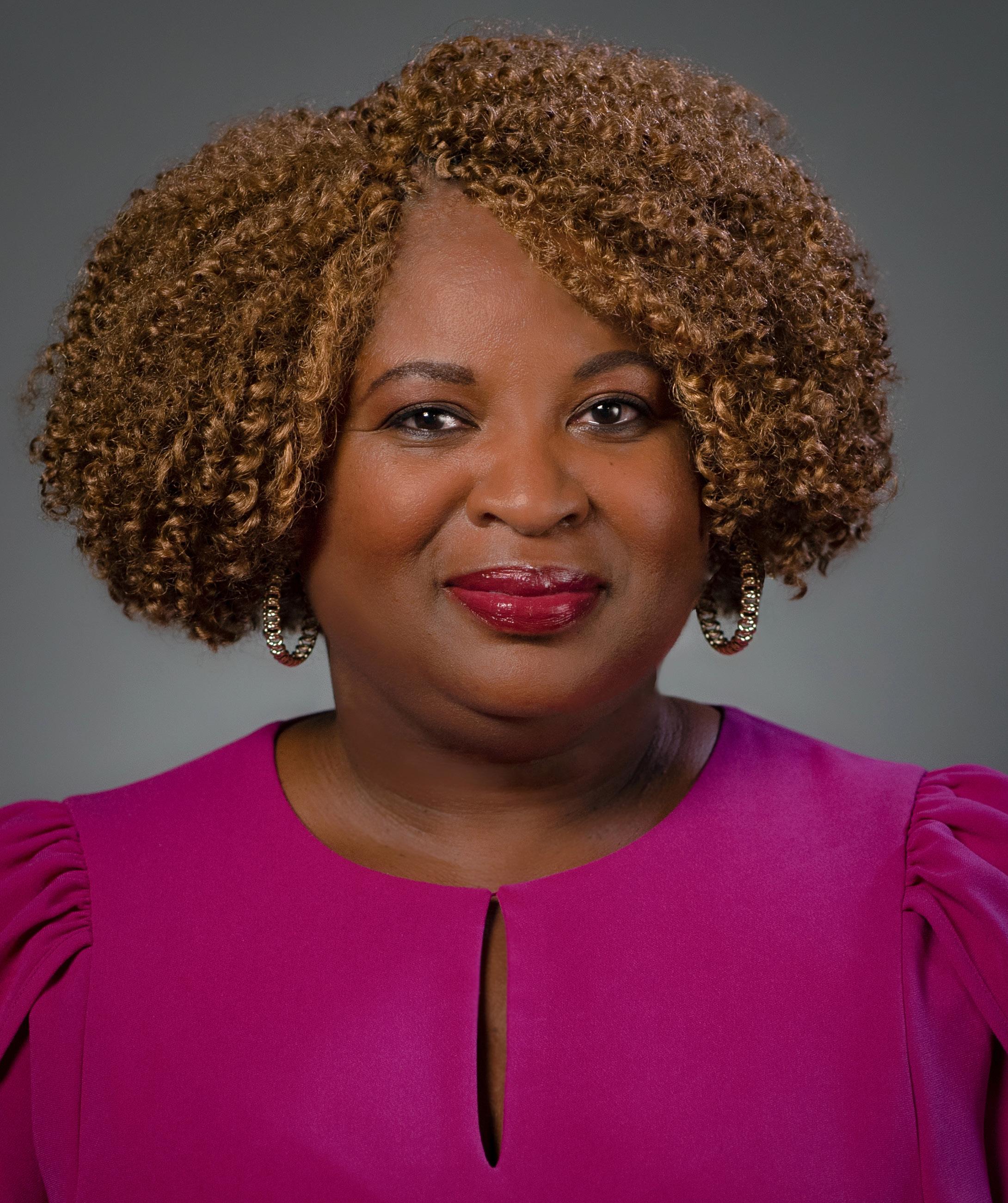 Linda Gadsby
Linda Gadsby
IMPACT profilemagazine.com 101 PROFILE Q2/23
Edward Hogarty
to the prestigious Cornell University School of Industrial and Labor Relations. As Gadsby cut through bureaucratic layers of red tape, she vowed to one day make things easier for those coming behind her.
That passion to help others propelled her to New York University (NYU) School of Law after a stint at State University of New York at Buffalo. The two-step process was designed to save money, which Gadsby now sees as a misstep. “Don’t make your graduate school choice solely based on cost because you’re talking about a pivotal decision that will significantly impact your life and your career,” she advises. “Find the school that is the best fit for you and make it work.”
NYU Law became that school for Gadsby. She took advantage of everything that the Greenwich Village campus had to offer, including remarkable professors, dedicated mentors, a diverse student body committed to public service, and a strong Black Law Students Association (BLSA), which was founded at NYU. She served on the National BLSA Board as the northeast regional director and worked with her peers to create a program that exposed high school students from underrepresented communities to the law by bringing them to campus on Saturdays and teaching them about different facets of the legal profession.
As she left the academic hub, Gadsby took a calculated risk. Instead of accepting offers from massive Manhattan firms with large labor and employment law practices, she went to Kaye Scholer, a top-notch firm, but was in a smaller practice group where she could focus on getting immediate hands-on experience in labor and employment law. She stayed for three years before going in-house as an HR counsel with AlliedSignal (now Honeywell).
Two years later, after honing her skills and deepening her professional networks, Gadsby moved to Scholastic Inc. As she contributed to the legal strategies for the global publishing company focused on literacy, books, and
education, she was living her passion. Gadsby stayed at Scholastic for twenty-two years.
By 2020, Gadsby had emerged as a respected generalist. Working as a divisional general counsel for three large divisions of the business and handling commercial contracts; education, labor, and employment; immigration; and employee benefits prepped her to run a legal department.
She would get that chance at NBME. The organization creates assessments like the United States Medical Licensing Examination and others for healthcare professionals. As general counsel, Gadsby leads a dedicated team of lawyers, paralegals, and administrative professionals who are responsible for work in a variety of legal specialties.
Gadsby has been busy since coming on board in 2020. She’s taken on responsibility for the governance, volunteer services, and disability services units, while also adding new philanthropy and DEI units. Her division includes over twenty professionals.
In 2020, Gadsby and the COO, Elizabeth Azari, worked together to institutionalize DEI at NBME, and when they realized the organization needed someone to lead the function going forward, she raised her hand to become its inaugural chief diversity, equity, and inclusion officer. Those working with Gadsby are continuing their long-standing efforts to weed out stereotypes and unconscious bias from NBME assessments, diversifying the staff and leadership, creating impactful educational and celebratory programs through its recently established DEI advisory council, and facilitating courageous workplace conversations about race and other DEI topics, like how systemic racism impacts medical education and healthcare.
Strong external partnerships are helping take equity and inclusion to the next level. NBME is strengthening its ties in the community through its support of STEM programs. Gadsby’s IT colleagues volunteer their time to create lessons on
“Don’t make your graduate school choice solely based on cost because you’re talking about a pivotal decision that will significantly impact your life and your career. Find the school that is the best fit for you and make it work.”
IMPACT PROFILE 102 Q2/23
LINDA GADSBY
coding and web design for underserved students in Philadelphia’s public schools in collaboration with the University Science Center’s FirstHand program.
Gadsby has also worked to help NBME partner with the city’s Black Doctor’s Consortium (BDC) to support its new health equity medical center and hopes to offer volunteer opportunities with BDC to her staff.
“We want DEI efforts to be part of everything we do at NBME,” she says.
NBME also wants to be a leading voice in the national conversation in this space. This year, it will host an equity in measurement and assessment conference with several sister organizations in the medical education sector to convene assessment and DEI professionals in the same room to discuss innovative solutions to further equity.
Outside of work, Gadsby is busy with many endeavors including her service for a second term on Cornell’s board of trustees, where she was once a member of the diversity task force. She is now cochair of the student life committee; a member of the audit, risk, and compliance committee; and a member of the advisory group to the president on equity. Gadsby is also excited to be a member of the search committee for the inaugural director of Cornell’s new Center for Racial Justice and Equitable Futures. It’s a chance for the veteran leader and lawyer to fulfill that vow that she made to herself when she was an undergraduate student.
“I hope that I can make things easier for students today,” she says. “And

BarkerGilmore is the nation’s premier executive search and leadership consulting firm focused exclusively on general counsel, in-house counsel, and chief compliance officers. The firm is recognized by CEOs, boards, and executives for its commitment to diversity and best-in-class legal and compliance talent.


IMPACT 103 PROFILE Q2/23 2500 ATTORNEYS | 43 LOCATIONS° Greenberg Traurig applauds the leadership Linda Gadsby, SVP, General Counsel and Chief Diversity, Equity & Inclusion Officer of NBME. - Johnine P. Barnes and your friends at Greenberg Traurig Congrats to our client and friend Linda Gadsby Greenberg Traurig is a service mark and trade name of Greenberg Traurig, LLP and Greenberg Traurig, P.A. ©2022 Greenberg Traurig, LLP. Attorneys at Law. All rights reserved. Attorney advertising. Contact: Johnine P. Barnes in Washington, D.C. at 202.331.3100. All rights reserved. °These numbers are subject to fluctuation. *Diversity, Women’s & LGBT Scorecards, The American Lawyer/National Law Journal, 2021; §Tie. 36464 LEARN MORE AT GTLAW.COM Number of African American Partners Number of African American & Latino Attorneys Number of Asian Partners Number of Female Partners Overall Number of LGBTQ+ & Latino Partners Number of Asian Partners #1 #2 #3 #5 #4 #6 John Gilmore Managing Partner (585) 598-6555 jgilmore@barkergilmore.com www.barkergilmore.com Congratulations, Linda, for your outstanding achievements and leadership Linda Gadsby Senior Vice President, General Counsel and Chief Diversity, Equity and Inclusion Officer General Counsel and CCO Executive Search and Advisory Services Bringing clients a commitment to diversity and exclusive access to industry leaders
I hope that I’m one of many who is leading by example so young people from all backgrounds can see what’s possible in life no matter where you start out and can reach their full potential.”
The Joy of Innovation
Jesse Carrillo may be helping to build a city from scratch, but his true legacy will be developing others
By BILLY YOST
Jesse Carrillo was so inspired by his teachers growing up that he wanted to become one. The chief innovation officer (CIO) at the Howard Hughes Corporation recalls the time and effort his instructors took with a Mexican immigrant struggling to learn English and get acclimated to a new setting. This appreciation prompted him at the time to tell one of his favorite high school
teachers, Mr. Trigilio, that he planned to follow in his footsteps.
But his teacher’s response surprised Carrillo. “He told me that what I saw in the classroom was a very small part of what being a teacher was actually about,” Carrillo remembers. “He said that if I really wanted to impact education and help influence the next generation, I should build a career, grow in my profession, and then come back and give what I could. He was right.”
Carrillo’s focus on helping grow the next generation of leaders has been highlighted by CIO Review, CIO Magazine , the Society of Information Management, and more importantly, by the countless students who can attest to the CIO’s commitment to his community.
Whether by helping disadvantaged students pursue STEM careers, assisting nonprofit boards that provide high school internship programs, or advising boards to
Scan the QR code to be taken to the web story. IMPACT PROFILE 104 Q2/23
Jesse Carrillo
CIO
The Howard Hughes Corporation
ensure curriculums of higher education are keeping up with the modern-day demands of the workplace, Carrillo has found limitless ways to give back. “I get so much energy from what I do. I’m fueled by joy and making a difference,” the CIO says.
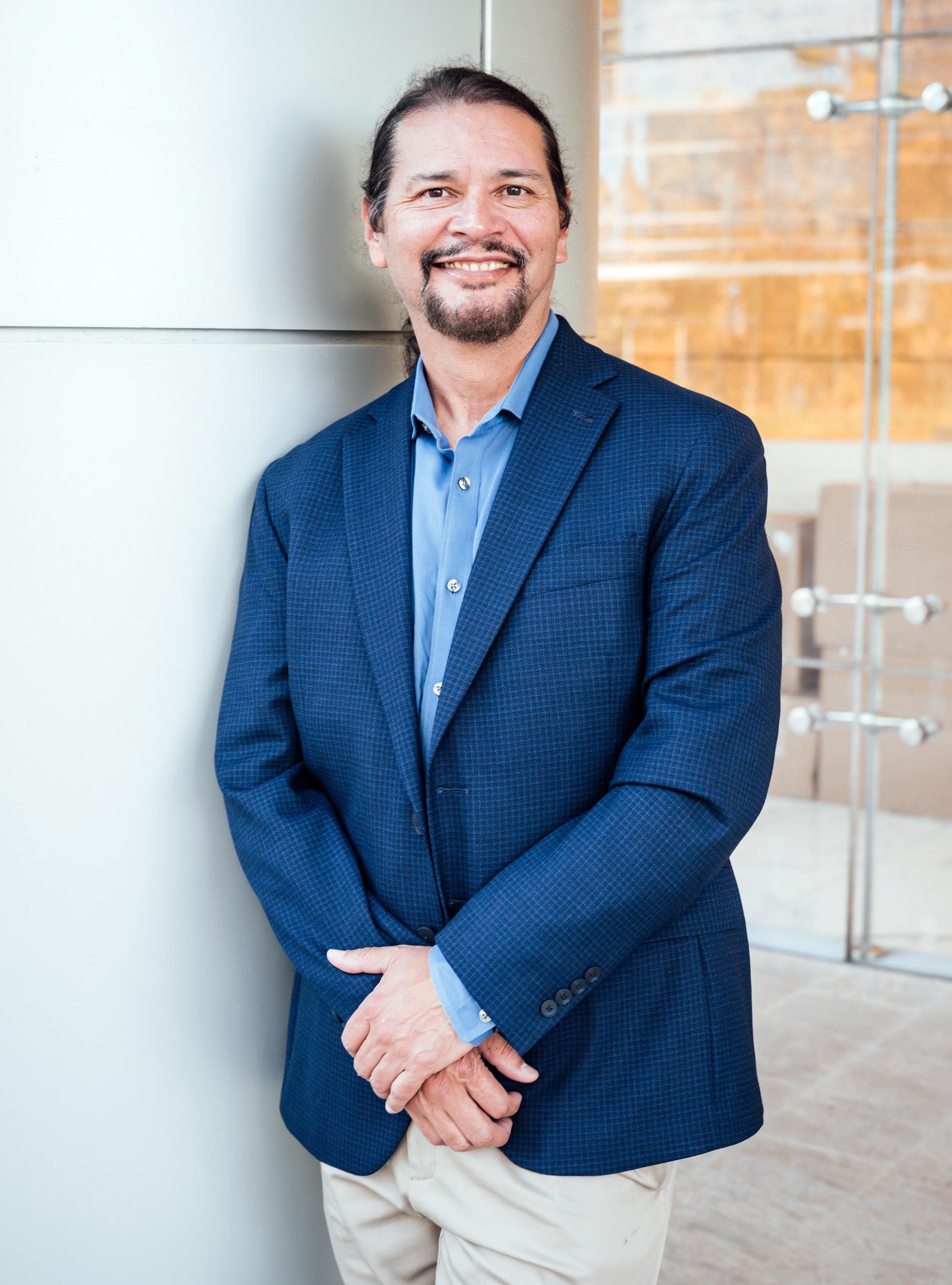
Carrillo’s path wasn’t paved or destined. His early life was incredibly challenging. The future leader was raised by a single mother, an experience that gave him a perspective that would impact his entire world vision.
“Growing up with hardship might have meant just staying in that survival mode at all times,” Carrillo explains. “But I just looked at life in a totally different way. There was a great deal of trauma, but I just learned to appreciate everything that I had. I’m a very positive person. People sometimes tell me I’m too positive, but that is how I got through the hard times, and I’m glad it’s how I look at the world now.”
That mindset propelled Carrillo through his academics and, thankfully, through a nightmare of a first job experience. Straight out of college, he landed a government contract role. A couple of months in, the company lost the contract and Carrillo became unemployed.
“It’s those kinds of moments that help define who you are,” Carrillo says. “My feeling was ‘bring it on.’ It’s just another challenge, and I can overcome it.” His next job offer was better, and at a place where he’d stay for the next six years.
“[My teacher] said that if I really wanted to impact education and help influence the next generation, I should build a career, grow in my profession, and then come back and give what I could.”
IMPACT profilemagazine.com 105 PROFILE Q2/23 Ahmad Sweeney
JESSE CARRILLO
Carrillo came to Howard Hughes in March 2022 after a startling twenty-seven years at Hines, where he acted as CIO for fifteen. What prompted the move? He had grown his team—in fact, he had even named his successor—to the point that Carrillo knew he needed to move on if he wanted his people to continue to grow and if he wanted to continue to challenge himself.
“We built an amazing technology team that was rocking on all cylinders, so I was in a position where I wanted to try something new that would allow me to recreate similar magic,” Carrillo says.
The agility and momentum exhibited by the Howard Hughes Corporation as the company launched into its second decade was incredibly attractive to Carrillo, as were the company’s transformational master planned community projects, like the thirty-seven thousand acres in Phoenix’s West Valley that present the rare opportunity to build a new large-scale community from the ground up.
“It’s just desert right now, but it’s going to be the next Scottsdale,” Carrillo says of the project, which is called Douglas Ranch. “I will

be able to walk away knowing that I helped build a new city. Who gets to say that?”
The challenges are endless, but so are the possibilities. From an innovation standpoint, Carrillo and his team are able to think about autonomous vehicles and delivery systems, “digital cities” in the metaverse, and the future of innovation around issues of environmental sustainability, like smart glass that is able to adapt to changing weather conditions.

Today’s modernizations rely on best-inclass telecom infrastructure, and Carrillo’s team is tasked with partnering with the heavy hitters in the game to help “future proof” the new development in the Arizona desert.
But even with a project like Douglas Ranch on the table—a project that will no doubt serve as a career high and an experience that will drive him every day to explore new possibilities in his work—Carrillo remains committed to spending time outside of his day job to do what he considers the greatest work he will ever do: working to create pathways for people like himself who have faced challenging situations and yet can still find a way to rise and succeed.
“I get so much energy from what I do. I’m fueled by joy and making a difference.”
106 Q2/23 PROFILE IMPACT
JESSE CARRILLO
AN EASIER ESCAPE
Jesse Carrillo is an industry leader who advocates for taking time for hobbies outside the office— especially hobbies that bring various people together and inspire community, creativity, and growth. His cherished hobbies? Music and comics. The metal lover is just as likely to attend a Scorpions gig as a Lady Gaga show. You might also catch Carrillo at a comic convention in cosplay, most often as the Master of the Mystic Arts, aka Doctor Strange.
“I just love experiences where people can come together and be who they are, whether it’s a comic convention or a concert,” Carrillo explains. “You can all share a common joy—and that’s what life is all about. Comics were also a way for me to live outside of a tough environment growing up and shine a light on opportunities for change.”
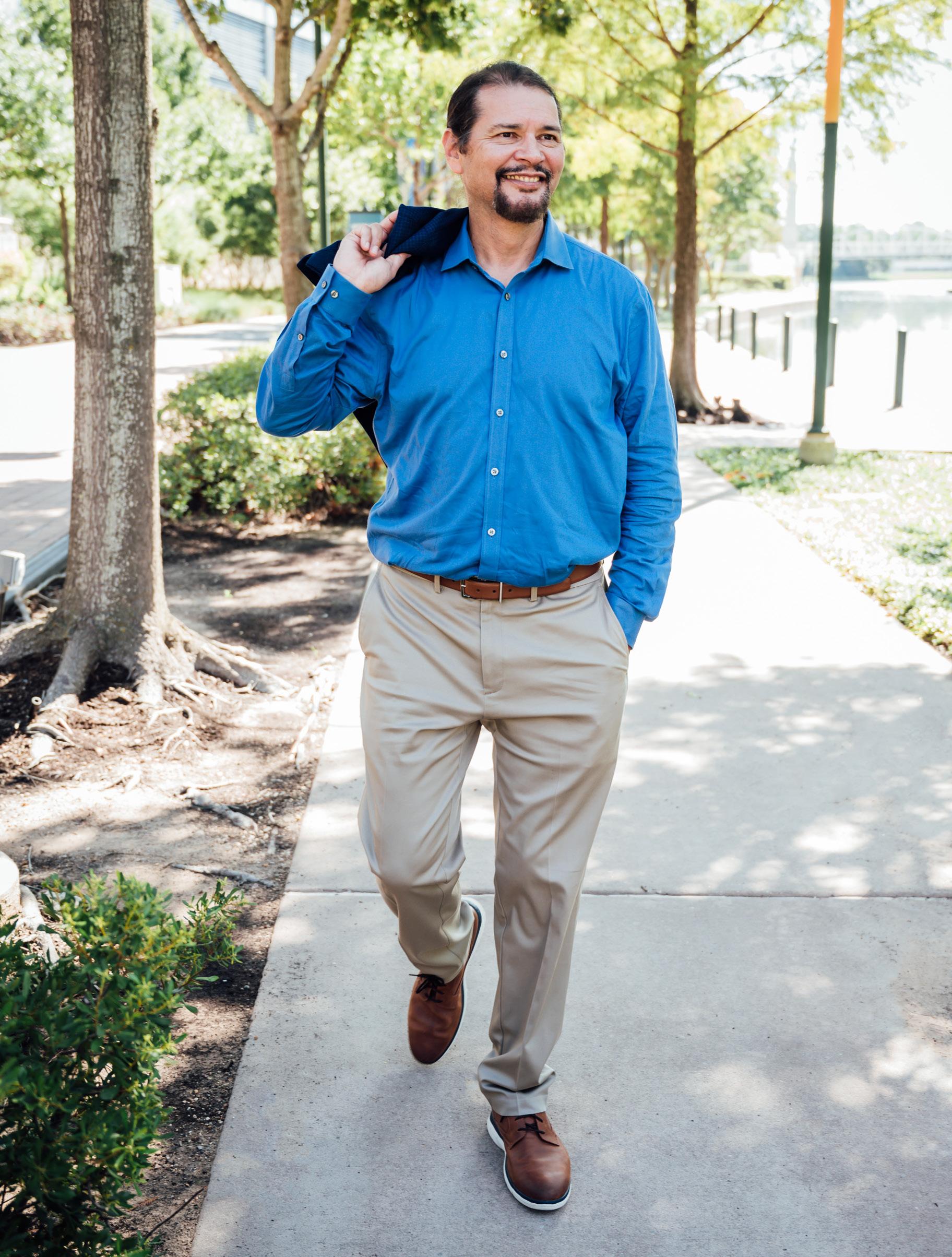
IMPACT profilemagazine.com 107 PROFILE Q2/23 Ahmad Sweeney
Going Beyond Technology
Sameer Purao decided early in his career to become not just a tech professional, but an IT leader. At Celanese, he’s using those relationships to drive the company’s digital transformation.
By MARCOS CHISHOLM
Like many tech professionals who hit the ground running early in their careers, Sameer Purao wore the hat of a product-obsessed specialist. Whether he was writing code for complex programs or building category-leading features, he leveraged his expertise to elevate the user experience.
While Purao enjoyed honing his tech skills and building his career, he noticed that some of the teams he was part of needed more direction and leadership. If no one stepped up and maximized the value proposition, all the resources that went into rolling out
Scan the QR code to be taken to the web story. 108 PROFILE Q2/23 IMPACT
Sameer Purao
VP and Global CIO Celanese
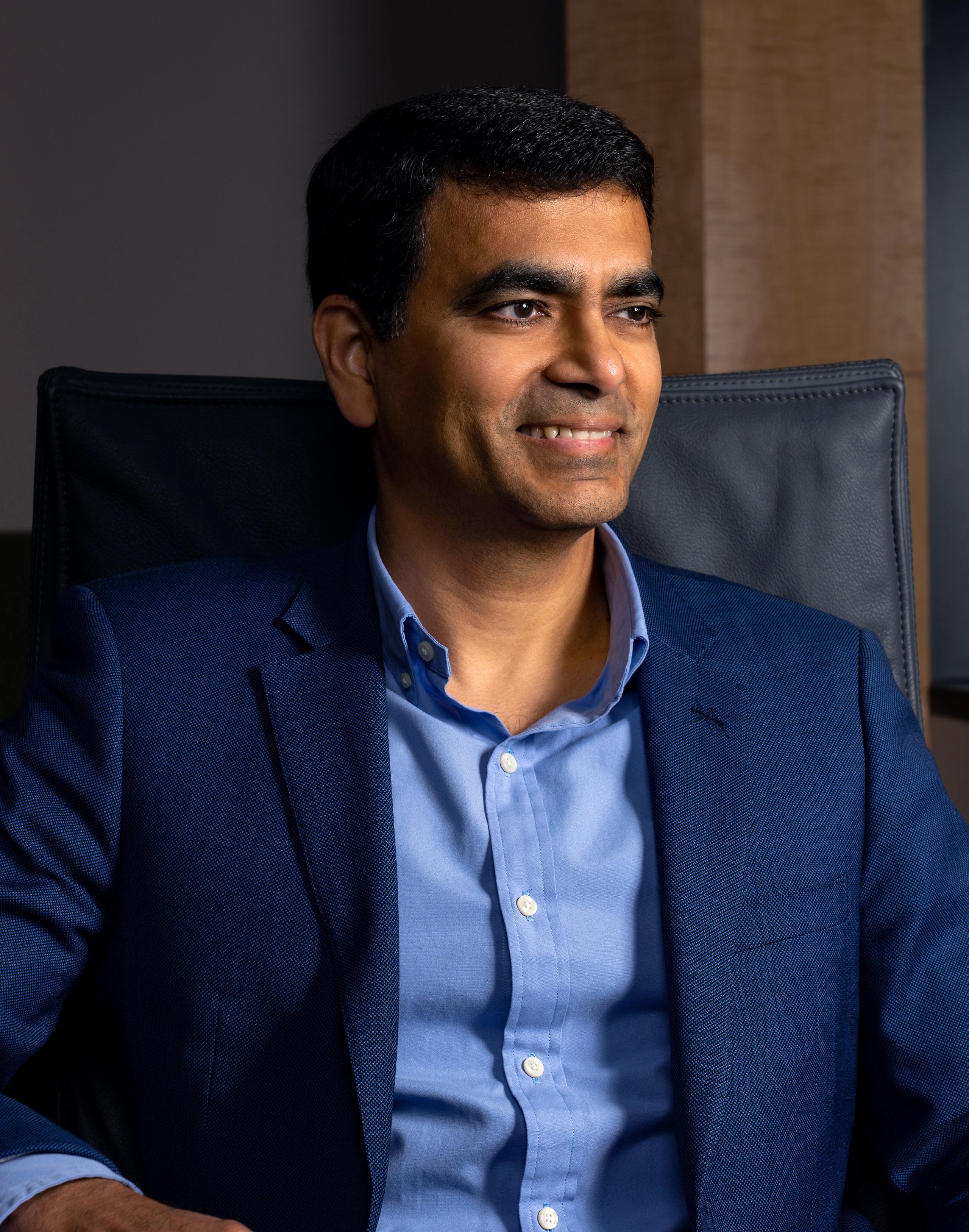
IMPACT profilemagazine.com 109 PROFILE Q2/23
Courtesy of Celanese
innovative products and services would go to waste.
“I realized that technology is great and I’m passionate about it. But that’s just one part of the value equation,” Purao says. “It had to be something else that really mattered, and that’s when I started looking more from a process and people perspective.”
Since then, Purao has approached his job with a different lens. Not only did his department need to save time and money when developing ERP products, but they also had to streamline operations and foster a collaborative culture. So he focused on finding new ways to make processes better. He learned more about the business. And sure enough, he grew into the strong business partner he is today.
“I was able to create a much bigger impact than what I was able to do in writing complex programs,” Purao says.
Two decades later, Purao is now the global chief information officer (CIO) at Celanese Corporation, which produces differentiated chemistry solutions and specialty materials used in most major industries and consumer applications. In this role, Purao is responsible for driving value through the digital transformation of a century-old enterprise in addition to overseeing the IT and cybersecurity efforts of more than eight thousand employees.
When Purao joined Celanese in 2021, the company was working to embrace the digital transformation that it needed to help its customers and advance its global manufacturing operations. Celanese was in the early stages of optimizing its customer journey and was just beginning to implement
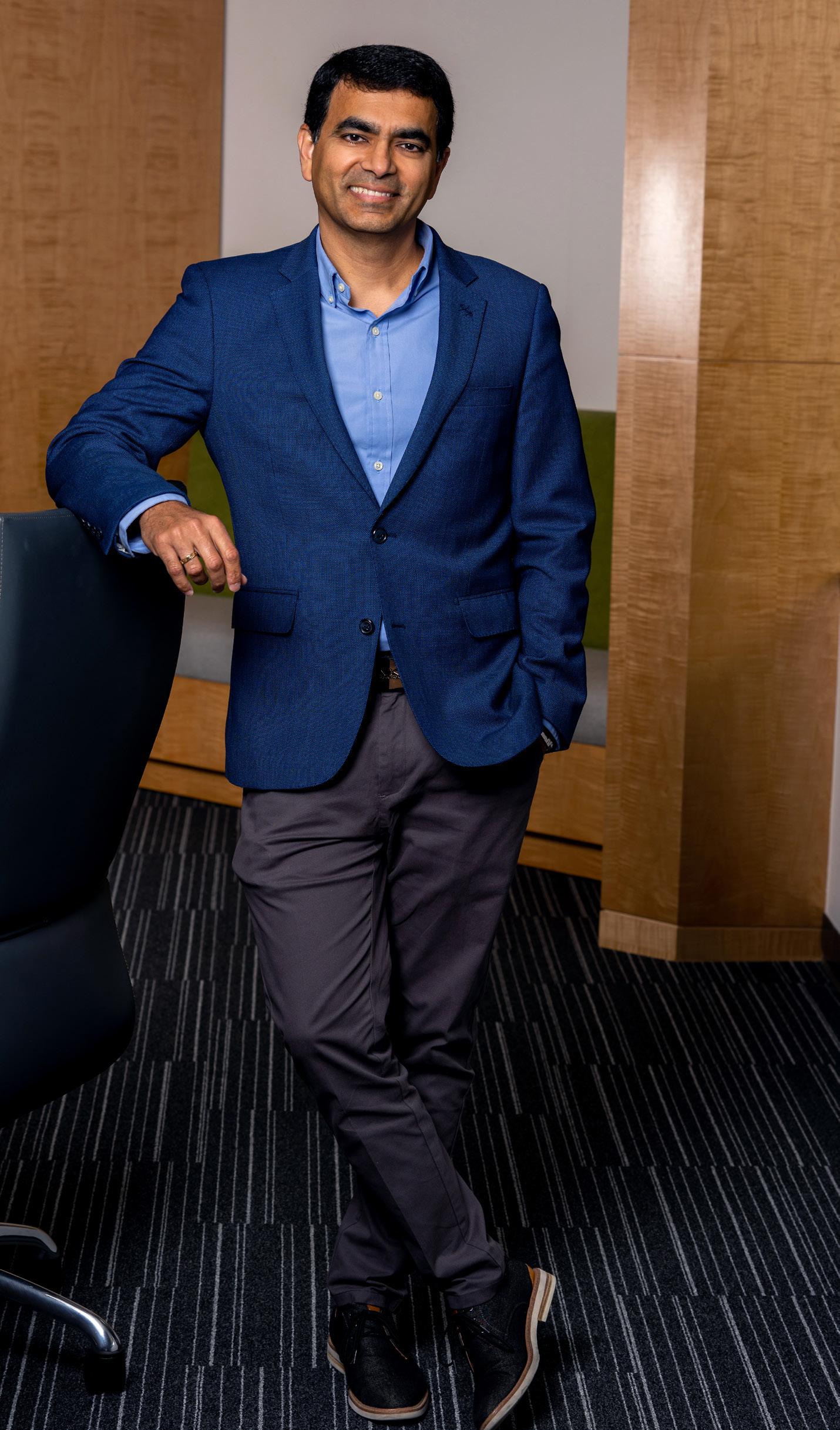
“People expect me to talk about technology, and I keep talking about people.”
IMPACT PROFILE 110 Q2/23
SAMEER PURAO
Courtesy of Celanese

© 2022 PricewaterhouseCoopers LLP, a Delaware limited liability partnership. All rights reserved. It all adds up to The New Equation. Congratulations to Sameer Purao for being recognized as a leader who is creating that change. TheNewEquation.com Putting trust at the heart of business to create meaningful change.
a digital manufacturing strategy that would help transform several of its manufacturing plants to smart plants.
“We’re doing a lot of discrete digital initiatives and improvements, but without an integrated approach you cannot drive a transformation,” Purao explains.
He drew up a new road map that allowed Celanese to build a scalable secured foundation while accelerating the digital journey to contribute to increases in productivity, reliability, and safety of its manufacturing plants. “It’s not just like we do a process manually today with fifteen steps and then we are automating to five steps. We are helping build our manufacturing capabilities for the changing needs of our customers and people,” Purao says.
Purao has also collaborated with colleagues outside the company on digital transformation efforts. “It has been a pleasure working with Sameer and his leadership team on strategic programs at Celanese leveraging digital technology to transform the customer journey, manufacturing operations, and provide a scalable cloud platform for future growth and innovation,” says Matthew Smith, chemicals and natural resources lead for the US South Region at Accenture.
In addition to all of this work, Purao needed to instill a winning culture in his department. He leans on a transformational leadership style that inspires employees to operate as business partners who are as invested in Celanese as its shareholders. “People expect me to talk about technology, and I keep talking about people,” he says, noting a certain irony in the assumptions that are made about him because of his role as CIO.
Purao also emphasizes that it’s important for the firm to prioritize diversity and inclusion initiatives, noting that diversity within a team leads to more diversity of ideas within the organization. “The culture within the team should be to value those diversity of thoughts, to respect those thoughts and encourage them in the team; that’s immensely useful in scaling and growing the organization,” he says.
From a talent development standpoint, he aims to cultivate leaders on his teams—building skills and competencies along the way.
Purao believes that having a strong mentorship program is key for developing leaders.
“People think that you first need to have a seat at the table to be a true business partner. And that’s why they always get caught up in that loop of waiting to get this seat. It’s actually the other way around,” Purao explains. “That is true for any role: if a manager aspires to be a director, for example, he needs to be performing as a director first before getting the corresponding title.”
Purao’s knack for leadership and collaboration hasn’t gone unnoticed. “When helping solve business problems, Sameer looks for an integrated set of capabilities from his strategic collaborators— teams across strategy, deals, technology, change management, and cyber are working together to reimagine the business capabilities enabled by digital,” says Kumar Krishnamurthy, a principal at PwC.
Beyond his affinity for entrepreneurship, Purao also holds his team accountable for delivering value. “Technology alone cannot create value. It is the people who create value, leveraging processes and technology,” he says. “Change management is often seen
“I realized that technology is great and I’m passionate about it. But that’s just one part of the value equation.”
IMPACT profilemagazine.com 113 PROFILE Q2/23
SAMEER PURAO
Accelerate Digital Transformation With a Trusted Partner

• Simplify the complexity of digital transformation
• Improve efficiencies and reduce costs

•
as nonessential overhead but it is extremely critical to drive value.” Purao believes that to be a successful IT leader, one has to master the art of driving organizational change management.
In addition to buying Santoprene’s TPV elastomers business in December 2021, Celanese announced its intent to acquire a majority of DuPont’s Mobility and Materials business in February 2023.
Purao and his team have to perform a balancing act between carrying out organic growth initiatives and supporting transitions associated with inorganic growth. He feels confident about this challenging journey, he says, primarily because of the highly skilled professionals in his IT organization and strong partnerships with the company’s third-party service providers.
“Expediting a successful integration will drive synergies from the combined organization,” Purao notes. “And that is the highest priority for Celanese as well as for our shareholders.”
“People think that you first need to have a seat at the table to be a true business partner. . . . It’s actually the other way around.”
SAMEER PURAO
114 Q2/23 PROFILE IMPACT Click here to learn more.
Empower your workforce
• Respond with agility to changing market demands
NTT DATA provides innovative solutions that help you:
NTT DATA Services is a recognized leader in IT and business services including cloud, data, and applications. A division of NTT DATA Corporation headquartered in Tokyo, the company leverages consulting and deep industry expertise to help clients accelerate and sustain value throughout their digital journeys. Visit nttdataservices.com to learn more.
Jellysmack P86
Kincaid, Stephen P51

Klein, David P56
Loch, Jamie P59
Mastro, Lauren P64
McKenzie, Lensford P27
McManigle, Mary P29
MWH Constructors P90
National Board of Medical Examiners (NBME) P100
Okpara, Johnbull P41
Olaplex P75
Price, Bailey P86
Purao, Sameer P108
Quickbase P31
P56
Argus Media P27
AVI-SPL P64
Bhalla, Maneesha P77
Carrillo, Jesse P104
Celanese P108
Chorengel, Maya P18
Citigroup P41
Cochrane, Jim P22
CorePower Yoga P29
Customers Bank P47
Designer Brands Inc. P77
Dickerson, Mary P38
Digi International P59
Fivetran P79
Gadsby, Linda P100
Giglio, Beth P94
Hafner, Carolyn P34
Harper, Heather P75
Hong Clayton, Julie P14
IMG Academy P61
Radian Group P38
Rote, Jennifer P82
Rowley, Shannon P90
Sapp, John P67
Scaccia, Brian P72
Scheall, Brian P61
Silva, Thiago P79
Spirit Airlines P56
SunPower Corporation P72
Texas Mutual Insurance P67
Texas Rangers P22
TGI Fridays P82
The Gorilla
Glue Company P94
The Howard Hughes Corporation P104
TPG Capital P9

Vazquez-Ubarri, Anilu P12
Wayne State University P34
Walker & Dunlop P51
Wood, Katherine P16
Winbush, Dalan P31
Walls, Endré Jarraux P47
A
B
C
D
F
G
H
I
J
K
L
M
N
O
P
Q
R
S
T
V
W
PEOPLE + COMPANIES Melody
Q2/23
Timothee (Klein), Courtesy of Walker & Dunlop (Kincaid)
Stephen Kincaid, VP and Assistant Treasurer , Walker & Dunlop P51
David Klein, Senior Director of Talent, Spirit Airlines
PROFILE profilemagazine.com 115 PROFILE Q2/23
The History of Fintech in Five Acts
Tapping Transactions
IIn 1866—after several attempts—the first reliable transatlantic cable was laid out by the Atlantic Telegraph Company, building the infrastructure for the future of financial globalization. Banking transaction signatures could be verified, goods could be purchased with charge plates and credit coins, and money was no longer restricted by borders.
The Boom of Banks
II III IV V

The 1950s and ’60s helped finance migrate into the digital world, with the introduction of modern-day credit cards (1950), the first electronic system for stock market quotes and first global telex network (1960), and the release of the handheld calculator and the ATM (1967).
Virtual Value
The 1980s brought computers into the home and banking online, carving the path for e-commerce businesses to arrive and thrive. The term “financial technology” was born in 1993, marking the arrival of an era where consumers could be connected to their money digitally and directly through systems like PayPal.
Profit in the Pocket
After the financial crisis in 2008, fintech underwent a new transformation as a result of the distrust in banks. Bitcoin was introduced in 2009 and smartphones became people’s new access point to their accounts with digital wallets. Third-party apps and banking products rolled out to modernize and streamline customer experience.
Face-Up Finance
Disruptive technologies have taken center stage with low-fee, digital-only banks; machine-learning security to prevent fraud, such as facial recognition; businesses utilizing integrated payment platforms; and the launch of non-fungible tokens (NFTs) to digitally authenticate tangible assets for sale.
Technology has been shaking up the financial sector for more than a century and a half
Source: Zigurat, 2022; The New York Times , 2016; The Payments Association, 2020; Windmill, 2021; Exploding Topics, 2022
PROFILE PROFILE 116 Q2/23
Strategy-Based Approach to Security

Every company has unique business requirements. With the CyberOne approach, we carefully listen to your challenges, align with your objectives, and execute together to deliver the desired strategy. The result is a well-understood and measurable cybersecurity defense.

The CyberOne Difference
Listen

Every solution we offer begins with our ability to fully understand your specific needs and desired outcomes.
Find
Align
We align security best practices to your desired business outcomes.

Execute
Before we even begin, we’ll map out the plan for success, so you can rest easy knowing we have your back, every step of the way.
your trusted security
today at cyberonesecurity.com.
advisor

Remarkable outcomes start with a remarkable network. Powering remarkable telecom www.dell.com/telecom













 By Billy Yost
Photos by Winni Wintermeyer
By Billy Yost
Photos by Winni Wintermeyer






























 is a provider of talent management solutions designed to unite technology, data, content, and organizations. Create a work environment that inspires growth and success for all. Join the thousands of organizations and millions of people worldwide who use Cornerstone to power their growth and meet the future, ready.
is a provider of talent management solutions designed to unite technology, data, content, and organizations. Create a work environment that inspires growth and success for all. Join the thousands of organizations and millions of people worldwide who use Cornerstone to power their growth and meet the future, ready.







 Tony Mercado
Endré Jarraux Walls
Tony Mercado
Endré Jarraux Walls


















 By MARCOS CHISHOLM
Brian Scheall CFO IMG Academy
By MARCOS CHISHOLM
Brian Scheall CFO IMG Academy





































































































































 Shannon Rowley CHRO
Shannon Rowley CHRO


























 Linda Gadsby
Linda Gadsby



















